Appendix 4
Memoranda and Papers
from Department of
Finance and Personnel
Central Procurement Directorate
Awareness Session
Assembly Section
Craigantlet Buildings
Stormont
BT4 3SX
Tel No: 02890 529147
Fax No: 02890 529148
email: Norman.Irwin@dfpni.gov.uk
Mr Shane McAteer
Clerk
Committee for Finance and Personnel
Room 419
Parliament Buildings
Stormont
26 September 2008
Dear Shane
Please see attached briefing material for the Procurement Awareness Session with the Committee on 1 October 2008.
1. Procurement Board Strategic Plan 2008 – 2011
2. Procurement Practice in the new Northern Ireland
“Minimising the Risks
And
Maximising the Benefits"
I would be grateful if you could bring this material to the attention of Members in advance of next weeks meeting.
Yours sincerely,

Norman Irwin
Procurement Board
Strategic Plan 2008 - 2011
PROCUREMENT BOARD STRATEGIC PLAN – 2008-2011
Objective |
Target |
Actions |
|
1. |
Departments1 to ensure that the procurement process plays an optimal role in achieving efficiency savings while continuing to base procurement on best value for money (i.e. taking quality and policy outcomes into account alongside cost). |
Centres of Procurement Expertise (CoPEs) to work with Departments to identify how the procurement process can assist in the delivery of PfG commitments in a way that contributes to the most economically advantageous outcomes for the period 2008-2011. |
By 31 March each year Departments to produce annual procurement plans, which will include:- an assessment of the best value for money gains derived from the procurement process, including cash and non-cash gains, and the contribution the gains will make to their overall Efficiency Delivery Plans; details of how the procurement process will be used to assist in the delivery of the most economically advantageous outcomes; procurement measures to assist in the delivery of PfG commitments; and proposals to achieve a collaborative approach for common procurement items and cross-departmental impact from relevant procurement projects/programmes. |
ii The Procurement Board will monitor the implementation of the plans. |
|||
Objective |
Target |
Actions |
|
2. |
Departments to embed equality of opportunity and sustainable development in their procurement practice. |
1. By March 2011 Departments to implement the Guidance on Equality of Opportunity and Sustainable Development in Public Sector Procurement. |
DFP to take forward ; the approval and launch of the guidance, the issue of the guidance under cover of a DAO, |
ii. Departments to implement the guidance on integration of equality of opportunity and sustainable development into procurement processes. |
|||
iii. Procurement Board to assess the effectiveness of the guidance in year three. |
|||
Departments to take account of sustainable development principles when procuring works, supplies and services. |
By December 2008, CoPEs to produce Sustainable Procurement Action Plans to deliver sustainable development priorities within their unique portfolio of contracts. |
||
ii. By December 2008 Departments to ensure that Sustainable Development principles are considered in capital investment decisions on all publicly funded building and infrastructure projects. |
|||
iii. By 30 September 2008 CoPEs to have appropriate systems in place to allow access by SMEs and SEEs to opportunities for doing business with public sector organisations. |
|||
iv. By March 2009 CoPEs to have provided basic training in sustainable procurement for all procurement staff. |
|||
3. |
Departments to maintain compliance with the Achieving Excellence initiative within the management of capital construction projects over the period 2008 - 2011. |
1. By 31 March 2009, Departments to achieve a score of 90% maturity to act as best practice clients in accordance with Achieving Excellence (AE). |
i. Departments to monitor and report on compliance with the AE initiative. |
ii. CPD to: coordinate and present Departmental reports twice yearly to the Procurement Board, maintain close links with the construction industry to promote and embed AE principles, maintain a network of AE Champions, Chair PPG Works & Services Sub-Group. |
|||
4. |
By 2011. at least 95% of all Departmental procurement spend, to be channelled through a Centre of Procurement Expertise (CoPE). |
A minimum of 95% of the value of Departmental procurement spend should be undertaken or supported by a CoPE by 31 March 2009 and where this minimum is not met Departments must seek to reduce the level of spend not influenced by a CoPE by 25% year on year over the period 2008 – 2011. |
Where less than 95% of a Department’s procurement spend is channelled through a CoPE that Department should agree actions to reduce this by 25% year on year over the period 2008 – 2011. |
CPD to monitor and report twice yearly to the Procurement Board on progress. |
|||
5. |
Contracts to be awarded on the basis of the most economically advantageous tender (MEAT). Any exceptions to this should be subject to formal approval by the Head of Procurement for the relevant Centre of Procurement Expertise. |
1. By March 2009. |
Departments to work with CoPEs to meet this objective. |
ii. CPD to collate and report progress to the Procurement Board twice yearly. |
|||
iii. Procurement Board to monitor progress against this target. |
|||
6. |
By 31 March 2010 each Centre of Procurement Expertise (CoPE) to achieve reaccreditation of CoPE status. |
1. By 31 March 2009 CPD to initiate the process for reaccreditation of CoPEs capability and conclude reaccreditation by 31 March 2010. |
CPD to appoint an independent assessor. |
CoPEs to agree a common methodology and scoring matrix with the Assessor. |
|||
Each CoPE to be scored against the agreed methodology. |
|||
CPD to report outcome to Procurement Board and seek its endorsement of continued CoPE status as appropriate. |
|||
7. |
Each Centre of Procurement Expertise (CoPE) to engage with key markets to secure capacity within the market place to deliver best value for money from procurement. |
1. By April 2009 to develop awareness and commence implementation of a supplier development programme. |
Undertake key contractor spend analysis and identify high sustainability impact contractors. |
Develop supplier awareness, on sustainability issues through a programme of early and continuous engagement on procurements and through sharing best practice. |
|||
[1] Throughout this strategy all references to Departments include their Agencies, NDPDs and Public Corporations
_fmt.jpeg)
_fmt1.jpeg)
_fmt2.jpeg)
_fmt3.jpeg)
_fmt4.jpeg)
_fmt5.jpeg)
_fmt6.jpeg)
_fmt7.jpeg)
_fmt8.jpeg)
_fmt9.jpeg)
_fmt10.jpeg)
_fmt11.jpeg)
_fmt12.jpeg)
_fmt13.jpeg)
_fmt14.jpeg)
_fmt15.jpeg)
_fmt16.jpeg)
_fmt17.jpeg)
_fmt18.jpeg)
_fmt19.jpeg)
_fmt20.jpeg)
_fmt21.jpeg)
_fmt22.jpeg)
_fmt23.jpeg)
_fmt24.jpeg)
_fmt25.jpeg)
_fmt26.jpeg)
_fmt27.jpeg)
_fmt28.jpeg)
_fmt29.jpeg)
_fmt30.jpeg)
_fmt31.jpeg)
_fmt32.jpeg)
_fmt33.jpeg)
_fmt34.jpeg)
_fmt35.jpeg)
_fmt36.jpeg)
_fmt37.jpeg)
_fmt38.jpeg)
_fmt39.jpeg)
_fmt40.jpeg)
Construction Industry Forum for Northern Ireland – Procurement Task Group
Summary Paper for DFP Committee Meeting on 29 April 2009
Background
1. In response to the economic downturn the Minister announced the formation of a Construction Industry Forum for Northern Ireland, Procurement Task Group in the Assembly on the 15 December 2008.
2. The Procurement Task Group (PTG) met on the 17 December 2008 and on five further occasions during the period January to March 2009.
Membership
3. The PTG is chaired by Des Armstrong, Director – Central Procurement Directorate and includes representation from the Government Construction Clients Group (GCCG) and the Construction Industry Group for Northern Ireland (CIGNI). GCCG is represented by those clients, which also act as Centres of Procurement Expertise (CoPEs) involved in construction procurement. CIGNI is represented by nominees from the Professional College, Contractors College and the Specialist Sub-contractors’ College. (A full list of PTG members is included at Annex A.)
Terms of Reference
4. The PTG was constituted to develop practical principles to be applied to future construction procurement activity undertaken by all bodies governed by Northern Ireland Public Procurement Policy. In particular, PTG has considered how to:-
(i) further develop the partnership between Government and the construction industry;
(ii) facilitate the delivery of projects to the marketplace as quickly as possible;
(iii) deliver best value for money projects that meet the sustainability objectives set out in the Programme for Government; and
(iv) provide wider stakeholders with confidence that the procurement process is modern, robust and fair.
(The full Terms of Reference are included at Annex B.)
Progress to Date
5. The Task Group has made significant progress and an interim report was presented at a CIFNI meeting on 9 April, which was attended by the Minister. The interim report (attached at Annex C) includes seven key principles to be applied to future public sector construction procurement. The principles aim to:
(i) enhance the visibility of Government construction procurement opportunities to facilitate industry workload planning;
(ii) provide recurrent opportunities for enterprises of all sizes;
(iii) maximise the opportunities for enterprises to benefit from public sector construction contracts through participation in the supply chain;
(iv) reduce the cost and timescale of the pre-qualification process for the selection of tender short-lists;
(v) reduce tender bid costs;
(vi) deliver projects that represent best value for money; and
(vii) reduce the likelihood of a legal challenge.
6. In addition to the seven principles, the interim report includes some 25 actions with dates for implementation. Whilst some of these actions can be introduced with immediate effect, it is acknowledged that full implementation will require further detailed development work. It is therefore proposed that a number of CIFNI Working Groups be established to complete this further work and that the actions be introduced in an incremental manner and in full by December 2009.
7. In recognition of their importance to the local economy, a number of these actions are specifically targeted at SMEs, both as main contractors and as partners in the supply chain.
8. The Task Group also considered the most appropriate procurement and contract strategies that should be adopted by the public sector. They concluded that Framework Agreements have the potential to deliver better value for money than stand-alone contracts. Frameworks, both single-provider and multi-provider, have therefore been endorsed by the Task Group for the procurement of construction works and services.
completion of the final report
9. Since the CIFNI meeting on the 9 April detailed discussions have taken place among PTG members with a view to finalising the report for endorsement by the Procurement Board at its meeting on 7 May 2009.
(Two of the issues to be finally agreed are the number of contractors that should be included in tender lists and the number/value of projects to be included in a single provider framework.)
10. Subject to the approval of the Procurement Board, it is intended that the report will be signed by Des Armstrong and Colin McCarthy, Chairman of CIGNI, in recognition of CIGNI and GCCGs’ commitment to implement the proposals and to work together in a spirit of mutual trust and co-operation.
Membership of Procurement Task Group
Central Procurement Directorate:
Chair |
Des Armstrong |
Gary McCandless |
|
Sid Fairfield |
|
Stewart Heaney |
Construction Industry Group:
Professional College |
Colin Shaw |
Colin McCarthy |
|
George Coulter |
|
Specialist Sub-Contractors College |
Alfie Watterson |
George Stewart or other deputy |
|
Contractors College |
John Armstrong |
Enda Brady |
|
Daniel Dixon |
|
Eugene McKenna |
|
Mark Lowry |
|
CIG Executive Secretary |
Ciarán Fox |
Government Clients:
NIHE |
Trevor Neill |
DE |
Eugene Rooney/Stephen Creagh |
DRD Roads |
Bob Cairns |
DHSSPS Health Estates |
Eddie Brett |
NI Water |
Trevor Haslett |
Translink |
Clive Bradberry |
Procurement Task Group - Terms of Reference
Background
The Minister for Finance and Personnel has requested that a Procurement Task Group be constituted to develop practical solutions that will:-
- further develop the partnership between Government and the construction industry;
- facilitate the delivery of projects to the market place as quickly as possible;
- deliver best value for money projects that meet the sustainability objectives set out in the Programme for Government; and
- provide wider stakeholders with confidence that the procurement process is modern, robust and fair.
Terms of Reference
The Task Group will consider the issues listed below and, where appropriate, make recommendations to CIFNI in April 2009:-
- Review and disseminate the list of public sector projects, provided by Government Construction Clients, that are scheduled to move forward to the market place over the next three months in order to build confidence in the construction sector that there will be a flow of work in the short term.
- Agree the principles to be applied to future construction procurement activity undertaken by all bodies governed by NI Public Procurement Policy. This process will take into account:-
- recent legal judgements
- value for money
- the needs of the local construction industry
- bid costs
- the transparency and degree of certainty of deal flow
- sustainability requirements/whole life costing
- Consider how to maximise the opportunities for small contracting firms to bid for, or benefit from, public sector construction contracts.
- Consider the introduction of an independent early warning system for procurement queries and an alternative dispute resolution procedure that would mitigate the need for legal action.
- Provide feedback on the project and programme monitoring process operating through the Online Tracking System.
Annex C
Interim Report for Discussion
at CIFNI on 9 April 2009
Procurement Task Group Report
x April 2009
The Government Construction Clients Group (GCCG) and the Construction Industry Group for Northern Ireland (CIGNI) have agreed that the following principles will be applied to future construction procurement activity undertaken by all bodies governed by Northern Ireland Public Procurement Policy[1].
Principle 1 – Visibility of opportunities
Aim: |
|
Provide the construction industry with up-to-date information on progress on construction works and services contracts that are in the process of coming to the marketplace. This will facilitate workload planning by providing the industry with visibility of forthcoming opportunities for consultants, main contractors, sub-contractors and supply sectors of the industry. |
|
Actions: |
Target Date |
Until the Investment Strategy for Northern Ireland (ISNI) information website is launched, Central Procurement Directorate will continue to provide the construction industry with a composite monthly update report, based on information provided by Government Construction Clients. |
Currently in place |
Launch the ISNI information website and ensure that Departments update the data on a monthly basis to provide the construction industry with online access to Departments’ approved investment plans. For each project, the website shall include details of the construction related contracts including their value, programme and procurement route. |
Launch date to be announced |
Principle 2 – Recurrent opportunities to bid
Aim: |
|
Procurement and contract strategies to be structured in a way that provides recurrent opportunities for enterprises of all sizes to bid for construction related public sector contracts. |
|
Actions: |
Target Date |
Government Construction Clients will procure construction works, and where appropriate services, using one or more of the following contract strategies: on an individual project basis; as a bundle of projects to be completed as part of a single contract; as a bundle of projects to be completed as part of a single-provider framework agreement; through a multi-provider framework agreement for projects of a dissimilar nature; as part of a term contract (for minor works/maintenance projects). An explanation of the key features of each of these contract strategies is set out in Appendix 1. |
Future contracts |
Joint Ventures – a CIFNI working group will consider how procurement processes currently accommodate applications from joint ventures. The group will seek to ensure that Government Construction Clients have processes in place that allow smaller enterprises to come together to genuinely compete against applications from a single entity. |
30 June 2009 |
Financial Standing – a CIFNI working group will consider the current minimum standards for economic and financial standing for contracts of various values and complexity. The group will seek to ensure that the minimum standards set by Government Construction Clients do not exclude small and medium sized enterprises (SMEs) from being short-listed to tender for contracts that they are capable of completing. |
30 June 2009 |
Develop SMEs – a CIFNI working group will consider how SMEs can be given further opportunities for growth through participation in public sector construction contracts. The group will seek to ensure that the minimum standards set by Government Construction Clients for technical and professional ability do not exclude SMEs from being short-listed to tender for contracts on the basis of them not having experience of identical work when they have other relevant experience. |
30 June 2009 |
Principle 3 – Supply chain practice
Aim: |
|
In recognising that not all enterprises will be in a position to contract directly with the public sector, Government Construction Clients will seek to maximise the opportunities for those enterprises to benefit from public sector contracts through participation within the supply chain. |
|
Actions: |
Target Date |
Government Construction Clients to proactively manage contracts to ensure main contractors deliver on their commitments to:- openly advertise supply chain opportunities; administer subcontract tender processes in a fair and transparent manner that represents best value for money; use subcontract conditions that are fair and reflect the terms and conditions of the main contract; adhere to the ‘Code of Practice for Government Construction Clients and their Supply Chains’ ; and provide Government Construction Clients with open book access to supply chain accounts to allow payment progress through the supply chain to be periodically verified. |
Future contracts |
Fair Payment – a CIFNI working group will consider expanding the ‘Code of Practice for Government Construction Clients and their Supply Chains’ to include:- a ‘Fair Payment Charter’; and a requirement that first tier subcontractors provide 360° feedback directly to the Government Construction Client on monthly payment progress from the main contractor through the supply chain. The group will seek to ensure that all subcontractors benefit from fair and transparent payment practices, which are essential to underpinning successful integrated working on construction projects. |
31 Dec 2009 |
Principle 4 – Effective and efficient pre-qualification process
Aim: |
|
To reduce the costs for enterprises submitting Pre-Qualification Questionnaires (PQQ) by ensuring that PQQs are consistent, proportionate to the size and complexity of the contract and structured in a way that facilitates all enterprises which have the required capacity and capability. |
|
Actions: |
Target Date |
Efficient Pre-Qualification process – a CIFNI working group will consider if the resources required by enterprises to complete Pre-Qualification Questionnaires (PQQs) for numerous individual projects can be reduced. The group will seek to explore how Government Construction Clients could:- Reduce the number of questions within the PQQ; Use a PQQ, or parts of a PQQ, for selection for more than one project; and Reduce the time given to suppliers to submit PQQs and the time required for assessment in order to bring work to the marketplace more quickly. |
31 July 2009 |
Standardised Pre-Qualification Questionnaire (PQQ) – a CIFNI working group will consider those parts of a PQQ that could be common to all contracts. As far as practicable, the group will seek to develop a standardised PQQ template for use across all Government Construction Clients. |
31 Dec 2009 |
Pre-Qualification Questionnaire (PQQ) Health and Safety section – a CIFNI working group will consider how Government Construction Clients’ duties under the Construction (Design and Management) Regulations (Northern Ireland) 2007 could be fulfilled using a more streamlined health and safety section within the PQQ. The group will seek to reduce the number of health and safety related questions in the PQQ. |
31 Dec 2009 |
Registration with Constructionline and e-sourcingNI – a CIFNI working group will:- Review the role of Constructionline within public sector construction procurement processes; and Promote awareness of the roll-out of the e-sourcingNI, electronic tendering system, across all Centres of Procurement Expertise (CoPEs). |
31 Oct 2009 |
Principle 5 – Effective and efficient tender process
Aim: |
|
Reduce the cost for contractors tendering for public sector construction contracts |
|
Actions: |
Target Date |
Number of firms short-listed for invitation to tender – in order not to unnecessarily burden the construction industry, Government Construction Clients will short-list the minimum number of firms for invitation to tender sufficient to ensure adequate competition. Normally this will mean five, or up to a maximum of six, tenderers will be short-listed per contract. |
Future contracts |
Government Construction Clients will, as far as practicable, avoid the use of single stage design and build contracts for projects where the cost of developing the design from feasibility stage would place a significant cost burden on tenderers. |
Future contracts |
CIGNI recognises and supports the benefits of early contractor involvement. Where design and build is the preferred procurement route, Government Construction Clients will develop the project outline design (typically to RIBA stage C, D or E – dependent on the nature and complexity of the project) prior to the appointment of the design and build team in order to reduce tender bid costs. |
Future contracts |
For other procurement methodologies Government Construction Clients will consider developing the design (typically to RIBA Stage D) in order to reduce tender bid costs. |
Future contracts |
Principle 6 – Best value for money
Aim: |
|
Construction Procurement must represent best value for money |
|
Actions: |
Target Date |
Contracts should not be awarded solely on lowest price. Contract awards based on lowest price can incentivise tenderers to underbid to win work and rely on variations to make a profit. It can also result in a reduction in the quality of the finished product and undermine the additional social, environmental and economic benefits of the project. Contract awards based on lowest price also tend to lead to a fractious relationship between the Government Construction Client and the contractor. In support of best value for money, contracts should be awarded on the basis of the Most Economically Advantageous Tender (MEAT). |
Future contracts |
In determining MEAT, Government Construction Clients will undertake a comprehensive evaluation of tenders against predetermined quality and price criteria linked to the subject matter of the contract. The quality score will be evaluated on the merits of the tenderer’s proposals and how they will add value to the project. The Contractor will be required, by the terms of the contract, to deliver on the proposals set out in its quality/price submission. |
Currently included in contracts |
Where a tender price is considered to be abnormally low, the Government Construction Client will take all reasonable steps to ensure that it is satisfied that all contractual requirements can be met for the tender price prior to award. Where a tenderer is concerned that a contract is to be awarded at an abnormally low price it will raise its concerns with the relevant CoPE, at Director level. |
Future contracts |
The construction industry will deliver high quality infrastructure projects on behalf of Government Construction Clients. In particular, contractors will commit to:
|
Currently included in contracts |
Principle 7 – Reduce likelihood of legal challenge
Aim: |
|
Construction procurement should be structured in away that reduces the likelihood of a legal challenge |
|
Actions: |
Target Date |
Compliance with best practice – where a procurement exercise is considered not to have followed:-
CIGNI will raise this issue with the Director of the relevant CoPE. Where a Government Construction Client persistently fails to comply with these principles, Central Procurement Directorate will work with them to share best practice and improve their processes. |
Future contracts |
Dispute Avoidance/Resolution – a CIFNI working group will develop an early warning system for potential disputes and an alternative dispute resolution procedure that will mitigate the need for legal action. The group will seek to ensure that the dispute resolution procedure developed is sufficiently robust to allow CIGNI to endorse and fully support the agreed process. |
31 Oct 2009 |
Improving Processes – by standardising the pre-qualification process there should be less likelihood, across the wide range of Government Construction Clients, of an individual competition not following Government construction procurement policy. |
|
Maximising opportunities – by providing recurrent opportunities for contractors of all sizes to bid for public sector contracts, the incentive to challenge a procurement process should be reduced. |
Future contracts |
Conflict of interest – where a consultant is appointed directly, or as part of a team, by a Government Construction Client to progress a project to tender stage, the Government Construction Client shall exclude the consultant from forming part of the design and build team on the basis of the potential for a conflict of interest to arise. |
Future contracts |
An explanation of the key features of each of the contract strategies set out in Principle 2(a).
2(a)(i) Procurement on an individual project basis
Larger projects will normally be procured as individual projects.
2(a)(ii) Procurement of a bundle of projects as part of a single contract.
Where two or three projects of a similar nature are to be procured simultaneously then these projects may be bundled together as a single contract.
2(a)(iii) Procurement of a bundle of projects as part of a single-provider framework agreement.
In those market sectors where projects of a similar nature reoccur, Government Construction Clients will, where appropriate, procure capital building works using single-provider framework agreements.
Each framework agreement could include up to five projects totalling any value up to a maximum of c£75m. The projects could be selected by geographic location, value, or other factors deemed relevant by the Government Construction Client.
Normally five or up to a maximum of six contractors would be short-listed to tender for the first project. The contractor providing the MEAT for the first project would be appointed to the framework agreement and would be awarded the first project. The contractor’s performance would be monitored using Key Performance Indicators (KPIs), relevant and proportionate to the size and complexity of the project.
Provided its performance is satisfactory, the contractor would be awarded projects two to five without further competition on a project by project basis. Value for money would be assured through indexation and by building in efficiency savings.
Certainty of workflow for the individual contractor will allow effective investment and cost saving measures to be made.
Operation of a framework agreement on this basis would be dependent on the development of a robust pricing mechanism compliant with the Public Contracts Regulations 2006.
2(a)(iv) Procurement using a multi-provider framework agreement for projects of dissimilar nature
It is recognised that for some diverse market sectors, such as those where Central Procurement Directorate acts as the CoPE, there is limited recurring need for projects of a similar nature. A single provider framework agreement may not therefore be appropriate as the initial project may not reflect the nature and work content of projects two to five.
Government Construction Clients should consider establishing a number of multi-provider framework agreements of limited duration. The value of the framework agreement should normally be limited to c£50m per provider (ie c£250m for a framework agreement with five providers). This approach would mean that unsuccessful contractors would have further opportunities to bid for a larger number of smaller framework agreements as part of the regular (normally 2 to 3 year) framework agreement renewal process.
With multiple providers included in the framework agreement, value for money would be assured through secondary competitions, despite the varying nature of the work.
This form of framework agreement would provide considerable savings in cost and time by:-
(i) removing the need for pre-qualification for each project;
(ii) transferring learning from one project to another;
(ii) improving working relationships;
(iv) providing continuous workflow; and
(v) speeding up the procurement process.
Operation of a framework agreement on this basis would be dependent on the development of a robust pricing mechanism compliant with the Public Contracts Regulations 2006.
2(a)(v) Procurement using a term contract (for minor works/maintenance projects).
Term contracts will be used to deliver maintenance and minor works where the delay and cost of continuous repetitive tendering would be prohibitive.
The ‘Code of Practice for Government Construction Clients and their Supply Chains’ requires Government Construction Clients to be consistent to the Code of Practice principles in their dealings with their supply chains.
Government Construction Clients will, in turn, expect their supply chains to apply the Code principles in the dealings between supply chain partners.
The Code encapsulates the twelve guiding principles that are the basis of Northern Ireland’s public procurement policy and the three further principles suggested by the construction industry.
Code of Practice Principles
1. Transparency – to achieve openness in policy and its delivery.
2. Competitive Supply – to procure using competitions unless there are convincing reasons to the contrary.
3. Consistency – to ensure that supply chains can expect that procurement policy will be consistent across the public sector.
4. Effectiveness – to meet the commercial, regulatory and socio-economic goals of Government in a balanced manner appropriate to the procurement requirement.
5. Efficiency – to ensure that all procurement processes are carried out as cost effectively as possible.
6. Fair Dealing – to treat supply chains fairly, including protecting commercial confidentiality where required, and not to impose unnecessary burdens or constraints on suppliers or potential suppliers.
7. Integrity – to ensure that there is no corruption or collusion with supply chains or others.
8. Informed Decision-Making – to base decisions on accurate information and monitor requirements to ensure that they are met.
9. Legality – to conform to EU and other legal requirements.
10. Integration – to pay due regard to Government’s other economic and social policies rather than cut across them.
11. Responsiveness – to endeavour to meet the aspirations, expectations and needs of the community serviced by the procurement.
12. Accountability – to ensure that effective mechanisms are in place to enable Accounting Officers and their equivalents in other bodies to discharge their responsibilities on issues of procurement risk and expenditure.
13. Plus three additional principles
14. Selection – to ensure that supply chains are selected on the basis of the optimum combination of whole life cost & quality (or fitness for purpose) to meet the customer’s requirements.
15. Incentivise – to ensure that supply chains are remunerated in a way that encourages them to deliver good quality construction work on time and to budget.
16. Conditions of Contract – to ensure that the Conditions of Contract support teamwork and partnering.
In signing this report the Construction Industry Group for Northern Ireland and the Government Construction Clients Group commit to:-
(i) implement the principles in this report; and
(ii) work together in a spirit of mutual trust and co-operation, in order to deliver high quality public sector construction projects in Northern Ireland.
Colin McCarthy |
Des Armstrong |
[1] Includes Departments, Agencies, Non-Departmental Public Bodies and other organisation that are financed mainly (ie by more than 50%) by the public sector - herein thereafter referred to as ‘Government Construction Clients’.
Small and Medium Sized Enterprises Access to Public Procurement Opportunities
From: Norman Irwin
Date: 15 May 2009
Summary
Business Area: Central Procurement Directorate
Issue: This paper outlines the progress on measures aimed at making public procurement opportunities more accessible by SMEs
Restrictions: N/A
Action Required: To note
Background
A key objective of the Northern Ireland Sustainable Procurement Action Plan is to increase access to public sector procurement opportunities for SMEs and SEEs through the public tender process or participation in supply chains.
With Small and Medium sized Enterprises (SMEs) accounting for some 99.7% of all businesses in Northern Ireland, Central Procurement Directorate (CPD) and the Centres of Procurement Expertise (CoPEs) recognise their importance in the provision of goods, works and services to the public sector. CPD has been working with both SMEs and Social Economy Enterprises (SEEs) to break down any barriers to tendering and encourage more SMEs to compete for government contracts.
Current measures
Visibility of opportunity
Following the Review of Public Procurement, which reported in 2002, Departments, their Agencies and Non-Departmental Public Bodies, have in place Procurement Control Limits (PCLs) for the procurement of goods, works and services. The PCLs recommended the optimum level of market exposure required to ensure that the transaction cost of procurement procedures is efficient, whilst maintaining a sufficient level of supplier sourcing to achieve value for money through competition. The PCLs currently require all procurement opportunities estimated to exceed £30K[1] to be publicly advertised. These limits apply to all public sector procurement covered by Procurement Policy[2].
When selecting suppliers to be invited to submit a tender for construction related procurements below the £30k threshold, CoPEs agreed with the construction industry that Constructionline would be used to select the suppliers to be invited to tender. Background information on Constructionline is included at Annex A.
When selecting suppliers to be invited to submit a tender for procurements above £30k and below the EU threshold (currently £90k for goods & services and £3.5m for works) the procurement opportunity is placed on the website of the CoPE responsible for the procurement. (For construction related procurement, suppliers are also required to be registered with Constructionline or equivalent)
CPD also places a weekly advertisement in the Belfast Telegraph, Irish News and Newsletter highlighting all current procurement opportunities available and the need to visit CPD’s website for more details. In addition, there are electronic links from CPD’s website to all other CoPE’s websites.
Where a contract is estimated to exceed the EU threshold, it is a requirement under the Public Contracts Regulations 2006 that the opportunity must be advertised in the Official Journal of the European Union (OJEU). All opportunities published in OJEU are accessible from the OJEU website. Once the opportunity has appeared in OJEU it is replicated on the relevant CoPE’s website.
Joint venture and supply chain opportunities
CPD and the CoPEs encourage SMEs to join together as consortia to bid for contracts. To support SME participation, procurement opportunities are structured so that smaller enterprises can come together to compete against applications from a single entity.
It is also recognised that not all organisations will contract directly with the public sector and that some SMEs will look for opportunities within the supply chains that will be formed by successful tenderers. For this reason, CPD has included within the ‘Contractors’ quadrant of the Northern Ireland Sustainable Procurement Action Plan (SPAP) an action that requires main contractors to publish opportunities for sub-contracting within their supply chain on their website and/or, where appropriate, in the local Press.
A Sustainability Task Group, acting under the auspices of the Construction Industry Forum for Northern Ireland (CIFNI) has also developed ‘Proposals for Promoting Equality and Sustainable Development by Sustainable Procurement in Construction’. These proposals, included in new public sector construction contracts from December 2008, require main contractors to sign up to a ‘Code of Practice for Government Construction Clients and their Supply Chains’. This Code requires main contractors to deal fairly with their subcontractors and wider supply chain thereby encouraging SMEs to seek sub-contract opportunities.
Support and guidance
Central Procurement Directorate (CPD) provides support to both SMEs and SEEs and has regular engagement with representative and lead bodies from both groups. The purpose of this engagement is to help SMEs and SEEs by increasing their understanding of the procurement process through, for example, supporting ‘meet the buyer’ events.
CPD has also published a guidance document ‘Public Procurement – a guide for small and medium sized enterprises’ for SMEs and SEEs seeking to do business with the public sector. A companion guide has also been published for public sector purchasers (‘Public Procurement – removing the barriers to SMEs’) which outlines steps to help remove barriers faced by these suppliers. This guidance is available on CPD’s website.
More recently CPD published guidance on the integration of ‘Equality of Opportunity and Sustainable Development into Public Sector Procurement’ which provides advice on how Contracting Authorities might achieve sustainable outcomes, including increased access for SMEs through procurement.
In addition, individual suppliers can request information and clarification on specific tenders from CPD and are routinely offered feedback on the quality of their tenders following the completion of tender competitions. The purpose of this feedback is to assist individual SMEs or SEEs to compete more effectively for future opportunities.
e-SourcingNI
CPD introduced an e-SourcingNI web portal in May 2008 to manage CPD’s procurement opportunities. Up to March 2009, approximately 4,400 suppliers registered on the system of which over 60% have self-designated as SMEs. During that period, 564 procurement opportunities were managed using the system and 2045 tenders were submitted electronically.
The e-SourcingNI portal:-
- Provides a one stop shop for all CPD procurement opportunities;
- Is accessible 24hrs/7days per week; and
- Has on-line & telephone help lines.
SEEs who have registered on eSourcingNI, will have opportunities to compete for public sector contracts. Public sector buyers will also shortly be able to identify goods and services supplied by SEEs allowing, where appropriate, low value competitions to be directed to this sector.
Next steps
General procurement
The Procurement Board in December 2008 approved the use of e-SourcingNI as a single sourcing tool for all the existing CoPEs in Northern Ireland. All CoPEs should be using this common portal by early 2010.
CPD is planning to extend the functionality of the e-sourcingNI portal to include the facility to register, free of charge, company details and allow this data to be maintained for use on any tender documentation submitted via the portal [ie one-stop-shop for company details].
Construction - work load planning
The Strategic Investment Board (SIB) and CPD have developed a Delivery Tracking System (DTS) for major ISNI projects. The DTS provides a platform, to record delivery progress from pre-tender to completion.
The DTS was rolled out to all Departments and related public bodies in October 2008. This followed substantive completion of technical design of the system by SIB and initial training of public sector users.
Over 500 projects are currently logged on the DTS. A number of departments are currently reviewing and updating project/programme details on the system and implementing procedures to embed the DTS in their business planning processes.
In order to provide the construction industry with up-to-date information on the progress of construction works and services contracts that are in the process of coming to the marketplace an ISNI information portal has also been developed to provide the general public, and in particular the construction industry, with detailed, up to date information drawn from the DTS. Information held includes departmental ownership, the number and nature of projects, timeline for delivery and project costs. This information will facilitate SME workload planning by providing the industry with visibility of forthcoming opportunities for consultants, main contractors, sub-contractors, specialist contractors and the supply sectors.
OFMDFM have provisionally planned to launch the ISNI information portal on 11 June 2009, at a Construction Employers Federation procurement conference which is being supported by CPD and SIB.
Construction - Procurement Task Group report
In recognition of the importance of SMEs to the local economy the CIFNI Procurement Task Group (PTG) has also considered how to further maximise the opportunities for SMEs to bid for, or benefit from, public sector construction contracts, both as main contractors and as partners in the supply chain. The PTG Report includes a number of actions, to be taken forward by CIFNI working groups, specifically aimed at addressing issues relating to SMEs. The Actions are included as Annex B.
The PTG Report was approved by the Procurement Board at its meeting on 7 May 2009.
Annex A
Constructionline
Constructionline is the UK’s register of local and national construction and construction-related suppliers who are pre-qualified to work for public and private sector buyers. It is owned by the Department for Business, Enterprise & Regulatory Reform and supported by the Office of Government Commerce and the Department of Communities and Local Government.
Its aim is to provide efficiency savings to public and private sector procurers and the construction industry as a whole by streamlining procurement procedures. Constructionline was established in response to recommendations in Sir Michael Latham’s 1994 Report, ‘Constructing the Team’ and Sir John Egan’s 1998 Report, ‘Rethinking Construction’.
Its procedures follow Government’s current understanding of EU public procurement legislation and it is managed in accordance with a strict interpretation of the legal framework applicable to pre-qualification, thereby reducing associated risks for procurers.
In March 2002, the Northern Ireland Executive agreed that Constructionline (or a body who carries out an equivalent certification function) should be used to pre-qualify contractors for all contracts above £30k and below the Public Contracts Regulations 2006 (“EU Regulations") threshold.
Benefits of Constructionline
The primary purpose of Constructionline is to remove the need for suppliers to submit to each client buyer, contract-by-contract, pre-qualification information and supporting documents, thus reducing the administrative burden of repeatedly filling in pre-qualification questionnaires.
When selecting suppliers to be invited to submit a tender for procurements below the £30k threshold, the Construction Industry Forum for Northern Ireland agreed, in June 2006, that Constructionline should also be used to generate automatically a transparent and auditable list of appropriate pre-qualified contractors to be invited to tender. This means that registration with Constructionline may also provide contractors with tender opportunities.
For works contracts above 30k and below the EU Regulations threshold the public sector does not require contractors to submit details that are available from Constructionline e.g. details of their financial standing, professional conduct, etc. This reduces the resources required by contractors to complete pre-qualification questionnaire forms for public sector procurement competitions. It also means that public sector procurement staff do not need to reassess this information, providing time and cost savings, and freeing up staff for other work.
Registration Process
To join Constructionline suppliers have to register once and then provide renewal information annually, freeing up valuable resources that can be used to deliver more efficient and effective services. This information is assessed to a common, transparent standard, and buyers should only need to request project-specific information on additional criteria where required.
Constructionline is completely free of charge for public sector buyers to use and for a supplier the cost of registering with Constructionline depends on yearly turnover, as set out in the tableon the following page.
Yearly turnover |
Annual Constructionline Fee (excluding VAT) |
£0 to £249,999 |
£90 |
£250,000 to £999,999 |
£230 |
£1,000,000 to £1,999,999 |
£390 |
£2,000,000 to £4,999,999 |
£440 |
£5,000,000 to £19,999,999 |
£650 |
£20,000,000 to £49,999,999 |
£950 |
£50,000,000 and above |
£1,380 |
Annex B
Examples of actions from the PTG Report that relate to SMEs
Action |
|
(2a) |
Joint Ventures – a CIFNI working group will consider how procurement processes currently accommodate applications from joint ventures. The group will seek to ensure that Government Construction Clients have processes in place that allow smaller enterprises to come together to genuinely compete against applications from a single entity. |
(2b) |
Financial Standing – a CIFNI working group will consider the current minimum standards for economic and financial standing for contracts of various values and complexity. The group will seek to ensure that the minimum standards set by Government Construction Clients do not remove the potential for small and medium sized enterprises (SMEs) to be short-listed to tender for contracts that they are capable of completing. |
(2c) |
Develop SMEs – a CIFNI working group will consider how SMEs can be given further opportunities for growth through participation in public sector construction contracts. The group will seek to ensure that the minimum standards set by Government Construction Clients for technical and professional ability do not remove the potential for SMEs to be short-listed to tender for contracts on the basis of them not having experience of identical work when they have other relevant experience. |
(3a) |
Fair Payment – a CIFNI working group will consider expanding the ‘Code of Practice for Government Construction Clients and their Supply Chains’ to include:- (i) a ‘Fair Payment Charter’; and (ii) a requirement that first tier subcontractors provide 360° feedback directly to the Government Construction Client on monthly payment progress from the main contractor through the supply chain. The group will seek to ensure that all contractors and subcontractors benefit from fair and transparent payment practices, which are essential to underpinning successful integrated working on construction projects. |
(4a) |
Efficient Pre-Qualification process – a CIFNI working group will consider if the resources required by enterprises to complete Pre-Qualification Questionnaires (PQQs) for numerous individual projects can be reduced. The group will explore and make recommendations on how Government Construction Clients could:- (i) Reduce the number of questions within the PQQ; (ii) Use a PQQ, or parts of a PQQ, for selection for more than one project; and (iii) Reduce the time given to suppliers to submit PQQs and the time required for assessment in order to bring work to the marketplace more quickly. |
(4b) |
Standardised Pre-Qualification Questionnaire (PQQ) – a CIFNI working group will consider those parts of a PQQ that could be common to all contracts. As far as practicable, the group will seek to develop a standardised PQQ template for use across all Government Construction Clients. |
(4c) |
Pre-Qualification Questionnaire (PQQ) Health and Safety section – a CIFNI working group will consider how Government Construction Clients’ duties under the Construction (Design and Management) Regulations (Northern Ireland) 2007 could be fulfilled using a more streamlined health and safety section within the PQQ whilst ensuring that high standards of health and safety are maintained. |
(4d) |
Registration with Constructionline and e-sourcingNI – a CIFNI working group will:- (i) Review the role of Constructionline within public sector construction procurement processes; and (ii) Promote awareness of the roll-out of the e-sourcingNI, electronic tendering system, across all Centres of Procurement Expertise (CoPEs). |
[1] In the case of construction related professional services procurement, CoPEs have agreed that all appointments estimated to exceed £5k in value would be publicly advertised. This policy exceeds the requirements set out in the PCLs and was agreed with the construction industry in Northern Ireland through the Construction Industry Forum for Northern Ireland (CIFNI)
[2] NI Procurement Policy applies to Departments, Agencies, NDPBs and Public Corporations. It does not apply to Local Authorities.
DFP - Procurement Issues -
Follow up Response
Assembly Section
Craigantlet Buildings
Stormont
BT4 3SX
Tel No: 02890 529147
Fax No: 02890 529148
email: Norman.Irwin@dfpni.gov.uk
Mr Shane McAteer
Clerk
Committee for Finance and Personnel
Room 419
Parliament Buildings
Stormont
5 June 2009
Dear Shane
Public Procurement Opportunities for SME’s
Background
At its meeting on 20 May 2009, Committee members requested clarification on a number of issues which arose during the evidence session with officials from the Central Procurement Directorate. The clarification is set out below, in the order requested.
1. Copy of IntertradeIreland Report
The report entitled ‘All Island Public Procurement Competitiveness Study’ has not yet been published by IntertradeIreland. When published, a copy will be forwarded to the Committee.
2 Application of the Public Contract Regulations 2006 to the procurement of social housing
Public procurement in Northern Ireland is governed by the EU Treaty, EU Procurement Directives and the Public Contracts Regulations 2006 (the “Regulations") that implement the Directives in the UK.
The Regulations set out the legal framework for public procurement. They apply when public sector organisations seek to acquire supplies, services, or works. The Regulations also apply to subsidised contracts that are over 50% publicly funded. In such cases, the organisation receiving the funding is in fact deemed a Contracting Authority for the purpose of the application of the Regulations. For example, in the case where a Housing Association receives public funding to procure a social housing scheme, it is the Housing Association on whom the obligation to secure compliance with the Regulations is placed. However, in the event that the Housing Association does not comply with the Regulations, then the Regulations require the funding department to recover the funding provided.
The Regulations set out procedures that must be followed before awarding a contract when its value exceeds set thresholds, unless it qualifies for a specific exclusion e.g. if it is a contract solely for the acquisition of land. Even when a procurement competition is not subject to the Regulations, (for example because the estimated value of a contract falls below the relevant threshold), EU Treaty-based principles of non-discrimination, equal treatment, transparency, mutual recognition and proportionality apply.
The case law of the European Community has developed considerably of late, in particular through the Auroux decision of the European Court of Justice (ECJ). This requires that a Contracting Authority look at the main purpose of the transaction to determine whether or not it is a contract that is subject to the Regulations.
In the case of social housing, the transaction is to achieve the development of the site by construction of housing for the Housing Association. The predominant purpose is the construction of housing and not the acquisition of the land. The contract is therefore considered a works contract and the Regulations apply. If the works were not the main objective of the contract, but were incidental to another objective, the Regulations would not apply.
As a result of the Auroux decision, contracts that might have in the past been awarded by Housing Associations to developers to purchase land and design and build the schemes without competition, now appear to be in scope of the procurement rules.
The ECJ ruling is not concerned with the specific type of construction contract used, but rather, it highlights the fact that consideration needs to be given on a case by case basis as to whether the Regulations should be applied to procurement activity of this type. Irrespective of whether the contract is for the design and build of the houses, or relates to a more traditional approach where design and construction are procured separately, the Regulations are likely to apply.
The competition that may result from the application of the Regulations to a particular procurement will be open to all firms with the necessary capability either to tender directly or as part of the developers team, dependent on the procurement route being followed.
3. Number of Northern Ireland SMEs that have been successful in winning contracts procured by CPD
The number of works, supplies and services contracts awarded to Northern Ireland SMEs[1] during 2008/09 are set out in Table 1 below. The table includes all new contracts where CPD was responsible for the procurement, but excludes contracts awarded by other Centres of Procurement Expertise and individual orders issued under existing contracts. Where further breakdown information is available on whether the enterprise is micro (<10 employee), small (<50) or medium sized (<250) this information has been included. The information as to whether an enterprise is micro, small or medium sized has been collated from the self-designations entered by enterprises when registering with either the e-SourcingNI Portal or Constructionline.
Table 1
Contracts awarded by CPD 1 April 2008 – 31 March 2009 |
Number |
Total number of Contracts Awarded |
|
Total number of contracts awarded |
69 |
Number awarded to Northern Ireland micro businesses |
3 |
Number awarded to Northern Ireland small businesses |
6 |
Number awarded to Northern Ireland medium sized businesses |
31 |
Number awarded to larger Northern Ireland enterprises that are not SMEs |
4 |
Number of works contracts awarded to enterprises registered outside Northern Ireland |
9 |
Number of service contracts awarded to enterprises registered outside Northern Ireland |
16 |
Supplies and Services contracts (Non construction) |
|
Total number of contracts awarded |
279 |
Number awarded to SMEs |
192 |
Number awarded to larger enterprises that are not SMEs |
87 |
4. Number of Northern Ireland SMEs that have submitted tenders for the CPD Integrated Consultant Team (ICT) framework agreement.
CPD commenced the procurement of a framework agreement for the provision of construction related professional services in March 2009. The competition invited tenders from multidiscipline teams to be returned by 15 May 2009. Each team comprises a team leader and a further seven team members of various disciplines. Preliminary analysis of the tenders has highlighted the statistics set out in Table 2 below.
Table 2
Total number of tenders received |
29 |
Number of tenders submitted by joint ventures |
1 |
Number of Northern Ireland SMEs that submitted tenders |
8 |
Number of enterprises which although not a Northern Ireland SME, have a practice office in Northern Ireland |
10 |
Total number of other individual enterprises included within the 29 multidiscipline teams |
83 |
Total number of other individual enterprises included within the 29 multidiscipline teams that are Northern Ireland SMEs |
47 |
Total number of other individual enterprises included within the 29 multidiscipline teams that are not Northern Ireland SMEs, but have a practice office in Northern Ireland |
13 |
5. Number, value and type of contract awarded over the past 3 years to companies not registered in Northern Ireland.
The number and value of non-construction related supplies and services contracts awarded to companies registered/not registered in Northern Ireland in the three years from 1 April 2005 to March 2008 are set out in Table 3A below.
Table 3A[2]
Period - 1 April 2005 – 31 March 2008 |
|
Total number of contracts awarded to companies registered in Northern Ireland |
1316 |
Value of these contracts |
£666m |
Total number of contracts awarded to companies registered outside Northern Ireland |
326 |
Value of these contracts |
£307m |
The details of contracts awarded during this period to companies not registered in Northern Ireland are set out in Annex A.
The number and value of construction related works and services contracts awarded to companies registered/not registered in Northern Ireland in the three years from 1 April 2006 to March 2009 are set out in Table 3B below.
Table 3B
Period - 1 April 2006 – 31 March 20092 |
|
Total number of contracts awarded to companies registered in Northern Ireland |
121 |
Total Value of contracts awarded |
£130.9m |
Total number of contracts awarded to companies registered outside Northern Ireland |
37 |
Total Value of contracts awarded |
£11.4m |
The details of contracts awarded during this period to companies not registered in Northern Ireland are set out in Annex B.
Tables 3A & 3B and Annexes A & B include all new contracts where CPD has been responsible for the procurement, but excludes contracts awarded by other Centres of Procurement Expertise and individual orders issued under existing contracts.
6. Statistics on the use of Constructionline by Northern Ireland SMEs.
Constructionline is the UK’s register of local and national construction and construction-related suppliers, pre-qualified to work for public and private sector buyers. The number of Northern Ireland SMEs registered with Constructionline is set out in Table 4 below.
Table 4
Number |
|
Northern Ireland enterprises registered with Constructionline |
1639 |
Micro businesses |
848 |
Small businesses |
630 |
Medium sized businesses |
147 |
Non SMEs |
14 |
7. Output from the Construction Industry Forum for Northern Ireland (CIFNI) – Working Groups
The Procurement task Group report includes seven key principles and some 25 actions. Whilst some of these actions can be introduced with immediate effect, it is acknowledged that full implementation will require further detailed development work. A number of CIFNI working groups are being established to complete this work before the end of the year. CPD will keep the committee informed of the output of the working groups.
Yours sincerely,

NORMAN IRWIN
Contract Title |
Contract Value |
Supplier Name |
Address |
Postal Code |
DOE EHS New Survey Grade GPs and Electronic Distance Measuring Equipment |
£49,250.00 |
Leica Geosystems Ltd |
Milton Keynes |
MK5 8LB |
Council Armagh District Photocopiers |
£16,332.00 |
NRG Group Ltd |
Birmingham, West Midlands |
B7 4AP |
DETI NITB Human Resource Management System (HRMS) |
£35,000.00 |
Snowdrops Systems Limited |
Oxon |
OX28 6FF |
Supply, Delivery, and Servicing of a High Output MFP for EHS |
£390,000.00 |
Xerox (Uk) Limited |
West Sussex |
BN14 8RJ |
DEL - Appointment of a CLAS Consultant |
£1,740.00 |
LA International Computer Consultants Ltd |
Stoke-On-Trent |
ST1 5UB |
DEL - IT Health Check Consultant |
£5,000.00 |
Newell & Budge Ltd |
|
EH4 3ER |
DARD Liquid Media |
£130,000.00 |
Becton Dickinson |
Oxford |
OX4 3LY |
DFP OBD Provision of Accounting Support |
£7,950.00 |
KPMG |
Watford |
WD1 1DA |
DHSSPS Audit of Statutory Residential Homes for Older People |
£85,000.00 |
KPMG |
Watford |
WD1 1DA |
DHSSPS HPA Sexual Health & Drugs Information Campaigns |
£79,927.00 |
Convenience Advertising |
Ireland |
|
Provision of Advice, Metrics & Benchmarking Services for OBC NICS ICT Service Rationalisation |
£90,000.00 |
Gartner |
Dublin 4, Ireland |
|
SEUPB Consultants to Undertake Article 4 Checks (PEACE II) |
£22,500.00 |
KPMG |
Watford |
WD1 1DA |
DARD - Supply, Delivery and Installation of a Replacement Sonar for RV Corystes |
£106,450.00 |
Simrad Limited |
Banffshire |
AB56 1UQ |
NIAO Supply, Installation and Servicing of MFPs Feb 2005 |
£32,737.00 |
NRG Group Ltd |
Birmingham, West Midlands |
B7 4AP |
NICS Government Library Service Library Management System |
£136,450.00 |
Sirsi |
Herts |
EN6 3JW |
OFMDFM NI e-Gov Unit ICT Strategy |
£78,339.00 |
Gartner |
Dublin 4, Ireland |
|
SEUPB Implementing Bodies for PEACE II Programme Extension |
£4,168,770.00 |
Combat Poverty Agency |
Islandbridge |
Dublin 8 |
DETI - Events managment for Geoparks Conference Sept 2006 |
£27,498.00 |
Ultimate Communications |
Republic Of Ireland |
ROI |
DOE EHS LC/MC/MC System |
£157,200.00 |
JVA Analytical Ltd |
Dublin 2 |
ROI |
Invest NI - International Image Research |
£30,900.00 |
Promar International |
Cheshire |
CW1 6ZY |
Del - Essential Skills Qualitative Research |
£45,738.00 |
Frontline Consultants |
Scotland |
FK8 2NN |
DETI Sample Peparation and Geochemical Analysis of Stream Sediments |
£407,000.00 |
British Geological Survey |
Nottingham |
NG12 5GG |
DFP BDS Consultancy Support for a Health Check on the PSN (R) |
£48,000.00 |
Newell & Budge Ltd |
|
EH4 3ER |
DEL - Verification of Learner Signatures |
£10,072.00 |
KPMG |
Watford |
WD1 1DA |
DCAL Review & Consultation on Strategy for Sport in Northern Ireland |
£46,300.00 |
Genisis |
Dublin 2 |
ROI |
DRD Ready Mixed Concrete |
£300,000.00 |
Tarmac Precast Concrete |
Clwyd |
LL15 2UG |
DOE EHS Laboratory Electronic Document & Record Control System |
£28,582.00 |
Ideagen Software Ltd |
Derbyshire |
DE4 3EJ |
Invest NI - Secutiry Systems |
£120,000.00 |
Newell & Budge Ltd |
|
EH4 3ER |
NITB - Regional Tourism Partnership for the western Region |
£28,615.00 |
Business Tourism Solutions |
|
EH6 5QG |
Invest NI - Trade Advisory Service in Holland |
£140,000.00 |
Kurtz International Marketing + Management B.V |
The Netherlands |
|
DHSSPS IT Networks Health Check |
£8,000.00 |
Newell & Budge Ltd |
|
EH4 3ER |
EHS - Scoping Study on Assessing The Condition of Invertrebrates on ASSI’s |
£5,000.00 |
Dr Keith Alexander |
Exeter, Devon |
EX1 3AQ |
OFMDFM - CLAS Consultancy Support for the NICS EDRM Implementation Project |
£10,504.00 |
Soctim Consulting |
Hankelow, Cheshire |
CW3 0JA |
DETI NITB - Delivery of the Masterclass Series for Tourism Business |
£55,100.00 |
Stark Events |
Glasgow |
G12 8JJ |
DETI NITB - Business Visitor Attitude Survey |
£19,350.00 |
Tourism Development International |
Co Dublin |
ROI |
DEL - CLAS Consultant for OITFET |
£2,900.00 |
LA International Computer Consultants Ltd |
Stoke-On-Trent |
ST1 5UB |
DEL - IT Health Check For OITFET |
£4,000.00 |
Newell & Budge Ltd |
|
EH4 3ER |
DOE - The Management of Waste Fridges and Freezers |
£600,000.00 |
M Baker Recycling Ltd |
Exeter |
EX1 1TL |
DOE EHS - DNA Analysis of Irish Red Grouse Feathers |
£22,954.00 |
Dept of Biological Sciences |
Milton Keynes , Uk |
MK7 6AA |
CCEA Class Assessment Record Folders and Associated Forms |
£32,760.00 |
Williams Lee |
Duncru Industrial Estate |
Belfast |
DFP - RCA IT Support to Achieve Security Accreditation on a Replacement Project |
£20,000.00 |
Newell & Budge Ltd |
|
EH4 3ER |
DETI - CLAS Consultant |
£7,500.00 |
Newell & Budge Ltd |
|
EH4 3ER |
NSMC Consultant to Provide Business Case/Economic Appraisal for Joint Secretariat Accommodation |
£22,950.00 |
KPMG |
Watford |
WD1 1DA |
DETI - Energy Legal Advisers |
£270,000.00 |
Simmons & Simmons |
|
EC2Y 9SS |
DRD - Consultancy Support on Re-Design + Implementation of Sophus Anti-virus Infrastructure |
£7,150.00 |
Newell & Budge Ltd |
|
EH4 3ER |
DCAL Arts Council Building Feasibility Study for Nothern Bank Site, Waring Street |
£42,835.00 |
KPMG |
Watford |
WD1 1DA |
DETI HSENI - Telephone Service |
£6,000.00 |
National Interpreting Service |
London |
E1 6EP |
DE - CESG Check-Based Assessment of De Network Infrastructure |
£12,800.00 |
Newell & Budge Ltd |
|
EH4 3ER |
NISRA General Register Office (GRO) Consultant to Review Workload of District Registration Staffing |
£40,000.00 |
KPMG |
Watford |
WD1 1DA |
DCAL- PRONI- Appointment of a CLAS consultant to carry out a CRAMM review |
£20,000.00 |
Newell & Budge Ltd |
|
EH4 3ER |
DoE Planning Service - Householder Retail Study for BNMAP 2015 |
£26,785.00 |
Roger Tym & Partners |
|
WC2A 2EY |
Patient Administration System - iSoft Licensing |
£3,146,975.00 |
iSoft plc |
Manchester |
M1 6 LT |
Invest NI - Benchmarking Tools for the Shared Services and IT Sector |
£41,933.00 |
IBM Business Consulting Service |
London |
SE1 9PZ |
DEL - CMS Health Check |
£4,000.00 |
Newell & Budge Ltd |
|
EH4 3ER |
DCAL-Supply of Electrofishing Back Pack |
£4,000.00 |
Electracatch International |
Co Dublin |
|
DHSSPS Environmental Cleanliness Standards in HS Trust Facilities |
£80,000.00 |
KPMG |
Watford |
WD1 1DA |
DVTA - Supply & Delivey of Equipment/Solutions for Roadside Enforcement of Drivers Legislation |
£62,350.00 |
Lisle Design |
Fife |
KY16 9DA |
DFP BDS Training & Development to support delivery of a high Value Sustainable Consultancy Service |
£115,100.00 |
Core Context Consulting |
Cheltenham |
GL50 3AW |
DFP - Consultancy Support to Progress the NICS ICT Service Review Programme |
£260,190.00 |
Mantix Limited |
|
EC3N 2LRr |
DFP - Security Health Check 2005 |
£3,900.00 |
Newell & Budge Ltd |
|
EH4 3ER |
DFP - RMADS Review 2005 |
£13,200.00 |
Newell & Budge Ltd |
|
EH4 3ER |
DETI - Energy Efficiency Consultancy |
£19,915.00 |
The Association for the Conservation of Energy |
|
N1 8PT |
DRD Ports and Public Transport: Review of the Management of ‘Public Service Obligation’ for NIR |
£21,950.00 |
KPMG |
Watford |
WD1 1DA |
DARD Supply and Delivery of an In Situ Sterilizable Fermenter System |
£27,298.00 |
Masons |
|
EC1R 0ER |
DHSSPS Comparison of UK Waiting Times Definitions |
£20,950.00 |
System Concepts Ltd |
London |
WC2R 0EZ |
DARD - Supply, Delivery, Installation and Commissioning of an LC-Triple Quadrupole Mass Spectrometer |
£300,000.00 |
Water Technology Ltd |
|
ROI |
OFREG Completion of the Phoenix Gas Price Control Review |
£249,999.00 |
Mazars LLP |
|
EC3A 7NR |
DoE EHS - N.I. Air Quality Archiving and Website |
£95,000.00 |
AEA Technology |
Oxfordshire |
OX11 0RA |
DEL - Investors in People - Practitioner Development |
£100,000.00 |
David Hunter |
Glasgow, Scotland |
G62 7LG |
Invest NI - Established Business Programme for |
£74,907.00 |
Strategem Ltd |
Manchester |
M21 7AZ |
DETI NITB - Appointment of Specialist Advisor for World Class Visitor Attractions |
£17,500.00 |
Stevens & Associates |
Swansea, Wales |
SA4 6SD |
DFP BDS CLAS CESG Review of Accreditation Document Set |
£1,950.00 |
Newell & Budge Ltd |
|
EH4 3ER |
DARD AFBI - Provision of Wide Area Network for AFBI |
£99,100.00 |
BT Business Communications |
London |
SE1 8BB |
DARD Supply and Delivery of an 8.0m to 10.7m Steel Workboat |
£174,841.00 |
Liverpool Water Witch Marine |
|
L5 9UZ |
DRD Water Service NI Customer Billing and Contract Computer System |
£74,000,000.00 |
Xansa |
Reading |
|
EHS: Support for Preparation & Implementation of IPPC for Existing Farms in the Intensive Agric. Sec |
£74,375.00 |
SAC Analytical Services Department |
Midlothian |
EH26 0QE |
DOE - EHS Provision of Sign Manufacture for Environment and Heritage Service |
£65,000.00 |
Shelley Signs Ltd |
Shropshire Rotherham, Sout |
TF9 2BX |
DARD Harvester and Forwarder |
£250,000.00 |
Komatsu Forest |
Cumbria |
CA6 5TJ |
DETI NITB - Supply of Signage for the Northern Ireland Tourist Board |
£140,000.00 |
Dee-Organ Ltd |
Renfrewshire |
PA3 4HP |
DETI - Assessment of Tourism Contribution to the NI Economy |
£35,847.00 |
Cogent SI Ltd |
Scotland |
DG2 0RL |
Invest NI - Study to determine NI International Vendor Capability |
£28,500.00 |
Business Control Solutions |
Peterborough |
PE1 1TT |
DRD Rural Transport Fund Review |
£33,885.00 |
TAS Partnership Ltd (The) |
Preston |
PR1 8BU |
DETI: Supply, Delivery and Support of MFPs |
£135,655.00 |
Xerox (Uk) Limited |
West Sussex |
BN14 8RJ |
Purchase of a Ferry Vessel |
£89,000.00 |
Redfinn Boats |
Co Meath, Ireland |
|
DETI Exhibition and Interpretative Design for the Giant’s Causeway Visitors Centre |
£516,430.00 |
Land Design Studio Ltd |
London |
TW9 4BH |
DARD Replacement Marine Cranes |
£126,300.00 |
Thistle Group |
Aberdeenshire |
AB42 1TF |
OFMDFM Provision of ICT Support Services |
£77,000.00 |
BT Business Communications |
London |
SE1 8BB |
DFP Workplace 2010 Intranet Site |
£4,875.00 |
Hewlett-Packard Ltd |
Berks |
RG12 1BQ |
DETI Provision of Article 4 Management Checks under Article 4 of Commission Regulation EC 438/2001 |
£23,750.00 |
KPMG |
Watford |
WD1 1DA |
DARD - Genetic Analyser |
£68,508.00 |
Applied Biosystems |
Cheshire |
WA3 7QH |
DARD - Supply & Delivery of Protective Clothing |
£150,000.00 |
James Boylan Safety (JBS) |
Co Monaghan |
ROI |
DCAL Review of Belfast Central Library’s Central Role |
£12,900.00 |
Kentwood Associates |
Reading |
RG31 6DE |
InterTradeIreland Provision of Joint Facilitator and Secretariat Services to NSRG |
£29,233.00 |
D’Arcy Smyth & Associates |
2 |
|
DFP CPG Professional Skills for Government Seminars Awareness Training |
£6,750.00 |
National School for Government |
Ascot |
SL5 0QE |
|
£88,865,004.00 |
|
|
|
DARD Supply and Delivery of Grilles |
£45,000.00 |
GH Engineering |
Co Tyrone |
|
DETI Companies Registry On-line Project |
£233,000.00 |
Enterprise Registry Solutions |
Dublin |
|
DCAL Provision of Financial Services for Review and Evaluation of Irish FA/Linfield FAC Agreement |
£42,900.00 |
KPMG |
Watford |
WD1 1DA |
DETI- Provision of Sample Preparation and Organic Geochemical Analysis of Urban Soils |
£91,386.00 |
Alcontrol Geochem |
Manor Road, Hawarden, Chester |
CH5 3US |
Invest NI - Provision of Financial Services Consultant |
£52,875.00 |
Terry McCaughey & associates |
London |
SW6 3SE |
DARD: Suply, Delivery, Installation and Servicing of Photocopiers |
£197,015.00 |
Ricoh UK Ltd |
Feltham, Middlesex |
TW13 7HG |
DETI - FDI Research Project |
£59,050.00 |
Experian Business Strategies |
|
EH1 2BB |
DETI - Wireless Broadband on Street Furniture in a City Centre Environment |
£8,000.00 |
Mason Communications Ireland |
Dublin 4 |
ROI |
DFP- Technical Consultancy Support to Broadband |
£69,600.00 |
Mason Communications Ireland |
Dublin 4 |
ROI |
DEL - Delivery of the Employment Support Programme |
£3,000,000.00 |
Action Mental Health |
|
ECIY ORT |
NICS WP 2010 Provision of a CLAS consultant for IT Security Evaluation |
£8,000.00 |
Evolve Business Consultancy Ltd |
Farnham, Surrey |
GU10 1DW |
DOE Image Management System |
£52,280.00 |
PIDCAR |
St Albans |
AL3 6PH |
DCAL OSNI Flying Contract |
£335,280.00 |
Woodgate Aviation Ltd |
Ballasalla, Isle Of Man |
IM99 6AB |
DoE EHS Helicopter Hire Services |
£45,000.00 |
PLM Dollar Group Ltd |
Inverness |
IV2 7XB |
Ulster Scots Agency Photocopier for US Academy Implementation Group |
£2,697.00 |
NRG Group Ltd |
Birmingham, West Midlands |
B7 4AP |
DARD Provision of Facilities Services for CAFRE at 3 Colleges |
£1,047,684.00 |
Eurest |
|
|
DoESupply, Installation and Commissioning of a Gas Chramatograph Mass Spectrometer Multi Quad System |
£88,790.00 |
JVA Analytical Ltd |
Dublin 2 |
ROI |
OFMDFM Health Check on the Knowledge Network System |
£8,800.00 |
Newell & Budge Ltd |
|
EH4 3ER |
DARD Supply and Delivery of Thick Lime Milk |
£182,471.00 |
Clogrennane Lime Ltd |
Co Carlow |
|
EHS Technical Audit / Review of Waste Management Plans |
£86,003.00 |
Environmental Resource Management |
London |
W1M 0ER |
DETI NITB Giants Causeway Visitors Survey 2006 |
£35,900.00 |
TNS Travel & Tourism |
|
EH3 8HQ |
DFP Review of Financial Monitoring and Budgeting in NI Departments |
£109,896.00 |
PKF |
London |
EC1 3AP |
DRD IT Support System for Decriminalised Parking Enforcement (DPE) in NI |
£903,000.00 |
Spur Information Solutions Ltd |
Havant |
PO9 2NL |
DRD Parking Enforcement Services for Decriminalised Parking Enforcement (DPE) in NI |
£35,000,000.00 |
National Car Parks Ltd |
|
W1A 4NH |
DETI NITB Titanic Signature Project Research |
£49,480.00 |
TNS Travel & Tourism |
|
EH3 8HQ |
Invest NI - Food Sector Key Accounts Management Workshop Series |
£15,475.00 |
Levercliff Associates |
|
LL13 7YP |
InterTradeIreland Venture Capital Professional 2006 |
£274,428.00 |
Aventura Venture Partners |
Dublin 1 |
|
DoE EHS - Dive Survey Mapping of Maerl Beds @ Red Bay Potential Marine SAC |
£44,695.00 |
Merc Consultants Ltd |
Co Galway |
|
OFMDFM Social Accounting Matricies |
£29,603.00 |
DTZ Pieda Consulting |
Edinburgh |
EH3 7RA |
DFP - Supply, Delivery & Installation of Furniture for Clare House - Workstations |
£283,853.00 |
Senator International Ltd |
Althan, Accrington |
BB5 5YE |
DFP - Supply, Delivery & Installation of Furniture for Clare House - General Seating |
£149,104.00 |
Senator International Ltd |
Althan, Accrington |
BB5 5YE |
DFP - Supply, Delivery & Installation of furniture for Clare House - Restaurant, Support Furniture |
£54,548.00 |
Senator International Ltd |
Althan, Accrington |
BB5 5YE |
DFP - Supply, Delivery & Installation of Furniture for Clare House - Storage |
£114,480.00 |
Senator International Ltd |
Althan, Accrington |
BB5 5YE |
DHSSPS - Specialist Support for the Elective and Emergency Care Reform Programme |
£247,500.00 |
New Model Health Limited |
|
S1 1WR |
DETI - NITB Gaints Causeway Competitive Positioning and Pricing Strategy Research |
£16,500.00 |
Tourism Development International |
Co Dublin |
ROI |
DFP DID-PABX Upgrade for 6 Buildings Audit Office, Calvert House, Fermanagh House, Forensic Science |
£52,996.00 |
BT Business Communications |
London |
SE1 8BB |
DFP VLA Contract Programmer |
£40,000.00 |
BT Business Communications |
London |
SE1 8BB |
DFP VLA CSR System Support Contract |
£1,500,000.00 |
Logica |
London |
W1N 0DS |
DHSSPS HPANI - Drug Information Campaign in Washrooms throughout NI |
£90,883.00 |
Convenience Advertising |
Ireland |
|
DARD Supply and Delivery of an All Terrain Vehicle |
£94,600.00 |
Loglogic |
Devon |
Ex15 1RW |
DARD Forest Service Supply & Delivery of a Mobile Compressed Air Foam System for Fighting Fires |
£90,000.00 |
Clan Tools & Plant |
Glasgow |
G46 6QX |
DETI - NITB - Supply and Delivery of Uniform for Staff in Network Tourist Information Centres |
£50,000.00 |
Burlington Uniforms Ltd |
|
EC1V 1JN |
DARD Supply, Delivery, Installation and Servicing of 81 Photocopiers |
£236,352.00 |
NRG Group Ltd |
Birmingham, West Midlands |
B7 4AP |
InterTradeIreland Appointment of a Managing Agent for MicroTrade |
£205,723.00 |
Dun Laoghaire Rathdown County Enterprise Board |
|
|
DETI - NITB - Usability Study of the NITB Website |
£20,050.00 |
Flow Interactive Ltd |
|
N5 1JT |
Invest NI - Supply of a Wide Area Networking Solution for INI |
£76,828.00 |
NTL |
|
W1P 3HB |
DE- SURVEY OF TEACHING VACANCIES IN NI SCHOOLS |
£9,800.00 |
KPMG |
Watford |
WD1 1DA |
OFMDFM - Health Check on Shared Electronic Workspace |
£4,350.00 |
Echelon Consulting |
Hants |
GU51 3RJ |
DSD Provision of Catering Services for the DSD Child Support Agency (NI) |
£219,123.00 |
Eurest |
|
|
DHSSPS Consultancy to Review the flows of Fracture Patients within Trauma Services in N.I. |
£20,075.00 |
Tribal Group |
Wakefield |
WF2 7AY |
DHSSPS HSS Trust FM Performance Review |
£65,000.00 |
KPMG |
Watford |
WD1 1DA |
DETI-NITB - Provision of Legal Services for NITB |
£20,000.00 |
LK Shields Solicitors |
|
|
DARD Agri-Environmental System |
£49,750.00 |
Computa Centre |
Edinburgh |
E12 9DQ |
DEL-NEW DEAL LEAVERS SURVEY |
£96,970.00 |
KPMG |
Watford |
WD1 1DA |
DoE EHS - Constructed Farm Wetlands Proposal for a Design Manual for Scotland & Northern Ireland |
£22,125.00 |
Aila H. Carty |
Cobh, Co. Cork |
|
DHSSPS Smoking Cessation Telephone Helpline Service |
£293,130.00 |
The Essentia Group |
Glasgow |
G3 8ET |
DOE Provision of Noise Maps for Northern Ireland |
£475,000.00 |
iSoniq Ltd |
Cloicester |
GL1 1BZ |
DE - CESG Check Based Assessment of DE Network Infrastructure |
£11,470.00 |
Echelon Consulting |
Hants |
GU51 3RJ |
DSD Replacement Kiosk Castle Place |
£27,115.00 |
A S Group |
Cannock Staffordshire |
WS11 7FU |
DETI - Post Project Evaluation of Action Renewables |
£16,750.00 |
KPMG |
Watford |
WD1 1DA |
DETI - Provision of Health Checks in the DETI IT Network and Infrastructure |
£4,480.00 |
Newell & Budge Ltd |
|
EH4 3ER |
DEL Scoping Project - Homophobia in the Northern Ireland Further Education Sector |
£8,000.00 |
KPMG |
Watford |
WD1 1DA |
Invest NI - Provision of Certification Services for Multiple ISO Standards |
£18,084.00 |
SGS United Kingdom |
Oxford |
OX2 0JX |
DHSSPS External Evaluation of Volunteer Development Agency |
£8,000.00 |
KPMG |
Watford |
WD1 1DA |
DHSSPS External Evaluation of Family Care Society |
£23,750.00 |
KPMG |
Watford |
WD1 1DA |
DCAL NMNI The Collection and Disposal of Waste Materials for NMNI |
£13,734.00 |
Alllclear |
|
NT35 6JW |
OFMDFM Review of functions of ERINI |
£21,750.00 |
KPMG |
Watford |
WD1 1DA |
SEUPB Assessment of the Impact of the PEACE 2 Programme on the Protestant Community (Border Region) |
£15,350.00 |
Paddy Logue Consulting |
Co Donegal |
|
DARD AFBINI Supply & Instaltn of an Automated Thermal Desorption Gas Chromatograph Mass Spectrometer |
£97,832.00 |
Agilent Technologies |
|
SK8 3GR |
DSD Provision of Operational Services- Lagan Weir |
£400,000.00 |
Quay Marinas |
Portishead North Somerset |
BS20 7DF |
DHSSPS - Audit of HPSS Compliance with Operational Requirements |
£74,000.00 |
KPMG |
Watford |
WD1 1DA |
OFREG - Provision of QA Process for FEMO 2007 |
£139,087.00 |
Gemserv Ltd |
London |
EC3R 8AJ |
DARD - Call Off Contract for Replanting of Clear Felled Sites |
£60,000.00 |
Kevin Harold Contracts Ltd |
Co Donegal |
|
DARD Supply, Delivery and Installation of 28 Photocopiers |
£31,990.00 |
NRG Group Ltd |
Birmingham, West Midlands |
B7 4AP |
Invest NI - PR Services for GB Market |
£110,000.00 |
Edelman Ltd |
|
SW1Y 4SP |
LMC Consultancy Support to develop a Strategy for the Red Meat Industry of N.Ireland |
£750,000.00 |
McKinsey & Company |
|
SW1 4UH |
DEL-Provision of Audits in 5 Education and Library Boards |
£19,725.00 |
KPMG |
Watford |
WD1 1DA |
DRD Warrenpoint Harbour Authority- Supply, Delivery and Commision of a Mobile Harbour Crane |
£1,683,500.00 |
Gottwald Port Technology |
Oxon |
OX16 1QZ |
NITB-Interpretation & Advice for an Advice Centre in the Titanic Quarter |
£10,000.00 |
Timothy Mason |
|
SE27 9HN |
Invest NI - Economic Appraisal for the establishment of a Proof of Concept Fund |
£9,896.00 |
KPMG |
Watford |
WD1 1DA |
DHSSPS - Provision of a smoke free compliance line |
£20,000.00 |
The Essentia Group |
Glasgow |
G3 8ET |
|
£50,291,561.00 |
|
|
|
InterTradeIreland - Freight Transport Report for the Island Economy 2020 |
£50,975.00 |
WSP Group |
|
CB2 1LA |
Invest NI - Provision of Marketing and Technical Consultants |
£500,000.00 |
Roy Mortier |
Swindon |
SN6 7QA |
DHSSPS Review of the NI Clinical & Social Care Governance Support Team |
£24,400.00 |
Human Reliability Association Ltd |
Wigan Lancs |
WN8 7RP |
DFP - Provision of an Identity and Access Management Consultant |
£35,000.00 |
Hewlett-Packard Ltd |
Berks |
RG12 1BQ |
DCAL Provision of Catering Services for PRONI |
£140,000.00 |
Eurest |
|
|
DoE EHS Mourne National Park Working Party |
£11,700.00 |
Tim Birley Consultancy |
Edinburgh |
EH4 1HR |
DHSSPS Support for Procurement of combined Mobile Data & AVLS within NI Ambulance Service |
£44,278.00 |
Mason Communications Ireland |
Dublin 4 |
ROI |
Invest NI Pilot Awareness Programme for the Social Economy in Renewing Communities’ Areas |
£93,848.00 |
Social Economy Belfast |
Bt11 8bu |
|
NI Assembly Remote Access Gateway |
£12,240.00 |
Computa Centre |
Edinburgh |
E12 9DQ |
DEL Training for Success |
£139,500,000.00 |
Carter & Carter Group |
Nottingham |
NG11 6JS |
DETI - NIAER Provision of Legal Services |
£1,350,000.00 |
Shepherd & Wedderburn |
Edinburgh |
EH1 2ET |
INVEST NI - Evaluation of the Business Health Check |
£27,138.00 |
Segal Quince Winstead (SQW) |
Cambridge |
CB4 9ZR |
InterTradeIreland - Business Development Tool for InterTradeIreland Equity Network Initiative |
£21,000.00 |
H-I Network |
London |
SW1Y 6DF |
ECNI Conciliation Service for DDA1995 and Sendo 2005 |
£180,000.00 |
Mediation Works |
Shropshire |
TF1 1EH |
DARD - Provision of Sheep PrP Genotyping Services |
£500,000.00 |
Cellmark Dianostics |
Oxon |
OX14 1YX |
EHS Wind Energy Lanscape Study |
£69,735.00 |
Julie Martin Associates |
Richmond, North Yorkshire |
DL10 4LU |
AFBI - Supply Delivery Installation and Commissioning of a Anaerobic Slurry Digester |
£770,109.00 |
Greenfinch Ltd |
Ludlow |
SY8 1XE |
DARD Economic Appraisal for Downpatrick and Down Royal Racecourses |
£12,500.00 |
KPMG |
Watford |
WD1 1DA |
DHSSPS - Support for the Implementation of a Rolling Audit and Improvement Programme |
£40,051.00 |
Gillian Cooper |
Cheshire |
SK14 8NQ |
DEL-SPECIALIST SUPPORT FOR TRAINING ORGANISATION IN THE TRAINING FOR SUCCESS PROVISION |
£16,000,000.00 |
Opportunity Youth |
Belfast |
|
DARD Supply & Delivery of TSE Rapid Testing Kits |
£860,600.00 |
Bio-Rad Laboratories |
Hemel Hempstead, Herts |
HP2 7TD |
DFP - IT Security Health Check 2007 |
£12,411.00 |
Selex Communications Ltd |
Chelmsfor Essex |
CM1 1PL |
FCILC - Feasibility Study on an Aquatic/ Ecosystem Management Programme |
£9,617.00 |
KPMG |
Watford |
WD1 1DA |
LMC Advertising Campaign |
£100,000.00 |
Genisis |
Dublin 2 |
ROI |
NI Assembly Upgrade of Network Facilities and Associated Support Services |
£300,143.00 |
Hewlett-Packard Ltd |
Berks |
RG12 1BQ |
DARD - CAFRE Evaluation of the Increasing Access to ICT Scheme |
£20,450.00 |
Computa Centre |
Edinburgh |
E12 9DQ |
DEL - Provision of a CESG IT Health Check |
£2,900.00 |
Actica Consulting |
|
GU2 7F |
DVLNI Management system for the production of Identification plates and labels for NI taxis |
£154,000.00 |
Plastisign |
Clydebank, Scotland |
G81 2NR |
DETI MATRIX Procurement Study |
£15,463.00 |
Segal Quince Winstead (SQW) |
Cambridge |
CB4 9ZR |
DFP LPS Executive Search for Independent Non-Executive Director |
£7,000.00 |
The Whitehall & Industry Group |
|
SW1H 9AA |
DHSSPS VFM Audit of Staff Absence and Staff Turnover |
£68,000.00 |
KPMG |
Watford |
WD1 1DA |
DARD Lough Neagh Rescue Supply & Delivery of Kinnego Lifeboat |
£120,589.00 |
Delta Power Services |
Cheshire |
SK7 5DR |
AFBI - Laboratory Information Management System |
£160,908.00 |
Orbis Information Systems |
Carysfort Avenue, Blackrock |
Dublin |
DEL-PROVISION OF A CLAS (CESG) CONSULANT |
£2,400.00 |
Evolve Business Consultancy Ltd |
Farnham, Surrey |
GU10 1DW |
DFP CPG - Assessment Tool for General Service Promotion Competitions |
£31,000.00 |
Pearn Kandola |
|
2 |
DOE EHS - Economic Appraisal & Business Case on Future IT/IS Provisions |
£6,125.00 |
KPMG |
Watford |
WD1 1DA |
Health Promotion Agency Appointment of an Advertising Campaign |
£1,300,000.00 |
Leith Agency |
Edinburgh |
EH6 6QU |
NITB - Provision of Consultants to Conduct a Tourism Visitor & Domestic Holiday Attitude Survey 2007 |
£41,800.00 |
TNS Travel & Tourism |
|
EH3 8HQ |
DID - PABX Upgrade of 8 Buildings |
£80,000.00 |
BT Business Communications |
London |
SE1 8BB |
DETI Rewiew of the Current NI Sustainable Enegry Market |
£60,888.00 |
Arthur D Little Ltd |
Cambridge |
CB4 0XL |
DEL - CITB - Provision of a New Mobile Training Unit |
£118,065.00 |
Lynton Trailers (UK) Ltd |
Lancashire |
M18 8GJ |
Invest NI Economic Appraisal of Invest NI Design Service |
£6,566.00 |
KPMG |
Watford |
WD1 1DA |
DETI-Economic Research on Business Opportunties and Challenges Presented by Carbon Emissions Targets |
£92,349.00 |
Cambridge Econometrics |
|
CB1 2HS |
DARD AFBI Indirect Elisa Test Kits for Detection of Antibodies to BR in Bovines |
£750,000.00 |
Svanova Biotech AB |
Sweden |
|
DETI - Provison of Acturial services arising from Asbestos related compensation claims against H&W |
£39,950.00 |
Oliver Wyman Acurail Consulting Inc |
New York |
NY 10036 |
DSD ILEX Feasibility study to assess the potential for an Arts & Culture Cluster at Ebrington |
£59,858.00 |
Segal Quince Winstead (SQW) |
Cambridge |
CB4 9ZR |
DARD - Ground Preparation for Replant Sites |
£172,106.00 |
Kevin Harold Contracts Ltd |
Co Donegal |
|
DHSSPS-Independent Audit of Standards of Environmental Cleanliness in HSC Acute Hospital Facilities |
£70,000.00 |
KPMG |
Watford |
WD1 1DA |
Del- CESG Health Check-Del ITNetwork |
£3,400.00 |
Actica Consulting |
|
GU2 7F |
National Museums Northern Ireland - Provision of Internal Audit Services |
£84,375.00 |
KPMG |
Watford |
WD1 1DA |
Invest NI -Provision of Bakery Sector Best Practice Visit to London |
£13,003.00 |
SPA Consulting |
Hertfordshire |
EN11 8LD |
DRD Business Development Analysis for NI Railways |
£38,950.00 |
Booz Allen & Hamilton Ltd |
Dublin 2 |
ROI |
DOE Preparation of Derry District Conservation Area Design Guidance |
£65,835.00 |
Colin Buchanan & Partners |
London |
W11 3PB |
DEL - CMS Health check |
£2,900.00 |
Actica Consulting |
|
GU2 7F |
DEL - IT Health Check on OITFET Case Tracking Application |
£2,700.00 |
Actica Consulting |
|
GU2 7F |
Invest NI -INTERNATIONAL FOOD BUSINESS DEVELOPMENT OPPORTUNITY 2008 |
£74,672.00 |
Food from Britain |
22 Carlisle Place, London |
SW1P 1JA |
DHSSPS IT Security Health Check 2007 |
£12,750.00 |
NTA Monitor Limited |
Rochester, Kent |
ME2 4FA |
INVEST NI-Tso Loan Funds |
£33,021.00 |
KPMG |
Watford |
WD1 1DA |
DETI CCNI Comparison of the UK Insurance Marketplace |
£24,350.00 |
McAteer Research and Consulting |
|
N16 9PG |
DSD Ilex Economic Appraisal for the Redevelopment |
£7,950.00 |
KPMG |
Watford |
WD1 1DA |
DOE EHS Benthic Infaunal Analysis 2007 |
£95,427.00 |
Unicomarine Ltd |
Hertfordshire |
SG6 1LW |
InterTradeIreland - Economic Appraisal for Phase 3 of the Network and Getwork Programme |
£4,935.00 |
KPMG |
Watford |
WD1 1DA |
International Fund For Ireland (IFI) Analysis of Financial Commitments |
£23,040.00 |
Mr Trutz Haase |
Dublin |
6W |
NITB Internet Connection |
£15,300.00 |
NTL |
|
W1P 3HB |
DSD ILEX Retail Study and Strategy for Derry-Londonderry City Centre |
£61,298.00 |
Roger Tym & Partners |
|
WC2A 2EY |
DETI - Assessment of the Potential for Bioenergy Development in NI |
£24,275.00 |
AEA Energy and Environment |
Didcot |
OX11 0QR |
DARD AFBI Supply of a CTD Sensor Unit with Water Sampler |
£49,209.00 |
Explorocean Technologies Ltd |
Surrey |
TW20 8RN |
DOE EHS Analysis of Benthic Diatoms |
£10,000.00 |
ENSIS Ltd |
Gower Street, London |
WC1E 6BT |
DCAL - Supply and Delivey of Two Workboats for DCAL Fisheries Operations & Technical Support Unit |
£47,008.00 |
International Marine Supplies |
South Yorkshire |
DN10 4ES |
DE-Closure of Balmoral High School |
£49,910.00 |
KPMG |
Watford |
WD1 1DA |
DEL-Evaluation Of Special Projects |
£19,000.00 |
KPMG |
Watford |
WD1 1DA |
DARD AFBI Supply, Installation and Commissioning of an Autotrawl System |
£54,040.00 |
Scandanavian Control Systems AS |
Norway |
N-5035 |
Intertrade Ireland - Phase 3 - Go - 2 - Tender - Programme |
£4,950.00 |
KPMG |
Watford |
WD1 1DA |
DCAL ACNI Development of a Dance Strategy for Arts Council NI |
£15,000.00 |
Scottish Cultural Enterprise Ltd |
53 Bothwell Street, Glasgow |
G2 6TS |
DOE EHSS Living History Events Management Service, Carrick Castle February & March 08 |
£18,528.00 |
Irish Arms Historical Reproductions |
Ballyjamesduff, Co Cavan, Ireland |
|
DOE School Bus Occupancy Survey |
£10,250.00 |
Research and Marketing Plus |
Ocean Park, Cardiff |
CF24 5RE |
DOE - Legal Services for the Waste Infrastructure Programme |
£800,000.00 |
Addleshaw Goddard |
|
EC1A 4EJ |
DFP Account NI - IT Security Health Check |
£13,695.00 |
Selex Communications Ltd |
Chelmsfor Essex |
CM1 1PL |
DRD Audit of Concessionary Fares Scheme |
£21,969.00 |
KPMG |
Watford |
WD1 1DA |
DARD AFBI Supply of a Multi Beam Echo Sounder System |
£202,900.00 |
Kongsberg Maritime Ltd |
Aberdeen, Scotland |
AB22 8GT |
DOE EHS Purchase of A High Resolution LCMS TOF System |
£171,834.00 |
Waters Chromotography Ireland Ltd |
Santry |
Dublin 9 |
Invest NI-Research on the Digital Content Industry in Northern Ireland |
£23,210.00 |
Coventry University Enterprise Ltd |
Puma Way, Coventry |
CV1 2TT |
DCAL - Supply and Delivery of Acoustic Tagging Equipment |
£30,576.00 |
Hydrosphere UK Ltd |
Upper Froyle, Hampshire |
GU34 4JR |
DCAL Library Authority Photocopier |
£1,630.00 |
NRG Group Ltd |
Birmingham, West Midlands |
B7 4AP |
DARD CAFRE - Evaluation of the On-Line Learning Project at Cafre |
£19,200.00 |
Coventry University Enterprise Ltd |
Puma Way, Coventry |
CV1 2TT |
Labour Relations Agency IT Security Healthcheck |
£4,565.00 |
Selex Communications Ltd |
Chelmsfor Essex |
CM1 1PL |
NITB - Purchase of 3 MFPS |
£107,720.00 |
NRG Group Ltd |
Birmingham, West Midlands |
B7 4AP |
DCAL- OSNI - Procurement of GNSS Reference Station Receivers |
£57,344.00 |
Leica Geosystems Ltd |
Milton Keynes |
MK5 8LB |
LPS CONCEPTUAL DATA MODEL |
£31,825.00 |
ESRI (UK) Ltd |
Buckinghamshire |
HP20 2QZ |
DEL-Audit of Education & Library Board - Audit & Payment Certificates |
£29,476.00 |
KPMG |
Watford |
WD1 1DA |
DARD AFBI Supply,Delivery,Installation and Commissioning of a Liquid & /or a Gas Chromatograph MSMS |
£400,421.00 |
Applied Biosystems |
Cheshire |
WA3 7QH |
DRD Vehicle Kilometres of Travel Survey |
£440,500.00 |
Sky High Technology Ltd |
Leeds Bicester, |
LS24 9AT |
Audit of ARDL - Air Route Development (NI) LTD |
£2,300.00 |
KPMG |
Watford |
WD1 1DA |
EHS Purchase of a Boat for Lough Neagh |
£79,800.00 |
Redfinn Boats |
Co Meath, Ireland |
|
DARD AFBI - IT Replacement Post Benefit Evaluation |
£4,950.00 |
Computa Centre |
Edinburgh |
E12 9DQ |
DETI - North West Direct International Connectivity Project Kelvlin |
£234,900.00 |
MPD International Limited |
Tuam Road |
Galway, Ireland |
DOE Supply and Delivery of Personal Protective Clothing, Equipment and Hygiene supplies for DVA |
£250,000.00 |
Simon Jersey Limited |
Lancashire |
BB5 5YE |
DOE EHS Purchase of GPS Units and Associated Software |
£48,152.00 |
KOREC |
Nangor Road, Dublin |
12 |
OFMDFM ECNI Stakeholder Survey |
£27,400.00 |
CMS Consultancy |
Huddersfield |
HD1 5LP |
Contract Title |
Contract Value |
Supplier Name |
Address |
Postal code |
Lompard St Air Monitoring Station (Sub-contractor) |
£30,488.50 |
BCM GRC Limited |
Whitchurch |
S413 1TT |
Exhibition Contractor for Redvelopment of the Ulster Museum |
£3,199,953.00 |
Beck Interiors Ltd |
Surrey |
KT9 1SG |
Appointment of Consultant for Derry City Centre Public Realm |
£492,050.00 |
Building Design Partnership |
London |
EC1V 4LJ |
Invest NI Framework for Planning Consultancy Services |
£41,850.00 |
Building Design Partnership |
London |
EC1V 4LJ |
Master Plan for Crumlin Rd Goal & Girdwood Barracks |
£156,500.00 |
Building Design Partnership |
London |
EC1V 4LJ |
Integrated Transport Strategy & implementation Plan for the Derry-Londonderry City Region |
£149,382.50 |
Colin Buchanan and Partners Ltd |
London |
N26LG |
Arthur Square Art Works |
£180,000.00 |
Dan George (artist) |
USA |
|
Procurement of Financial Adviser for Omagh Hospital Development |
£404,405.00 |
Deloitte & Touche |
London |
EC4A 3BZ |
Provision of Consultancy Services for Preparation of Full Business Case for Maze/Long Kesh Site & Business Plan for Proposed International Centre for Conflict Transformation at above site |
£511,856.00 |
Deloitte & Touche |
London |
EC4A 3BZ |
Legal Services for New Jobs & Benefits Offices |
£36,250.00 |
Denton Wilde Sapte |
London |
EC4M 7WS |
Appointment of Professional Advisors |
£575,327.00 |
EC Harris LLP |
London |
NI 9AB |
Titanic Signature Project (TSP) Appointment of Independent Technical Advisors |
£2,082,040.00 |
EC Harris LLP |
London |
NI 9AB |
Advance Contract - NWIFHE - Demolition/Remediation of Contamined Material |
£281,177.00 |
Euro Dismantling Services Ltd |
Sheffield |
S6 6RW |
Antrim, Ballymena and Larne Retail & Commerical Study |
£64,897.50 |
G V A Grimley |
Manchester |
M2 2EE |
‘Clarendon Area Belfast - Regeneration Masterplan (Secondary Framework) |
£124,595.00 |
G V A Grimley |
Manchester |
M2 2EE |
East Belfast Strategic Study |
£149,957.90 |
G V A Grimley |
Manchester |
M2 2EE |
Lisburn City Centre Masterplan |
£130,070.00 |
G V A Grimley |
Manchester |
M2 2EE |
Masterplan for Larne Town Centre (Secondary Framework) |
£122,290.00 |
G V A Grimley |
Manchester |
M2 2EE |
The Lands at Glen Road (Glen 10) Research Study |
£45,265.00 |
G V A Grimley |
Manchester |
M2 2EE |
Interim Management and Professional Services for the Asset Realisation Team (OGC Framework) |
£267,237.36 |
Gardiner & Theobald |
London |
WC1B 3JTE |
Intergrated Exhibition Design Team for Ulster Museum |
£379,500.00 |
Haley Sharp Design Ltd |
London |
EC1R 0BE |
Procurement of Consultant to write Business Case for CENI |
£10,800.00 |
KPMG |
London |
EC4Y 8BB |
Malachy’s Wall Bangor |
£45,350.00 |
Mann Williams |
Bath |
BA1 2NH |
Business Case for Maze Multi-Sports Stadium (SIB Framework) |
£191,800.00 |
Pricewaterhouse Cooper LLP |
London |
WC2N 6RH |
Provision of Consultancy Services for Proposed Titanic Signature Project (SIB Framework) |
£125,763.00 |
Pricewaterhouse Cooper LLP |
London |
WC2N 6RH |
NIHE Stock Condition Survey |
£1,102,795.00 |
Savills Commercial Limited |
London |
W1K 3HQ |
Dungannon Town Centre Masterplan |
£51,825.00 |
Scott Wilson |
Basingstoke |
RG21 7PP |
Armagh City Centre (Secondary Framework Competion) |
£75,867.50 |
The Paul Hogarth Company |
Edinburgh |
EH30 9TF |
Carrickfergus Regeneration Masterplan (Secondary Competition) |
£67,775.00 |
The Paul Hogarth Company |
Edinburgh |
EH30 9TF |
Coleraine Town Centre Traffic Impact Study |
£22,875.00 |
The Paul Hogarth Company |
Edinburgh |
EH30 9TF |
Crossnacreevy Plant Testing Station (Secondary Framework Competion) |
£2,500.00 |
The Paul Hogarth Company |
Edinburgh |
EH30 9TF |
Downpatrick Town Centre Masterplan |
£46,021.88 |
The Paul Hogarth Company |
Edinburgh |
EH30 9TF |
Lisburn/Laganbank Transport Assessment |
£95,609.00 |
The Paul Hogarth Company |
Edinburgh |
EH30 9TF |
St Patrick’s Barracks Ballymena - Transport Assessment (Secondary Competition) |
£15,827.50 |
The Paul Hogarth Company |
Edinburgh |
EH30 9TF |
Craigavon Development Framework |
£110,750.00 |
Tribal Consulting Ltd |
Northumberland |
NE11 9XW |
Strabane Town Centre Regeneration Masterplan |
£53,355.00 |
Tribal Consulting Ltd |
Northumberland |
NE11 9XW |
Supply & Fit of Double Glazed Relocatable Partitions at Causewaay Exchange |
£14,843.00 |
Walls to Workstations Limited |
Dublin |
Dublin 22 |
1 The information contained in Tables 3A & 3B is held in separate databases which cover different three-year periods.
[1] Northern Ireland SME refers to an SME whose headquarters is registered in Northern Ireland
[2] The information contained in Tables 3A & 3B is held in separate databases which cover different three-year periods.
DFP - Correspondence on Apprenticeships
Assembly Section 
Craigantlet Buildings
Stormont
BT4 3SX
Tel No: 02890 529147
Fax No: 02890 529148
email: Norman.Irwin@dfpni.gov.uk
Mr Shane McAteer
Clerk
Committee for Finance and Personnel
Room 419
Parliament Buildings
Stormont
20 July 2009
Dear Shane
The Committee for Employment and Learning produced its report on the ‘Way Forward for Apprenticeships’ on 17 June 2009. The Assembly debated the report on 22 June 2009.
One of the recommendations contained in the Report, as set out below, is that:-
“The Committee urges the Minister to seek the support of his Executive colleagues in establishing in legislation that an appropriate quota of apprentices should be involved in the workforce undertaking any public procurement contract. It is also important to ensure that these apprentices remain employed with the contractor beyond the period of the contract."
The paragraphs from the Committee for Employment and Learning Report that provide the rationale for the above recommendation are attached.
The Committee for Employment and Learning wrote to the Clerk of the Committee for Finance and Personnel on 30 June 2009 requesting that the above recommendation and associated paragraphs be brought to the Committee’s attention.
The Committee for Finance and Personnel subsequently requested comment on the recommendation and associated paragraphs from Central Procurement Directorate.
Public Procurement Policy and Legislation
Public Procurement is governed by the Public Contracts Regulations 2006 and the EU Directive 2004/18/EC, upon which the Regulations are based. The Regulations provide scope whereby it is permissible to address requirements for apprenticeships in public procurement processes, so long as those requirements are relevant to the contract, proportionate and do not unfairly discriminate against prospective companies.
Northern Ireland Public Procurement Policy is guided by the concept of “Best value for money". It is defined as “the optimum combination of whole life cost and quality (or fitness for purpose) to meet the customer’s requirements". This definition also allows for the inclusion, as appropriate, of social, economic and environmental objectives within the procurement process.
Current procurement policies and legislation therefore allow apprenticeship requirements to be included in public procurement contracts. However, there is no overriding legislation requiring companies who have been awarded public contracts to employ apprentices.
Current Requirements
Central Procurement Directorate in conjunction with the Equality Commission for Northern Ireland produced guidance on integrating ‘Equality of Opportunity and Sustainable Development in Public Sector Procurement’. The Guidance, which was launched on 29 May 2008, provides practical advice and case studies for policy makers and practitioners to assist them to more effectively integrate equality of opportunity and sustainable development considerations into public sector procurement. Whilst the Guidance refers to the use of contract conditions as a means of integrating equality and sustainability into contracts, it does not include specific targets.
Current requirements and associated targets for main contractors to recruit apprentices, either directly or through the supply chain are set out in the “Proposals for Promoting Equality and Sustainable Development by Sustainable Procurement in Construction" that have been developed by a Sustainability Task Group operating under the auspices of the Construction Industry Forum for Northern Ireland (CIFNI)[1].
A specific ‘social’ measure contained in the CIFNI proposals, aimed at encouraging training and skills development within the construction industry, requires, where appropriate, main contractors to recruit one apprentice, either directly or through the supply chain, for each £2m of project value, depending on the nature of the project. This baseline target set by the Task Group was deemed realistic and sustainable in the context of the buoyant, expanding market at that time and generally reflected the ConstructionSkills[2] forecast of the industry’s needs for new entrants to deliver the anticipated workload.
It was agreed at CIFNI that contracting authorities have a degree of flexibility in setting their targets. This flexibility gives contracting authorities the discretion, depending upon the scope and nature of the project, to adjust the targets for the recruitment of apprentices to reflect particular social or economic circumstances in relation to a specific project.
All Centres of Procurement Expertise (CoPEs) with responsibilities for construction procurement are represented at the Procurement Practitioners Group (Construction Works and Services Sub-Group). At a Sub-Group meeting on 30 September 2008, it was agreed that CoPEs would include the CIFNI proposals, in so far as it is practicable, into all new construction contracts from December 2008.
Currently there is no comparable target to require companies to employ apprentices in the delivery of Government’s supplies and services contracts. Unlike the construction industry, where apprentices are an established feature of the labour force, many of the business sectors delivering supplies and services contracts have less well developed apprenticeship arrangements. The appropriateness and extent of any requirement for apprentices therefore needs to be considered, on an individual procurement basis, by the relevant CoPE in conjunction with the Department(s) funding the contract.
There is an expectation that apprentices will remain employed beyond the period of the Government contract. However, it would be difficult to monitor such a requirement, as there would be no ongoing contractual relationship. In addition, the requirement may be difficult to enforce, particularly if, in the current economic climate, the company’s workload is uncertain.
Policy in GB
There is no legislation in Scotland that requires a quota of apprentices to form part of the workforce undertaking a Government contract. Various issues concerning the employment of apprentices were discussed at an Apprenticeship Summit held by the Scottish Government on 28 April 2009. The event was attended by a wide range of stakeholders including employers, Trade Unions and training providers. The Summit concluded that the Scottish Government should look at its procurement practices, and how they could support apprenticeships, but did not call for legislation.
The Office of Government Commerce and the Department for Innovation, Universities and Skills (DIUS) have jointly developed guidance entitled ‘Promoting Skills through Public Procurement’. The guidance, published in April 2009, sets out how public sector bodies can embed skills and apprenticeships within their procurement processes. The guidance draws on real examples and case studies to describe how skills training and apprenticeships can be promoted throughout the procurement process, but is not based on a legislative mandate.
Future Role of Legislation
Under the Public Contracts Regulations 2006, it is already possible to address requirements for apprenticeships in Government contracts. Where appropriate, it is permissible to use contract conditions to, for example:-
- require successful contractors to have a formal training plan in place for the development of their project workforce;
- require that a specified proportion of the workforce or a particular number of those employed on a contract are apprentices or are in receipt of relevant skills training; or
- specify that a proportion of the hours worked in delivering the contract, be undertaken by trainees or apprentices.
While responsibility for sustainable development rests with Departments, their CoPE will be responsible for including specific requirements into the procurement process. This means that procurement specialists advise on the appropriateness of including a requirement for apprentices in each particular contract and early dialogue with the supplier community can be undertaken to inform this process.
Any future legislation requiring an appropriate quota of apprentices to be involved in the workforce undertaking a Government contract would need to be structured so that it would apply only where it would:-
- be relevant to the subject matter, or performance, of the contract (the requirement may not be feasible for all contracts);
- comply with the law, in particular, the principles of the EU Treaty, and the Public Contracts Regulations 2006 implementing the EU Public Procurement Directives;
- not result in making the procurement burdensome and thereby deter a variety of suppliers, such as SMEs;
- not distort competition (the process should not give advantage to any particular supplier);
- not result in a supplier making qualified employees redundant; and
- be flexible enough to accommodate fluctuations in the company’s economic performance, its ability to recruit and retain staff and other market forces.
The practicalities of enforcing such legislation, particularly if it where to apply beyond the end of the specific contract, would need careful consideration.
Yours sincerely

NORMAN IRWIN
Committee for Employment and Learning Report on ‘Way Forward for Apprenticeships’
Extract concerning Public Procurement Contract Apprentice Quotas
“Public Procurement Contract Apprentice Quotas
95. The Committee has been very active in the promotion of an agreed quota of apprentices being a key prerequisite to the award of any public procurement contract. The Committee has written to all Executive Ministers highlighting the need for a proportion of the workforce involved in public procurement contract to be apprentices. In that correspondence the Committee’s focus was construction apprentices and the possibility of quotas for this group in any department’s capital expenditure programme. At that point the Committee was aware that construction apprentices formed the largest proportion of redundant apprentices. The Committee is keen that the issues of apprentice quotas for public contracts be widened out to encompass all public procurement contracts.
96. The Committee has urged that public contracts under the Investment Strategy of Northern Ireland (ISNI) should contain a provision that a specific quota of apprentices must be employed. The Committee understands that such a system along these lines already operates in Scotland. The Committee is also aware that the Procurement Practitioners’ Group, including representatives from the NICS Centres of Procurement Expertise with responsibility for construction procurement, agreed to accept the local Construction Industry Forum’s (CIF(NI)) proposals in September 2008. However, these proposals would only provide for one apprentice per £2M of each contract and are limited to construction procurement. The Committee commends the Minister on his actions thus far on apprentices being represented as a quota of the workforce involved in public procurement contracts.
97. The Committee would urge the Minister to seek the support of his Executive colleagues in establishing in legislation that an appropriate quota of apprentices should be involved in the workforce undertaking any public procurement contract. It is also important to ensure that these apprentices remain employed with the contractor beyond the period of the contract."
[1] CIFNI provides a strategically focused interface between representatives from Government and the construction industry, where both parties can consider matters of mutual interest.
[2] ConstructionSkills is the Sector Skills Council for construction. It represents all sectors of the construction industry, from architects to bricklayers, in every part of the UK.
Central Procurment Directorate Response to the Committee for Finance and Personnel’s Inquiry into Public Procurement
1. Introduction
1.1 The Central Procurement Directorate (CPD) has carried out an analysis of the procurement related issues raised by respondents to the Committee’s call for written submissions to its Inquiry into Public Procurement Policy and Practice. Broadly speaking the issues fall into four main categories and our comments in relation to each are set out below:
The categories are: Dealt with in Paragraphs
1. Barriers to Small and Medium Sized Enterprises (SMEs) and Social economy Enterprises (SEEs) doing business with the Public Sector. 2.1 to 2.37
2. Integration of Social Considerations in Public Procurement. 3.1 to 3.13
3. Standardisation of the Procurement Process. 4.1 to 4.7
4. Use of Framework Arrangements in Public Procurement. 5.1 to 5.13
1.2 The committee has also asked for CPD comments on the issues raised by the Royal Institute of Chartered Surveyors in their evidence session and these are included at paras 6.1 to 6.20. Finally CPD’s conclusions are set out at paras 7.1 to 7.5.
2. Barriers to SMEs/ SEEs doing business with the Public Sector
Issues raised
2.1 A number of the submissions focussed on the need for greater awareness of opportunities and the accessibility of the systems and processes together with drawing attention to the significant costs and complexity/bureaucracy of bidding for government business.
CPD’s response
2.2 First of all by way of background, the Inter Departmental Business Register (IDBR) - Edition Ten (30 June 2008)[1] shows that of the 72,550 SMEs in Northern Ireland 7,870 businesses had more than 10 employees and, of this figure, only 1,240 employed more than 50 people. The remaining 64,680 (89%) businesses are classed as micro businesses, employing less than 10 people. Fifty percent of all businesses in Northern Ireland are registered as “Sole Proprietors".
2.3 CPD and the other Centres of Procurement Expertise (CoPEs) between them establish contracts on behalf of Departments and other public bodies for a diverse range of goods, services and works, from desks and computers for office staff to new schools, hospitals and other capital infrastructure projects for Northern Ireland’s citizens. This procurement expenditure represents approximately £2 billion per year and constitutes a significant share of the local economy. While the variety of systems used throughout the CoPEs cannot give a definitive position on the value of contracts awarded to SMEs in Northern Ireland, anecdotal evidence from procurement practitioners in CPD and other CoPEs would indicate that the vast majority of their contracts are awarded to Northern Ireland SMEs. By way of illustration 78.5% of all contracts awarded by CPD in the last 3 years have gone to businesses with local addresses[2]. It should also be noted that, in the case of construction works and services, contracts of the value of £120m or 90% of the total value of contracts awarded by CPD over this period went to businesses with a local address.
Awareness Raising
2.4 CPD is conscious of the need to continue to raise awareness among SMEs and SEEs of tendering processes. In support of this objective CPD has attended and spoken about public sector tendering processes and opportunities at 16 different events, attended by approximately 900 representatives of small businesses and the social economy, since June 2008. A number of events are already in the pipeline for the Autumn period and the programme will continue for the foreseeable future.
2.5 All procurement falls into one of three categories – supplies, services and construction works. Some examples of work carried out in relation to each category to encourage SMEs and SEEs to seek opportunities to bid for public sector contracts are set out below:
Supplies and Services
2.6 CPD has been working with a number of government, cross-border and representative bodies to increase awareness of local SMEs and SEEs of the opportunities to compete for public sector contracts for supplies and services. Examples are as follows: -
The Tender Support Programme
2.7 The Tender Support Programme is divided into ten manageable programmes and has involved 107 SME’s and Social Economy Enterprises. Approximately 20 of these SME’s /SEEs are from the ROI with the rest from Northern Ireland. The programme is part-financed by the European Union through the Interreg IIIA Programme managed for the Special EU Programmes Body by the ICBAN Partnership and further supported by a variety of organisations including Enterprise Ireland and a number of local Councils.
InterTrade Ireland Go-2-Tender Programme
2.8 CPD has worked with InterTradeIreland since 2005 on the Go-2-Tender Programme. The aim of the programme is to create cross-border business opportunities for SMEs in the all island Public Procurement market through provision of regional workshops to enhance the skills, expertise and efficiency of SME businesses wishing to target the public sector. Specifically, the Programme seeks to provide participating companies with the basic knowledge and practical support required to target and win contracts in the all island public procurement market.
2.9 The objectives of the Programme are to: -
- Increase awareness among suppliers, particularly regarding cross-border contracts and to create cross-border opportunities for SMEs in the all island public procurement market;
- Provide knowledge to SMEs regarding the public sector market throughout the island;
- Provide development of the skills required to win public sector work in both jurisdictions; and
- Provide experienced one to one support in the process of bidding for work.
2.10 Between 2005 and 2008 CPD presented at 30 workshop events, which were attended by over 400 SME suppliers. Many of these suppliers have gone on to successfully compete for public sector contracts both on the island of Ireland and across Europe. Recent research by InterTradeIreland indicates that over the last two years the Go-2-Tender Programme had resulted in 234 companies being awarded public sector contracts approaching £17 million in value.
Intertrade Ireland - Competitiveness Study
2.11 CPD has also assisted InterTradeIreland with its “All Island Public Procurement Competitiveness Study" which is designed to produce initiatives that will enhance the effectiveness and efficiency of public procurement spend on the Island of Ireland and the results of which are expected to be published in early Autumn.
2.12 The objectives of this Study are:
1. To gain a fuller understanding of the dynamics of the public procurement market on the island.
2. To make recommendations for mutually beneficial cooperative actions in the following areas:
- The provision of supports to build SME capacity and capability.
- The identification and removal of the barriers that prevent the operation of an open all-island public procurement market.
- The use of public procurement to drive innovation.
- The identification of ways to enhance local sustainable development.
Construction Works and Services
2.13 CoPEs, led by CPD, recognise the important contribution SMEs operating in this field make to the economy of Northern Ireland.
2.14 Much of the public sector requirement for construction is procured from integrated teams of contractors, consultants and their supply chains. CPD and CoPEs encourage SMEs to join together as consortia to bid for contracts or to look for opportunities within the supply chains that will be formed by successful tenderers.
2.15 CoPEs and CPD are already required to advertise all procurement opportunities in excess of the designated threshold of £30k on their website and in the local Press. Where the value of the contract is in excess of EU thresholds (£90k for goods and services and £3.5m for works), the opportunity must also be published in the Official Journal of the European Union (OJEU).
2.16 A Sustainability Task Group, acting under the auspices of the Construction Industry Forum for Northern Ireland has developed ‘Proposals for Promoting Equality and Sustainable Development by Sustainable Procurement in Construction’. These proposals, which have been included in all new public sector contracts from December 2008, include specific measures to assist SMEs in identifying construction procurement opportunities. For example, Government construction clients are to include a contractual requirement that main contractors publish opportunities for sub-contracting within their supply chain on their website and/or, where appropriate, in the local Press.
2.17 As is the case for Supplies and Services, individual contractors can request information and clarification on specific tenders from CPD or CoPEs and are routinely offered feedback on the quality of their tenders following the completion of tender competitions. The purpose of this feedback is to assist individual SMEs to compete more effectively for future opportunities.
2.18 In addition, the Construction Industry Forum NI – Procurement Task Group (PTG), established by Minister Dodds in December 2008, has considered how to further maximise the opportunities for SMEs to bid for, or benefit from, public sector construction contracts, both as main contractors and as partners in the supply chain.
2.19 The PTG Report, which was presented to the Procurement Board in May 2009, includes a number of actions, to be taken forward by CIFNI working groups which are specifically aimed at addressing issues relating to SMEs. These Actions are included as Annex A.
2.20 For example, a CIFNI Working Group has commenced examining how the procurement process accommodates applications from joint ventures; the setting of proportionate minimum standards for economic and financial standing; and how experience of work of a similar nature, scope and complexity should be used to evaluate the technical and professional ability of potential tenderers.
2.21 In addition, a Working Group will consider expanding the ‘Code of Practice for Government Construction Clients and their Supply Chains’ to include a ‘Fair Payment Charter’ and a requirement that first tier sub-contractors provide 360o feedback directly to the Government Construction Client on monthly payment progress from the main contractor to the supply chain. The Group will seek to ensure that all contractors and sub-contractors benefit from fair and transparent payment practices, which are essential to underpinning successful integrated working on construction projects.
Accessibility of Public Sector Procurement Opportunities
2.22 CPD and the CoPEs are committed to making it easier for suppliers to access government opportunities and have a variety of websites and systems to accommodate suppliers interested in doing business with the public sector.
2.23 A key action in responding to this challenge is CPD’s development of an electronic procurement portal - e-SourcingNI - registration on which is free to SMEs and SEEs. The system gives access to business opportunities within the public sector and provides web-based technology which allows buyers and suppliers to manage all their interactions online, creating greater transparency, speed and efficiency throughout the tender process. In addition the system provides details of CPD’s current tender opportunities and the tender opportunities within the other NI CoPEs who have implemented the system.
2.24 e-SourcingNI is part of a UK wide system commissioned by the Office of Government Commerce and available to public sector organisations throughout the UK. As such, local users of eSourcingNI have access to other public contract opportunities across the UK including 2012 Olympics. e-SourcingNI went live in May 2008 and to date over 7,000 vendors registrations have been logged on the portal. Of these, over 50% have a local Northern Ireland address.
2.25 The system has the ability to hold a supplier’s corporate information (e.g. annual accounts, insurance details, etc) thereby reducing the amount of information required from suppliers at the pre qualification stage in the procurement process. The Procurement Board has recommended that other CoPEs use the e-SourcingNI platform thereby creating a single portal for all government procurement activity within Northern Ireland. A roll out programme has been established to achieve this and it is hoped that it will be substantively in place by the end of the financial year.
Investment Strategy (ISNI) Information Website
2.26 The Strategic Investment Board (SIB), with input from CPD, has developed the Delivery Tracking System (DTS) which is a secure database specifically designed to collate information on the delivery status of all ISNI projects and to produce reports on progress against programme. It is the responsibility of Departments to populate and update this database.
2.27 A new ISNI Information Website, which draws its information from the DTS, has also been developed, with input from the industry, to provide detailed, up-to-date information on upcoming construction projects. The project information held includes departmental ownership, the number and nature of projects, contract milestones and project costs. Approximately 200 construction industry delegates attended the launch of this new Website during the Construction Employers’ Federation ‘Government Procurement Conference’ on 11 June 2009. Representatives from CPD and CoPEs held procurement surgeries during the afternoon session at the Conference.
2.28 While the Website was being developed and rolled out, CPD provided the industry with lists of projects that were either about to be advertised or which were at various stages of the procurement process. The last of these lists was issued by CPD to the construction industry on the 7 August 2009.
Dept of Enterprise, Trade and Investment (DETI) Strategy for Social Economy Enterpises (SEEs)
2.29 CPD is supporting the DETI’s work with the Social Economy Sector and the development of its SEE Strategy. As a member of the DETI Social Economy Policy Group and the Social Economy Procurement group CPD will continue to provide support through interaction with the Social Economy Network, Meet the Buyer events and working closely with CoPEs and the Sector to contribute to the development of a successful social economy in Northern Ireland. In the past year CPD has attended 4 Social Economy Enterprise events to raise awareness of public sector procurement processes.
CBI Study
2.30 Similar concerns – regarding awareness and accessibility - were highlighted in the Confederation of British Industry (CBI) Northern Ireland’s Procurement Survey carried out in July 2008 among its members. The findings were discussed at a workshop hosted by CPD and attended by Heads of Procurement from all CoPEs, SME and CBI representatives. The workshop produced an agreed action plan to address the issues raised. One such action was the organisation of a jointly sponsored Procurement Conference (attended by approximately 160 delegates) in Belfast in March 2009 the theme of which was “Winning Public Procurement Markets at Home and Away". This event included a number of “surgeries" or afternoon workshops where delegates could engage directly, and in some detail, with representatives of CPD and the CoPEs on specifics around the procurement process.
EC Small Business Act
2.31 On the wider front, the European Commission has recognised that SMEs are generally considered to be the backbone of the EU economy and in order to make the most of their potential for job creation, growth and innovation SMEs’ access to public procurement markets should be facilitated. In pursuit of this the Commission has included in its "Small Business Act" for Europe (at Principle V) the recommendation that EU and Member States should adapt public policy tools to SME needs and facilitate SMEs’ participation in public procurement. This has been further enhanced through the publication of a Code of Best Practice providing guidance to Contracting Authorities on how they may apply the EC public procurement framework in a way that facilitates SMEs’ participation in public procurement procedures.
The areas addressed in the Code include:
- Overcoming difficulties relating to the size of contracts;
- Ensuring access to relevant information;
- Improving quality and understanding of the information provided;
- Setting proportionate qualification levels and financial requirements;
- Alleviating the administrative burden;
- Putting emphasis on value for money rather than on price;
- Giving sufficient time to draw up tenders; and
- Ensuring payments on time.
GB Glover Report
2.32 In parallel, in preparation for the 2008 Pre-Budget Report, the UK Government commissioned and published the Glover Report on action to reduce the barriers SMEs face when competing for public sector contracts. This Report makes a number of key recommendations which aim to build on the existing initiatives by further improving SME participation in public procurement by:
- Making opportunities as open and transparent as possible;
- Making the procurement process equitable and as simple as possible; and
- Managing procurement strategically to encourage –
- innovation;
- procurer capability; and
- ensuring a fair deal for SMEs that participate in a supply chain.
CPD is reviewing the extent to which additional guidance is now required in Northern Ireland.
Procurement Best Practice Guidance
2.33 In its leadership role within public procurement in Northern Ireland CPD has produced Guidance Notes for both SME and SEE suppliers and for public sector procurement practitioners with a focus on removing barriers. CPD will review this guidance further in the light of the outcome of more recent initiatives and the Committee’s Inquiry.
2.34 The guidance for SME suppliers provides information for those seeking to widen their customer base to include the Northern Ireland public sector. The companion guide for procurement practitioners examines the barriers SMEs might face in participating in public sector tender competitions and suggests measures that purchasers might take to reduce or eliminate these barriers. The guidance also addresses the achievement of best value for money through adherence to the 12 principles of procurement policy which ensures that public confidence is maintained in the procurement process and that mutual trust exists between contracting authorities and suppliers. This approach safeguards the role SMEs play in providing goods and services to government to enable it to provide effective public services.
2.35 The guidance aimed at SEEs seeks to help the sector to understand public procurement, how to prepare bids and address issues on the delivery of the contract.
2.36 Recommended actions for procurement practitioners contained within the guidance include, supporting ‘meet the buyer’ events and supplier workshops, offering debriefs to unsuccessful suppliers to assist them to compete more effectively for future opportunities and ensuring access to opportunities by SMEs and SEEs by advertising all contracts over £30,000.
Costs and Complexity of bidding for Government Business
2.37 Some submissions highlighted a need to streamline the procurement process and reduce the costs of bidding. A number of initiatives which should help achieve these objectives are being taken forward by CPD in conjunction with CoPEs. These are outlined in section 4.
3. Integration of Social Considerations in Public Procurement
Issues raised
3.1 A number of the submissions made were concerned that to date there has been little perceived progress in the use of social clauses within public sector procurements and called for a greater emphasis on outcomes rather than outputs.
CPD Response
3.2 CPD and CoPEs have a key role to play in the drive towards the integration of social, considerations in the procurement process by assisting the Northern Ireland Public Sector to embed the wider sustainable development considerations into its spending and investment decisions.
3.3 The leverage provided by the volume of public sector spend provides significant opportunities to help deliver the Executive’s overarching aim, set out in the Programme for Government, of building a peaceful, fair and prosperous society in Northern Ireland, with respect for the rule of law and where everyone can enjoy a better quality of life now and in years to come.
3.4 The Programme for Government 2008 - 2011 and Investment Strategy 2008 - 2018 reinforce the importance of achieving sustainable outcomes. They also provide the high-level context in which contracting authorities can identify specific sustainable goals to achieve through public procurement.
3.5 CPD and the Equality Commission for NI have produced a joint Guide designed to support public authorities as they integrate equality and sustainable development in their procurement practice.
3.6 The early chapters of the Guide are directed at policy makers and decision takers in Public Bodies and address how they should approach integration through compliance with the Statutory Duties and with obligations and commitments under the Northern Ireland Sustainable Development Strategy.
3.7 The remaining chapters are directed at Procurement Practitioners and provide advice and guidance on the integration of equality and sustainability and what steps can be taken at the various stages of the procurement process.
3.8 The Guide also has a range of case studies to help illustrate what is possible and has a summary flow chart as an aide memoire for policy makers and practitioners alike to determine what needs to be considered at the various stages of the procurement process.
3.9 Throughout the guide the reader is reminded of the two cardinal rules, set out in the Procurement Directives and implementing UK legislation. These state that where sustainable development considerations are integrated into the procurement process they must be linked to the subject matter of the contract and/or to the performance of the contract. This effectively rules out of the tender evaluation process any consideration of a tenderer’s general benefits to the community when such benefits are not directly connected with the specific contract being evaluated.
3.10 The Government Construction Clients Group (GCCG) and the construction industry, as represented by the Construction Industry Group for Northern Ireland (CIGNI), acting jointly as The Construction Industry Forum for Northern Ireland (CIFNI), explored how sustainability issues could be incorporated into construction contracts. A Sustainability Task Group was established to develop proposals that could promote the economic, social and environmental elements of sustainable development through sustainable procurement in construction. The Group produced agreed contract requirements and further development through the CoPEs’ Practitioner Group has extended the contract requirements to supplies and services contracts. A list of the contract requirements, which can be further refined to suit a particular contract, is attached as Annex B.
3.11 The Task Group also identified the following seven key Social Objectives –
- To encourage the economically inactive back into the work place – the associated action is for main contracts to include a requirement that main contractors recruit one long term unemployed person, either directly or through the supply chain, for each £5m, as a minimum, of project value.
- To encourage training and skills development to build a sustainable industry – the associated action is for main contracts to include a requirement that main contractors recruit one apprentice, either directly or through the supply chain, for each £2m, as a minimum, of project value.
- To promote equality in the workplace - main contracts to include a requirement that main contractors comply with the application of fair employment, equality of treatment and anti-discrimination legislation.
- To promote Respect for People.
- To promote best practice in Health and Safety.
- To incorporate ‘Fair trade’ products within construction projects.
- To promote development of Essential Skills – the associated action is for main contracts to include a requirement that main contractors and their supply chain provide opportunities for all employees to develop essential skills through, for example, the promotion of the DEL Essential Skills Programme.
3.12 CIFNI agreed that the objectives were realistic and sustainable in the context of an expanding market and generally reflected the construction skills forecast of the industry’s needs for new entrants to deliver the anticipated workload at a time of relevant buoyancy in the construction market. It is recognised, however, that a degree of flexibility is required to reflect the current state of the industry and to allow contracting authorities the discretion, depending upon the scope and nature of the project, to adjust the targets for the recruitment of long term unemployed and apprentices to reflect particular social or economic circumstances in relation to a specific project e.g. the ILEX Urban Regeneration Company Limited footbridge project where the target for the recruitment of one long term unemployed person is £1m. The target for apprentice recruitment is one apprentice for each £2m of project value. The contractor is currently working with ILEX to implement these requirements which are included in the contract.
3.13 The CIFNI Sustainability Task Group is to be re-convened on the 8 September to review the current implementation status of its Proposals and agree next steps.
4. Standardisation of the Procurement Process
Issues raised
4.1 Standardisation of the procurement processes and documentation across CPD and the CoPEs has been an issue for some time now and features in submissions to the Committee’s Inquiry. Another issue raised by some is the difficulty for SMEs and SEEs meeting pre-qualification criteria to be eligible for selection to tender.
CPD Response
4.2 The public procurement process throughout the UK and indeed Europe is regulated by the Procurement Directives and implementing Regulations. Within this framework there are flexibilities in the approach that Contracting Authorities can adopt and it is these variances in approach that lead to comment from suppliers. As custodians of public money, Contracting Authorities are always conscious of their responsibilities in relation to accountability and may appear to be overly cautious at times in relation to the process employed to ensure transparency and non-discrimination in the conduct of public procurement.
4.3 While commonality in approach is desirable it will only be achieved through agreement and coordination of processes within the CoPEs. The Procurement Practitioners’ Group (PPG) which is representative of CPD and the CoPEs is attempting to address this issue. Currently guidance exists on Disclosure of Information following the award of a tender and PPG is currently considering guidance on a common approach to evaluation of tenders. This guidance will issue to CoPEs shortly.
4.4 The CIFNI Working Groups taking forward the out workings of the CIFNI Procurement Task Group Report, are seeking to rationalise Pre-qualification Questionnaires (PQQs) for competitions above and below the EU thresholds. This will mean a common approach to issues such as financial standing, consortia bids, mandatory exclusions and health and safety assessments. The templates will include guidance on completion for suppliers and on evaluation of submitted PQQs for purchasers.
4.5 The Working Group is currently exploring how the PQQ can be simplified and streamlined through CoPE and CPD reliance on Constructionline[3]. Where a contractor or a consultant is registered with Constructionline, it is envisaged that the supplier would not be required to submit, for example, account information for each PQQ. CoPEs and CPD would instead rely on Constructionline’s financial assessment which can be accessed using the Supplier’s registration number.
4.6 The agreement of a common electronic tendering system – eSourcingNI – is a significant step forward in the achievement of increased standardisation of processes across all Centres of Procurement Expertise. This system is in operation within CPD and is being rolled out within CoPEs. The system has the ability to hold a supplier’s corporate information (e.g. annual accounts, insurance details, etc) thereby reducing the amount of information required from suppliers at the pre qualification stage in the procurement process. The portal will operate 24/7 and is supported by both an on-line and telephone help line service. The provision of a single portal is particularly timely in today’s economic climate as it reduces the time and cost of bidding and standardises and simplifies both the registration and tendering process.
4.7 CoPEs and CPD have agreed to NEC3 forms of contract for all construction related works and services contracts, thereby encouraging the construction industry to develop its expertise in this new, modern form of contract. Key to the successful use of NEC is users adopting the desired cultural transition. The main aspect of this transition is moving away from a reactive and hindsight-based decision-making and management approach to one that is foresight based, encouraging a creative environment with pro-active and collaborative relationships.
5. Use of Framework Arrangements in Public Procurement.
Issues raised
5.1 Frameworks featured a great deal in the submission to the Committee. The comments expressed about framework arrangements included the view that the minimum turnover figure (construction work mostly) required to prequalify for selection mitigate against small companies and the length of time the frameworks operated (3-4 years) effectively excluded business from the opportunity to tender for Government business for that period. Other concerns expressed were that the success rate of SMEs in winning business of frameworks is low and that the process did not result in reduced bureaucracy for secondary competitions following admission onto a framework arrangement.
CPD Response
5.2 A framework agreement is a general term for agreements with providers that set out terms and conditions under which specific purchases can be made throughout the life of the agreement. These agreements form part of a contract with the exception of guaranteed consideration i.e. there is no obligation on the procurers to buy anything. With this approach, contracts are formed only when an order is placed for the goods, works or services covered by the agreement.
5.3 Framework agreements offer a number of advantages for a contracting authority such as:
- the value for money advantages of centralised procurement without the commonly associated with single procurements;
- In the case of single provider frameworks, a single tendering exercise over the life of the arrangement; multi-provider framework agreements typically include the use of secondary competitions amongst its members;
- a reduction in administrative effort and cost for the contracting authority;
- the initial tendering process allows contracting authorities to identify competitive suppliers, who should offer more competitive prices on the basis of an expected value of business;
- the agreed range for the supply of items or services can be given at short notice by the contracting authority, therefore reducing or avoiding stock holding for goods, and reducing down-time on equipment maintenance and repairs; and
- a mutually beneficial longer-term working relationship can be established with the supplier.
5.4 The benefits spread to the supplier include:
- a longer term approach to business development planning;
- a longer term approach to planning, for example in terms of stock levels and continuity of supply; and
- a mutually beneficial longer-term working relationship can be established with the contracting authority.
5.5 Suppliers have indicated that the process can be lengthy, cumbersome and expensive with no guarantee of business from inclusion on the framework. For those unsuccessful candidates, exclusion for the life of the framework can be detrimental to success in future competitions as they may not have the opportunity to gain the experience necessary for participation.
5.6 Supplies and Services in CPD have in operation, a wide range of call-off agreements covering the common reoccurring needs of the NICS. These arrangements are serviced by a large percentage of suppliers with local NI addresses, including, one person operations and sole traders.
5.7 CPD Supplies and Services also have a number of Framework Arrangements in place covering routine services within the NICS. To maximise opportunities and minimise the risks of potential barriers to entry for local SMEs to these Framework Arrangements a number of key sector groups have been established covering Consultancy, ICT, Advertising, Legal Services, Social Economy Enterprises. These groups advise CPD on issues or difficulties their members have experienced when competing for public sector contracts.
5.8 On the construction front CPD and Centres of Procurement Expertise have been discussing their current procurement strategies, with the Construction Industry Group for Northern Ireland at the Procurement Task Group.
5.9 The Task Group has recognised that framework agreements can provide better value for money compared with procurement on an individual project basis and that they allow long-term relationships to be developed which facilitates better programming of work, planning of resources and allows more time to mobilise teams to undertake the construction of the project.
5.10 Through the use of framework agreements the expectation is that savings in cost and time will come from:-
- a reduction in tender costs for both contractors and the public sector;
- continuous improvement by transferring the learning from one project to another;
- developing skills and competences of supply chain members and their workforce;
- improved working relationships;
- continuous workflow; and
- speed of procurement.
5.11 The Procurement Task Group’s review of procurement strategies included an examination of the suitability of using frameworks to procure construction works and services in Northern Ireland. The Task Group endorsed the use of single provider and multi-provider frameworks as two of the recommended contract strategies. Its report contains recommendations in relation to the value and duration of agreements.
5.12 CPD is currently establishing a framework agreement for construction professional services and has gone to considerable lengths to ensure that SMEs have the opportunity to tender. The tender documents were produced following an extensive consultation process with the ‘Professional College’ of the Construction Industry Group for Northern Ireland. The documents included, for example, agreements on the minimum turnover required to maximise the opportunities for SMEs to compete, either as team leaders or as discipline team members.
5.13 Each team to be included in the framework agreement, comprises a team leader and a further seven team members of various disciplines. The twenty nine tenders received included eight from firms that are NI SMEs and ten from enterprises, whilst not being NI SMEs, have a practice office in NI. In addition, there were eighty three other individual enterprises included within the twenty nine teams. Of these, forty seven firms are NI SMEs and thirteen from enterprises, whilst not being NI SMEs, have a practice office in NI.
6. RICS Evidence
6.1 In addition to the written submissions, the Royal Institution of Chartered Surveyors (RICS) evidence session, held on 24 June 2009, raised six key issues. Three of these were already set out within the various written submissions received by the Committee. Accordingly, CPD’s response to these particular points has been included within the main response above. The three remaining issues raised by the RICS and CPD’s response are set out below.
Level of Government investment
6.2 The RICS suggests that the impact of the economic downturn on the construction industry in Northern Ireland has been exacerbated by the lack of Government investment. They state that the construction industry geared up in anticipation of the workflow from the Investment Strategy for Northern Ireland (ISNI) and it has not been realised.
CPD Response
6.3 The primary measure of the value of construction output in Northern Ireland (the Index of Construction) is obtained from the Northern Ireland Quarterly Construction Enquiry (QCE). This is a statutory survey of construction firms operating in Northern Ireland undertaken by the Central Survey Unit of the Northern Ireland Statistics and Research Agency. Each quarter a sample of construction firms is asked to provide details of the value of the construction activity they have undertaken in a specified period.
6.4 The latest Bulletin, published on 6 August 2009, shows that the provisional seasonally adjusted Index of Construction for the period 1 January to 31 March 2009 was 96.4, down 1.8 points on the previous quarter (98.2), and down 5.4 points on the corresponding quarter in 2008 (101.8).
6.5 In contrast to the evidence provided by the RICS, further analysis of the latest Bulletin shows that the overall fall in construction output is primarily due to a reduction in the private commercial and industrial sectors and that in fact the public sector spend actually increased during this period.
6.6 This analysis demonstrates that the perceived lack of Government spend highlighted by the RICS is not reflected by the wider construction industry in the statutory survey. The industry has benefited significantly as a direct result of the Executive’s continuing commitment to the Investment Strategy, which saw some £1,700 million of gross capital investment in 2008-09 equivalent to a 20.1% increase on last year. Without this unprecedented level of Government investment, the impact of the economic downturn on the construction industry in Northern Ireland would have been much worse.
6.7 RICS members, and other construction professionals such as architects, mechanical and electrical engineers and structural engineers tend to be more involved in building rather than civil engineering projects. The significant proportion of expenditure within ISNI on civil engineering projects within the roads and water sectors may contribute to the perception held by RICS members that there is a lack of Government investment.
Progress on delivery
6.8 The RICS have raised concerns about the time taken to assess tenders and calls for the process to be speeded up and made more efficient in order that contracts can be awarded sooner and investment delivered on the ground.
CPD Response
6.9 The economic downturn, the setting of financial standards that are proportionate to contract value and receipt of bids from consortia in order to maximise opportunities for SMEs, has led to an increase in the number of firms expressing interest in procurement competitions. Instead of typically receiving 5-10 expressions of interest, some market sectors are now receiving in excess of 30 Pre-Qualification Questionnaires (PQQs).
6.10 This increase in the number of bidders multiplied across numerous competitions means that the resources and the time taken to shortlist, usually five, firms to tender for an individual project takes longer. The resource implications for both CoPEs and the construction industry were discussed as part of the CIFNI Procurement Task Group. The Task Group concluded that standardisation of PQQs across all CoPEs and the use of parts of the PQQ for selection for more than one project could be used to increase the efficiency of the process.
6.11 A CIFNI working group is currently taking forward this action and to date good progress has been made towards developing a standard PQQ. This PQQ will maximise the generic information, which need only be reviewed annually, allowing both bidders and CoPEs to focus on the submission and assessment of technical and professional capability details relevant to the project.
6.12 The Task Group also recognised that framework agreements can provide significant improvement in procurement efficiencies with savings in cost and time. In particular, the appointment of a team of construction professionals to take forward a project would typically take 4-5 months following the timescales set out within the EU Regulations. This compares to a typical period of 2 months for appointment using an existing framework agreement. Once the scope of the project has been developed by the professional team, the appointment of a contractor would also normally take at least 4-5 months. This could also be reduced to some 2-3 months using an existing framework agreement. Overall, framework agreements can therefore reduce the time taken to deliver projects to site by around 4 months.
6.13 The legal challenges to the CPD and the Department of Education frameworks agreements for the design and construction of projects has meant that the reduction in project programmes resulting from the use of contractor framework agreements is not currently available. However, CPD and the Department of Education have professional services framework agreements in place, which means that programmes, can typically be reduced by 2-3 months.
Visibility of procurement opportunities
6.14 The RICS underlined the importance of receiving up-to-date information relating to the procurement of construction works and services and how this information facilitates business planning by the construction industry. They welcome the ISNI Information Website and its potential to deliver this information, but raised concerns that there are gaps in the information, project details are not being kept up-to-date and it does not include details of local council, MOD or Prison Service Projects.
CPD Response
6.15 The CIFNI Procurement Task Group Report includes a key action, under Principle 1 ‘Visibility of Opportunities’, to launch the new ISNI Information website and to update the project data on a monthly basis.
6.16 The launch of the web portal on 11 June 2009, which draws its information from the Delivery Tracking System, met with a positive response from the industry, which has high expectations that it will have access to relevant, accurate and timely information.
6.17 In order to build the construction industry’s confidence in the operational effectiveness of the website it is vitally important that Departments ensure that information included in the DTS, and consequently that available through the website, meets the expectations of the industry.
6.18 The First Minister and deputy First Minister have written to their Executive colleagues highlighting the key role the ISNI Information Website will play in providing the construction industry with information on Government’s capital investment programme in order to help the industry plan workload, particularly in the present challenging trading environment. The Website will also be a regular item for discussion at CIFNI where the industry will be able to provide feedback on the usefulness of the content.
6.19 Whilst the Website was being developed and rolled out CPD provided the industry, on behalf of Departments, with a list of projects that were about to be advertised or were at various stages in the procurement process. The last of these lists was published on 7 August 2009. CPD has no plans to provide any further project lists as do so would divert resources across the departments away from the need to maintain the DTS.
6.20 The DTS has been established by the Strategic Investment Board to monitor and report on ISNI. It therefore only includes those projects that are part of central Government spend in Northern Ireland. This excludes local council projects and those projects funded by GB departments including the NIO and MOD.
7. Conclusion
7.1 Much work has been done by CPD and CoPEs over recent years to address the issues raised by suppliers and others and efforts continue through association with industry lead bodies to identify further steps that can be taken to make the procurement process accessible to all interested bodies. The Committee’s recommendations from this Inquiry will assist in this respect.
7.2 In conducting its procurement the Public Sector must always adhere to the EC Treaty principles of:
- Freedom of movement of goods;
- Freedom of establishment;
- Freedom to provide services; and
- Deriving from these, the principles of mutual recognition, proportionality and transparency, while making every effort to encourage participation from local suppliers.
7.3 As a result, procurement practitioners are continually having to balance achieving value for money for the taxpayer, satisfying the needs of the supply chain and ensuring legal compliance.
7.4 This balance can only be achieved in an environment that encourages all participants to work together openly and co-operatively and requires a commitment from all that they are serious about wanting to be better customers and better suppliers within relationships that can bring mutual rewards. Suppliers play an important role in delivering the Public Sector’s core business and contributing to its aim of providing high quality, efficient, responsive and customer focused services. In its turn, the Public Sector contributes to the business and aims of suppliers. Therefore, the way in which the Public Sector and suppliers throughout the chain work together and the relationships that are developed are critical.
7.5 In taking forward the outcome of the Inquiry and the outstanding recommendations of recent initiatives, CPD will further develop relationships with the supplier community to help facilitate the achievement of Programme for Government objectives and deliver value for money from public procurement to the benefit of the people of Northern Ireland.
Annex A
Examples of actions from the Construction Industry Forum NI – Procurement Task Group Report that relate to SMEs
|
Action |
|
Joint Ventures – a CIFNI working group will consider how procurement processes currently accommodate applications from joint ventures. The group will seek to ensure that Government Construction Clients have processes in place that allow smaller enterprises to come together to genuinely compete against applications from a single entity. |
|
Financial Standing – a CIFNI working group will consider the current minimum standards for economic and financial standing for contracts of various values and complexity. The group will seek to ensure that the minimum standards set by Government Construction Clients do not remove the potential for small and medium sized enterprises (SMEs) to be short-listed to tender for contracts that they are capable of completing. |
|
Develop SMEs – a CIFNI working group will consider how SMEs can be given further opportunities for growth through participation in public sector construction contracts. The group will seek to ensure that the minimum standards set by Government Construction Clients for technical and professional ability do not remove the potential for SMEs to be short-listed to tender for contracts on the basis of them not having experience of identical work when they have other relevant experience. |
|
Fair Payment – a CIFNI working group will consider expanding the ‘Code of Practice for Government Construction Clients and their Supply Chains’ to include:- a ‘Fair Payment Charter’; and a requirement that first tier subcontractors provide 360° feedback directly to the Government Construction Client on monthly payment progress from the main contractor through the supply chain. The group will seek to ensure that all contractors and subcontractors benefit from fair and transparent payment practices, which are essential to underpinning successful integrated working on construction projects. |
|
Efficient Pre-Qualification process – a CIFNI working group will consider if the resources required by enterprises to complete Pre-Qualification Questionnaires (PQQs) for numerous individual projects can be reduced. The group will explore and make recommendations on how Government Construction Clients could:-
|
|
Standardised Pre-Qualification Questionnaire (PQQ) – a CIFNI working group will consider those parts of a PQQ that could be common to all contracts. As far as practicable, the group will seek to develop a standardised PQQ template for use across all Government Construction Clients. |
|
Pre-Qualification Questionnaire (PQQ) Health and Safety section – a CIFNI working group will consider how Government Construction Clients’ duties under the Construction (Design and Management) Regulations (Northern Ireland) 2007 could be fulfilled using a more streamlined health and safety section within the PQQ whilst ensuring that high standards of health and safety are maintained. |
|
Registration with Constructionline and e-SourcingNI – a CIFNI working group will:-
|
Annex B
Promoting Equality and Sustainable Development through Sustainable Procurement
General Requirements
It is anticipated that while the following requirements were developed for construction contracts, with minimal refinement /amendment a number of the requirements could also be incorporated within contracts for the provision of goods and services and can be further refined to suit any particular contract. Where the proposals might be applicable for goods or services contracts as well as construction then this is denoted by the following legend in the right hand column.
(G) – Goods
(W) – Works
(S) – Services
(CS) - Construction related services/consultancy
|
Economic |
|||
|
1 |
Objective: |
Mandatory exclusion from procurement competitions due to fraud, corruption & money laundering |
|
|
Contract Requirement: |
|
G W S |
|
|
2 |
Objective: |
To encourage the establishment of local partners |
|
|
Contract Requirement: |
|
W |
|
|
G W S |
||
|
3 |
Objective: |
To encourage prompt payment to suppliers |
|
|
Contract Requirement: |
|
G W S |
|
|
4 |
Objective: |
To promote fair dealing |
|
|
Contract Requirement: |
|
G W S |
|
|
W |
||
|
5 |
Objective: |
To limit opportunities for criminal organisations to target construction procurement projects |
|
|
Contract Requirement: |
|
W |
|
|
Social |
|||
|
1 |
Objective: |
To encourage the economically inactive back into the work place |
|
|
Contract Requirement: |
|
G W |
|
|
G W S |
||
|
2 |
Objective: |
To encourage training and skills development to build a sustainable industry |
|
|
Contract Requirement: |
|
W |
|
|
W |
||
|
3 |
Objective: |
To promote equality in the workplace |
|
|
Contract Requirement: |
|
G W S |
|
|
4 |
Objective: |
To promote Respect for People |
|
|
Contract Requirement: |
|
W |
|
|
5 |
Objective: |
To promote best practice in Health and safety |
|
|
Contract Requirement: |
|
W |
|
|
W |
||
|
W |
||
|
W |
||
|
6 |
Objective: |
To incorporate ‘Fair trade’ products within construction projects |
|
|
Contract Requirement: |
|
G W S |
|
|
G W S |
||
|
7 |
Objective: |
To promote development of Essential Skills |
|
|
G W S |
||
1 The proposed Buildsafe-NI 2009 Action Plan, once launched, will introduce the requirement for first tier subcontractors (with 15 or more employees) to have/obtain a documented health and safety management system which has been certified by a 3rd party.
|
Environmental |
|||
|
1 |
Objective: |
To ensure compliance with the Northern Ireland Miscellaneous Provisions Act 2006 |
|
|
Contract Requirement: |
|
G W S |
|
|
W CS |
||
|
2 |
Objective: |
To promote Design Quality |
|
|
Contract Requirement: |
|
W CS |
|
|
W CS |
||
|
3 |
Objective: |
To promote Environmental Management Systems |
|
|
Contract Requirement: |
|
G W S |
|
|
4 |
Objective: |
To minimise and manage waste |
|
|
Contract Requirement: |
|
W |
|
|
5 |
Objective: |
To promote recycling and reuse of construction materials |
|
|
Contract Requirement: |
|
G W CS |
|
|
G W |
||
|
6 |
Objective: |
To promote environmental assessment |
|
|
Contract Requirement: |
|
W CS |
|
|
7 |
Objective: |
To promote the reduction in energy and water consumption and carbon emissions. |
|
|
Contract Requirement: |
Main contracts to include overarching design requirements for energy, water and low carbon design. |
G W CS |
|
|
8 |
Objective: |
To promote the use of legal & sustainable timber |
|
|
Contract Requirement: |
Main contracts to include a requirement that Main Contractors and their supply chain source timber from legal sources and provide an audit trial for chain of custody. |
G W CS |
|
|
9 |
Objective: |
To promote the Considerate Constructors Scheme |
|
|
Contract Requirement: |
Main contracts to include a requirement that Main Contractors register projects with the Considerate Constructors Scheme. |
W |
|
2 As part of NI public procurement policy contractors are not currently required to have an Environmental Management System that has been accredited by a 3rd party. This requirement has not yet been agreed at CIFNI.
[1] Contains information on all businesses which are VAT registered or operating a PAYE scheme.
[2] AQW 8866/09 – July 2009.
[3] Constructionline is the UK’s register of local and national construction and construction related suppliers, pre-qualified to work for public and private sector buyers. There are 1.639 NI enterprises registered with Constructionline, of these 1,635 are NI SMEs.
DFP - Submission to Committee for Finance & Personnel on 5 October
Assembly Section
Craigantlet Buildings
Stormont
BT4 3SX
Tel No: 02890 529147
Fax No: 02890 529148
email: Norman.Irwin@dfpni.gov.uk
Mr Shane McAteer
Clerk
Committee for Finance and Personnel
Room 419
Parliament Buildings
Stormont
6 October 2009
Dear Shane
Public Procurement
Background
At its meeting on 16 September 2009, the Committee for Finance and Personnel gave further consideration to CPD’s correspondence of 5 June 2009 and issues arising from the evidence session held on 20 May 2009. As a result, the Committee requested further information on a number of issues.
1 Contracts awarded to SMEs
The Committee requested further information on the number and value of contracts awarded to SMEs.
CPD has requested the appropriate data from Departments, but is still awaiting a number of outstanding returns. As soon as all the returns have been received, CPD will forward the completed templates to the Committee.
2 Application of Public Contracts Regulations 2006 to the procurement of social housing.
As part of its correspondence of 5 June 2009, CPD advised the Committee that Contracting Authorities must consider the main purpose of the transaction to determine whether a contract is subject to the Regulations.
CPD included an example from social housing where the transaction is to achieve the development of the site by construction of housing for a Housing Association. In this case the predominant purpose is the construction of housing and not the acquisition of the land. The contract is therefore considered a works contract and the Regulations apply. If the works were not the main objective of the contract, but were incidental to another non-regulated objective, the Regulations would not apply.
The Committee has requested examples of instances when the Regulations would not apply to contracts as the “works" are incidental to another objective.
One example of where the “works" would be incidental would be the sale of land by a Contracting Authority for development, where the developer is free to use the land for purposes of his own choice. Provided the Contracting Authority places no contractual obligation on the developer to develop the site in accordance with the Contracting Authority’s requirements, then there would be no procurement of “works" within the meaning of the Regulations.
If on the other hand, the Contracting Authority included a development agreement as part of the land disposal, which placed obligations on the developer to construct, for example, social housing to the Contracting Authority’s specification, then the Contracting Authority would be entering into a works contract, since the works are “for" the Contracting Authority.
Yours sincerely,

NORMAN IRWIN
DFP - Update on InterTradeIreland Report & Output from the Construction Industry Forum for NI
Assembly Section
Craigantlet Buildings
Stormont
BT4 3SX
Tel No: 02890 529147
Fax No: 02890 529148
email: Norman.Irwin@dfpni.gov.uk
Mr Shane McAteer
Clerk
Committee for Finance and Personnel
Room 419
Parliament Buildings
Stormont
7 October 2009
Dear Shane
Background
The Committee for Finance and Personnel requested an update on a number of issues, two of which relate to Central Procurement Directorate (CPD). The current position regarding these issues is set out below.
Copy of IntertradeIreland Report
The report entitled ‘All Island Public Procurement Competitiveness Study’ has not yet been published by IntertradeIreland. When published, a copy will be forwarded to the Committee.
Output from the Construction Industry Forum for Northern Ireland (CIFNI) Procurement Task Group - Working Groups
The Procurement Task Group Report includes seven key principles and some 25 actions. Whilst some of these actions can be introduced with immediate effect, it is acknowledged that full implementation will require further detailed development work.
A number of Working Groups have been established, drawing representation from CPD and the Centres of Procurement Expertise (CoPEs), to take forward this further work in an incremental manner and, in full, by 31 December 2009.
The first of these Groups is examining:-
- how the procurement process accommodates applications from consortia;
- the setting of proportionate minimum standards for the economic and financial standing of enterprises wishing to be short-listed for tender;
- how experience of work of a similar nature, scope and complexity should be used to evaluate the technical and professional ability of enterprises to be short-listed for tender; and
- how parts of the Pre-Qualification Questionnaires (PQQs) used by Government Construction Clients could be common to all contracts.
Draft output from this Group was passed to the Construction Industry Group for Northern Ireland (CIGNI) in June for consideration. CIGNI responded to CPD on the 28 September 2009. CPD has responded to the issues raised by CIGNI and it is envisaged that formal agreement with CIGNI and the other CoPEs on these actions will be achieved by the end of October.
This Working Group has also made significant progress on developing a standard PQQ to be used, as far as is practicable, by all Government Construction Clients. It is envisaged that this initial draft will be issued to CIGNI early in November for consideration.
A second Working Group is examining how the assessment of a contractor’s health and safety competence can be assessed more efficiently as part of the procurement process. Draft output from this Group was passed to CIGNI for consideration on 7 October 2009.
A third Working Group is currently considering the development of a proactive dispute resolution procedure that will mitigate the need for legal action. Initial proposals from CIGNI were considered at a meeting of CPD and the CoPEs held on 1 September 2009. The Group is scheduled to discuss further draft proposals later this month with a view to issuing revised proposals to CIGNI by the end of October 2009.
The Task Group Report recognises that enterprises have the opportunity to benefit from participation in Government contracts either as a main contractor or as a subcontractor. A further Working Group will be convened shortly to consider expanding the ‘Code of Practice for Government Construction Clients and their Supply Chains’ to include a ‘Fair Payment Charter’ and a requirement that first tier subcontractors provide feedback directly to the Government Construction Client on monthly payment progress from the main contractor to the supply chain. The proposals, to be developed by December 2009, will seek to ensure that main contractors pass on the benefits of prompt payment to subcontractors.
Overall progress by the Working Groups is scheduled for discussion at the next meeting of the Construction Industry Forum for NI to be held on 13 October 2009. CPD will keep the Committee informed of the output from the Working Groups.
Yours sincerely,

NORMAN IRWIN
Central Procurement Directorate:
Follow up Information
Assembly Section
Craigantlet Buildings
Stormont
BT4 3SX
Tel No: 02890 529147
Fax No: 02890 529148
email: Norman.Irwin@dfpni.gov.uk
Mr Shane McAteer
Clerk
Committee for Finance and Personnel
Room 419
Parliament Buildings
Stormont
14 October 2009
Dear Shane
Committee Inquiry into Public Procurement Policy and Practice
With reference to your minute of 2 October I can confirm that Central Procurement Directorate (CPD) would welcome an independent Supply Chain Ombudsman to provide a confidential and unbiased route for the supply chain to raise issues pertaining to procurement across all public sector bodies in Northern Ireland. The Ombudsman’s role could also include local supplier development, encourage new entrants and public sector opportunities outside Northern Ireland working in conjunction with InvestNI and InterTrade Ireland.
CPD has reviewed the Unite magazine article which suggests that contracts can be split by making use of 20% local placement allowance. CPD has advised that it is not aware of any Articles within the EU Procurement Directives that would permit the application of a local placement allowance and is of the view that such allowances would be a breach of these Directives.
Unite may be confusing Article 9 of the EU Directives that states “where a contract can be broken into lots and the total value exceeds the relevant threshold, each lot is subject to the full terms of the Directive". However, this requirement can be waived for individual lots with value less than EUR 80,000 providing that the total value of these waived lots does not exceed 20% of the total. Under these circumstances the lots would not be subject to the full rigours of EU Procurement Directives however, they would still be subject of an open tender competition.
Yours sincerely,

NORMAN IRWIN
Contract Information:
Centres of Procurement Expertise
Assembly Section
Craigantlet Buildings
Stormont
BT4 3SX
Tel No: 02890 529147
Fax No: 02890 529148
email: Norman.Irwin@dfpni.gov.uk
Mr Shane McAteer
Clerk
Committee for Finance and Personnel
Room 419
Parliament Buildings
Stormont
15 October 2009
Dear Shane
Further to my correspondence of 06/10/2009 please find attached a number of completed templates in respect of both Construction and Supplies & Services contracts and from Belfast Education and Library Board. HSC – Procurement & Logistics Services have not completed the proforma but have provided a summary of information over financial year 2008 – 2009 based on an exercise previously commissioned by DHSSPS.
Returns are still awaited from the other Education and Library Boards and Health Estates who have all advised that it will take time to collate the information required.
NI Water, Roads Service and Translink have indicated that they do not hold the information requested and are therefore unable to complete the template. CPD are still awaiting a response from the NI Housing Executive.
Could you advise if the Committee still requires CPD to pursue the outstanding returns.
Yours sincerely

NORMAN IRWIN
|
Contracting Entity) |
CPD / CoPE (Specify |
BELB |
||||
|
Number of contracts awarded to Northern Ireland SMEs and SEEs - as the main contractor - since 2004 |
||||||
|
Northern Ireland SMEs |
1Apr04 - 31Mar05 |
1Apr05 - 31Mar06 |
1Apr06 - 31Mar07 |
1Apr07 - 31Mar08 |
1Apr08 - 31Mar09 |
Total |
|
Medium (less than 250 employees) |
38 |
9 |
36 |
83 |
||
|
Small (less than 50 employees) |
26 |
36 |
33 |
95 |
||
|
Micro (less than 10 employees) |
14 |
10 |
20 |
44 |
||
|
MTC Electrical (BI Electrical & Blackbourne Electrical Nov 06 < 50 employees |
||||||
|
MTC Mechanical (WJM Building Nov 06 >50 employees |
||||||
|
MTC Building (Scott Ferguson July 2008 >50 employees) |
||||||
|
Sub-Total-SME |
0 |
0 |
78 |
55 |
89 |
222 |
|
Northern Ireland SEEs |
Total |
|||||
|
Medium (less than 250 employees) |
1 |
1 |
||||
|
Small (less than 50 employees) |
0 |
|||||
|
Micro (less than 10 employees) |
0 |
|||||
|
Sub-Total-SEE |
0 |
0 |
0 |
0 |
1 |
1 |
|
Total |
||||||
|
Sub-Total for SMEs and SEEs |
0 |
0 |
78 |
55 |
90 |
0 |
|
Number of contracts awarded to other organisations in the same period (i.other than SMEs / SEEs) |
||||||
|
Other organisations |
||||||
|
Summarise the types of organisations |
||||||
|
SMEs/SEEs External to N.I. |
1 |
1 |
3 |
|||
|
Non SMEs: From N.I. |
8 |
7 |
11 |
|||
|
Non SMEs: External to N.I. |
2 |
|||||
|
Total |
||||||
|
Sub-Total-Other Organisations |
0 |
0 |
9 |
10 |
14 |
0 |
|
Total |
||||||
|
Total - All Contracts |
0 |
0 |
87 |
65 |
104 |
0 |
|
Number of SME and SEE Contracts as Proportion of Total |
||||||
|
#DIV/0! |
#DIV/0! |
0.897 |
0.846 |
0.865 |
#DIV/0! |
|
|
Contracting Entity |
CPD / CoPE (Specify) |
BELB |
||||
|
Value of contracts awarded to Northern Ireland SMEs and SEEs - as the main contractor - since 2004 |
||||||
|
Northern Ireland SMEs |
1Apr04 - 31Mar05 |
1Apr05 - 31Mar06 |
1Apr06 - 31Mar07 |
1Apr07 - 31Mar08 |
1Apr08 - 31Mar09 |
TOTAL |
|
Medium (less than 250 employees) |
£10,329,166.00 |
£13,224,500.00 |
£45,447,136.00 |
£69,000,802.00 |
||
|
Small (less than 50 employees) |
£17,009,466.00 |
£4,958,652.00 |
£19,662,095.00 |
£41,630,213.00 |
||
|
Micro (less than 10 employees) |
£1,095,239.00 |
£694,028.00 |
£1,839,178.00 |
£3,628,445.00 |
||
|
Sub-Total-SME |
£0.00 |
£0.00 |
£28,433,871.00 |
£18,877,180.00 |
£66,948,409.00 |
£114,259,460.00 |
|
Northern Ireland SEEs |
Total |
|||||
|
Medium (less than 250 employees) |
£29,000.00 |
£29,000.00 |
||||
|
Small (less than 50 employees) |
£0.00 |
|||||
|
Micro (less than 10 employees) |
£0.00 |
|||||
|
Sub-Total-SEE |
£0.00 |
£0.00 |
£0.00 |
£0.00 |
£29,000.00 |
£29,000.00 |
|
Total |
||||||
|
Sub-Total for SMEs and SEEs |
£0.00 |
£0.00 |
£28,433,871.00 |
£18,877,180.00 |
£66,977,409.00 |
£0.00 |
|
Value of contracts awarded to other organisations in the same period (i.other than SMEs / SEEs) |
||||||
|
Other organisations |
||||||
|
Summarise the types of organisations |
||||||
|
SMEs/SEEs External to N.I. |
£22,500.00 |
£150,000.00 |
£133,750.00 |
|||
|
Non SMEs: From N.I. |
£9,081,656.00 |
£4,980,500.00 |
£3,504,592.00 |
|||
|
Non SMEs: External to N.I. |
£1,000,000.00 |
|||||
|
Total |
||||||
|
Sub-Total-Other Organisations |
£0.00 |
£0.00 |
£9,104,156.00 |
£6,130,500.00 |
£3,638,342.00 |
£0.00 |
|
Total |
||||||
|
Total - All Contracts |
£0.00 |
£0.00 |
£37,538,027.00 |
£25,007,680.00 |
£70,615,751.00 |
£0.00 |
|
Value of SME and SEE Contracts as Proportion of Total |
||||||
|
#DIV/0! |
#DIV/0! |
£0.76 |
£0.75 |
£0.95 |
#DIV/0! |
|
|
Contracting Entity |
CPD / CoPE (Specify) |
CPD - Supplies and Services |
||||
|
Number of contracts awarded to Northern Ireland SMEs and SEEs - as the main contractor - since 2004 |
||||||
|
Northern Ireland SMEs |
1Apr04 - 31Mar05 |
1Apr05 - 31Mar06 |
1Apr06 - 31Mar07 |
1Apr07 - 31Mar08 |
1Apr08 - 31Mar09 |
Total |
|
Medium (less than 250 employees) |
535 |
543 |
509 |
438 |
261 |
2286 |
|
Small (less than 50 employees) |
0 |
|||||
|
Micro (less than 10 employees) |
0 |
|||||
|
Sub-Total-SME |
535 |
543 |
509 |
438 |
261 |
2286 |
|
Northern Ireland SEEs |
Total |
|||||
|
Medium (less than 250 employees) |
0 |
|||||
|
Small (less than 50 employees) |
0 |
|||||
|
Micro (less than 10 employees) |
0 |
|||||
|
Sub-Total-SEE |
0 |
0 |
0 |
0 |
0 |
0 |
|
Total |
||||||
|
Sub-Total for SMEs and SEEs |
535 |
543 |
509 |
438 |
261 |
2286 |
|
Number of contracts awarded to other organisations in the same period (i.other than SMEs / SEEs) |
||||||
|
Other organisations |
||||||
|
Summarise the types of organisations |
||||||
|
SMEs/SEEs External to N.I. |
83 |
83 |
||||
|
Non SMEs: From N.I. |
||||||
|
Non SMEs: External to N.I. |
||||||
|
Total |
||||||
|
Sub-Total-Other Organisations |
0 |
0 |
0 |
0 |
83 |
83 |
|
Total |
||||||
|
Total - All Contracts |
535 |
543 |
509 |
438 |
344 |
2369 |
|
Number of SME and SEE Contracts as Proportion of Total |
||||||
|
1 |
1 |
1 |
1 |
0.759 |
0.965 |
|
|
Contracting Entity |
CPD / CoPE (Specify) |
CPD - Supplies & Services |
||||
|
Value of contracts awarded to Northern Ireland SMEs and SEEs - as the main contractor - since 2004 |
||||||
|
Northern Ireland SMEs |
1Apr04 |
1Apr05 |
1Apr06 |
1Apr07 |
1Apr08 |
Total |
|
Medium (less than 250 employees) |
£157,424,163.00 |
£349,775,497.00 |
£200,412,882.00 |
£723,860,817.00 |
£82,659,563.00 |
£1,514,132,922.00 |
|
Small (less than 50 employees) |
£0.00 |
|||||
|
Micro (less than 10 employees) |
£0.00 |
|||||
|
Sub-Total-SME |
£157,424,163.00 |
£349,775,497.00 |
£200,412,882.00 |
£723,860,817.00 |
£82,659,563.00 |
£1,514,132,922.00 |
|
Northern Ireland SEEs |
Total |
|||||
|
Medium (less than 250 employees) |
£0.00 |
|||||
|
Small (less than 50 employees) |
£0.00 |
|||||
|
Micro (less than 10 employees) |
£0.00 |
|||||
|
Sub-Total-SEE |
£0.00 |
£0.00 |
£0.00 |
£0.00 |
£0.00 |
£0.00 |
|
Total |
||||||
|
Sub-Total for |
£157,424,163.00 |
£349,775,497.00 |
£200,412,882.00 |
£723,860,817.00 |
£82,659,563.00 |
£1,514,132,922.00 |
|
Value of contracts awarded to other organisations in the same period (i.other than SMEs / SEEs) |
||||||
|
Other organisations |
||||||
|
Summarise the types of organisations |
||||||
|
SMEs/SEEs External to N.I. |
£39,056,376.00 |
|||||
|
Non SMEs: |
||||||
|
Non SMEs: |
||||||
|
Total |
||||||
|
Sub-Total-Other Organisations |
£0.00 |
£0.00 |
£0.00 |
£0.00 |
£39,056,376.00 |
£39,056,376.00 |
|
Total |
||||||
|
Total - All Contracts |
£157,424,163.00 |
£349,775,497.00 |
£200,412,882.00 |
£723,860,817.00 |
£121,715,939.00 |
£1,553,189,298.00 |
|
Value of SME and SEE Contracts as Proportion of Total |
||||||
|
£1.00 |
£1.00 |
£1.00 |
£1.00 |
£0.68 |
£0.97 |
|
|
Contracting Entity |
CPD / CoPE (Specify) |
CPD Construction |
||||
|
Number of contracts awarded to Northern Ireland SMEs and SEEs - as the main contractor - since 2004 |
||||||
|
Northern Ireland SMEs |
1Apr04 - 31Mar05 |
1Apr05 - 31Mar06 |
1Apr06 - 31Mar07 |
1Apr07 - 31Mar08 |
1Apr08 - 31Mar09 |
Total |
|
Medium (less than 250 employees) |
9 |
10 |
16 |
17 |
17 |
69 |
|
Small (less than 50 employees) |
17 |
9 |
8 |
8 |
6 |
48 |
|
Micro (less than 10 employees) |
1 |
5 |
0 |
1 |
8 |
15 |
|
Sub-Total-SME |
27 |
24 |
24 |
26 |
31 |
132 |
|
Northern Ireland SEEs |
Total |
|||||
|
Medium (less than 250 employees) |
0 |
|||||
|
Small (less than 50 employees) |
0 |
|||||
|
Micro (less than 10 employees) |
0 |
|||||
|
Sub-Total-SEE |
0 |
0 |
0 |
0 |
0 |
0 |
|
Total |
||||||
|
Sub-Total for SMEs and SEEs |
27 |
24 |
24 |
26 |
31 |
132 |
|
Number of contracts awarded to other organisations in the same period (i.other than SMEs / SEEs) |
||||||
|
Other organisations |
||||||
|
Summarise the types of organisations |
||||||
|
SMEs/SEEs External to N.I. |
2 |
0 |
1 |
3 |
1 |
7 |
|
Non SMEs: From N.I. |
3 |
3 |
8 |
7 |
5 |
26 |
|
Non SMEs: External to N.I. |
3 |
0 |
1 |
0 |
6 |
10 |
|
0 |
||||||
|
0 |
||||||
|
Total |
||||||
|
Sub-Total-Other Organisations |
8 |
3 |
10 |
10 |
12 |
43 |
|
Total |
||||||
|
Total - All Contracts |
35 |
27 |
34 |
36 |
43 |
175 |
|
Number of SME and SEE Contracts as Proportion of Total |
||||||
|
0.771 |
0.889 |
0.706 |
0.722 |
0.721 |
0.754 |
|
|
Contracting Entity |
CPD / CoPE (Specify) |
CPD Construction |
||||
|
Value of contracts awarded to Northern Ireland SMEs and SEEs - as the main contractor - since 2004 |
||||||
|
Northern Ireland SMEs |
1Apr04 - 31Mar05 |
1Apr05 - 31Mar06 |
1Apr06 - 31Mar07 |
1Apr07 - 31Mar08 |
1Apr08 - 31Mar09 |
Total |
|
Medium (less than 250 employees) |
£11,053,189.84 |
£37,466,317.78 |
£33,775,203.54 |
£46,180,219.98 |
£54,080,209.33 |
£182,555,140.47 |
|
Small (less than 50 employees) |
£7,530,400.64 |
£880,266.56 |
£6,407,030.21 |
£4,770,715.99 |
£4,602,954.08 |
£24,191,367.48 |
|
Micro (less than 10 employees) |
£23,620.00 |
£477,264.82 |
£0.00 |
£149,382.50 |
£431,905.04 |
£1,082,172.36 |
|
Sub-Total-SME |
£18,607,210.48 |
£38,823,849.16 |
£40,182,233.75 |
£51,100,318.47 |
£59,115,068.45 |
£207,828,680.31 |
|
Northern Ireland SEEs |
Total |
|||||
|
Medium (less than 250 employees) |
£0.00 |
|||||
|
Small (less than 50 employees) |
£0.00 |
|||||
|
Micro (less than 10 employees) |
£0.00 |
|||||
|
Sub-Total-SEE |
£0.00 |
£0.00 |
£0.00 |
£0.00 |
£0.00 |
£0.00 |
|
Total |
||||||
|
Sub-Total for SMEs |
£18,607,210.48 |
£38,823,849.16 |
£40,182,233.75 |
£51,100,318.47 |
£59,115,068.45 |
£207,828,680.31 |
|
Value of contracts awarded to other organisations in the same period (i.other than SMEs / SEEs) |
||||||
|
Other organisations |
||||||
|
Summarise the types of organisations |
||||||
|
SMEs/SEEs |
£276,826.00 |
£0.00 |
£379,500.00 |
£506,527.00 |
£6,724.00 |
£1,169,577.00 |
|
Non SMEs: From N.I. |
£8,851,604.80 |
£12,306,741.46 |
£15,782,462.31 |
£43,019,762.89 |
£28,357,244.41 |
£108,317,815.87 |
|
Non SMEs: |
£382,788.00 |
£0.00 |
£36,250.00 |
£0.00 |
£1,690,275.86 |
£2,109,313.86 |
|
£0.00 |
||||||
|
Total |
||||||
|
Sub-Total-Other Organisations |
£9,511,218.80 |
£12,306,741.46 |
£16,198,212.31 |
£43,526,289.89 |
£30,054,244.27 |
£111,596,706.73 |
|
Total |
||||||
|
Total - All Contracts |
£28,118,429.28 |
£51,130,590.62 |
£56,380,446.06 |
£94,626,608.36 |
£89,169,312.72 |
£319,425,387.04 |
|
Value of SME and SEE Contracts as Proportion of Total |
||||||
|
£0.66 |
£0.76 |
£0.71 |
£0.54 |
£0.66 |
£0.65 |
|
Total Value of Spend with N.I. Suppliers*
|
Total Spend |
Spend with N.I. Companies |
Percentage |
|
|
Non-Stock amd Warehouse Stock Transactions |
£226,671,685 |
£114,414,541 |
50.48% |
|
Non-transactional Contracts (estimates) |
£47,396,930 |
£15,930,649 |
33.61% |
|
Recruitment Agencies (estimate) |
£40,000,000 |
£20,000,000 |
50.00% |
|
Overall Position |
£314,068,615 |
£150,345,190 |
47.87% |
|
Pharmacy Contracts (estimate) |
£63,545,800 |
0 |
0 |
* For the purposes of this work N.I. companies were defined as those having an ordering address in Northern Ireland
DFP-Final response to Committee
on returns from CoPEs on SEE and
SME contracts - 23 November 2009
Assembly Section
Craigantlet Buildings
Stormont
BT4 3SX
Tel No: 02890 529147
Fax No: 02890 529148
email: Norman.Irwin@dfpni.gov.uk
Mr Shane McAteer
Clerk
Committee for Finance and Personnel
Room 419
Parliament Buildings
Stormont
23 November 2009
Dear Shane
Further to my correspondence of 15 October and 19 November please find attached the final outstanding returns from ELBs.
As previously advised NI Water, Roads Service and Translink have indicated that they do not hold the information requested and are therefore unable to complete the proforma.
Yours sincerely

NORMAN IRWIN
Number of Contracts Awarded
|
Contracting Entity |
CPD / CoPE (Specify) |
Northern Ireland Housing Executive |
||||
|
Number of contracts awarded to Northern Ireland SMEs and SEEs - as the main contractor - |
||||||
|
Northern Ireland SMEs |
1Apr04 - 31Mar05 |
1Apr05 - 31Mar06 |
1Apr06 - 31Mar07 |
1Apr07 - 31Mar08 |
1Apr08 - 31Mar09 |
Total |
|
Medium (less than 250 employees) |
1731 |
1665 |
1252 |
936 |
637 |
6221 |
|
Small (less than 50 employees) |
72 |
62 |
72 |
72 |
38 |
316 |
|
Micro (less than 10 employees) |
719 |
665 |
477 |
322 |
244 |
2427 |
|
Sub-Total-SME |
2522 |
2392 |
1801 |
1330 |
919 |
8964 |
|
Northern Ireland SEEs |
Total |
|||||
|
Medium (less than 250 employees) |
0 |
0 |
0 |
0 |
0 |
0 |
|
Small (less than 50 employees) |
0 |
0 |
0 |
0 |
0 |
0 |
|
Micro (less than 10 employees) |
0 |
0 |
0 |
0 |
0 |
0 |
|
Sub-Total-SEE |
0 |
0 |
0 |
0 |
0 |
0 |
|
Total |
||||||
|
Sub-Total for SMEs and SEEs |
2522 |
2392 |
1801 |
1330 |
919 |
0 |
|
Number of contracts awarded to other organisations in the same period (i.other than SMEs / SEEs) |
||||||
|
Other organisations |
||||||
|
Summarise the types of organisations |
||||||
|
SMEs/SEEs External to N.I. |
0 |
0 |
0 |
0 |
0 |
|
|
Non SMEs: From N.I. |
0 |
0 |
0 |
0 |
0 |
|
|
Non SMEs: External to N.I. |
0 |
0 |
0 |
0 |
0 |
|
|
Total |
||||||
|
Sub-Total-Other Organisations |
0 |
0 |
0 |
0 |
0 |
0 |
|
Total |
||||||
|
Total - All Contracts |
2522 |
2392 |
1801 |
1330 |
919 |
0 |
|
Number of SME and SEE Contracts as Proportion of Total |
||||||
|
1 |
1 |
1 |
1 |
1 |
#DIV/0! |
|
Value of Contracts Awarded
|
Contracting Entity |
CPD / CoPE (Specify) |
Northern Ireland Housing Executive |
||||
|
Value of contracts awarded to Northern Ireland SMEs and SEEs - as the main contractor - since 2004 |
||||||
|
Northern Ireland SMEs |
1Apr04 - 31Mar05 |
1Apr05 - 31Mar06 |
1Apr06 - 31Mar07 |
1Apr07 - 31Mar08 |
1Apr08 - 31Mar09 |
Total |
|
Medium (less than 250 employees) |
£123,437,793.00 |
£135,571,343.00 |
£118,764,096.00 |
£112,494,895.00 |
£44,636,687.00 |
£534,904,814.00 |
|
Small (less than 50 employees) |
£33,291,004.00 |
£28,902,151.00 |
£23,308,485.00 |
£24,457,254.00 |
£22,562,917.00 |
£132,521,811.00 |
|
Micro (less than 10 employees) |
£3,500,000.00 |
£3,300,000.00 |
£2,850,000.00 |
£2,700,000.00 |
£2,600,000.00 |
£14,950,000.00 |
|
Sub-Total-SME |
£160,228,797.00 |
£167,773,494.00 |
£144,922,581.00 |
£139,652,149.00 |
£69,799,604.00 |
£682,376,625.00 |
|
Northern Ireland SEEs |
Total |
|||||
|
Medium (less than 250 employees) |
£0.00 |
£0.00 |
£0.00 |
£0.00 |
£0.00 |
£0.00 |
|
Small (less than 50 employees) |
£0.00 |
£0.00 |
£0.00 |
£0.00 |
£0.00 |
£0.00 |
|
Micro (less than 10 employees) |
£0.00 |
£0.00 |
£0.00 |
£0.00 |
£0.00 |
£0.00 |
|
Sub-Total-SEE |
£0.00 |
£0.00 |
£0.00 |
£0.00 |
£0.00 |
£0.00 |
|
Total |
||||||
|
Sub-Total for SMEs and SEEs |
£160,228,797.00 |
£167,773,494.00 |
£144,922,581.00 |
£139,652,149.00 |
£69,799,604.00 |
£0.00 |
|
Value of contracts awarded to other organisations in the same period (i.other than SMEs / SEEs) |
||||||
|
Other organisations |
||||||
|
Summarise the types of organisations |
||||||
|
SMEs/SEEs External to N.I. |
£0.00 |
£0.00 |
£0.00 |
£0.00 |
£0.00 |
|
|
Non SMEs: From N.I. |
£0.00 |
£0.00 |
£0.00 |
£0.00 |
£0.00 |
|
|
Non SMEs: External to N.I. |
£0.00 |
£0.00 |
£0.00 |
£0.00 |
£0.00 |
|
|
Total |
||||||
|
Sub-Total-Other Organisations |
£0.00 |
£0.00 |
£0.00 |
£0.00 |
£0.00 |
£0.00 |
|
Total |
||||||
|
Total - All Contracts |
£160,228,797.00 |
£167,773,494.00 |
£144,922,581.00 |
£139,652,149.00 |
£69,799,604.00 |
£0.00 |
|
Value of SME and SEE Contracts as Proportion of Total |
||||||
|
£1.00 |
£1.00 |
£1.00 |
£1.00 |
£1.00 |
#DIV/0! |
|
WELB - Works Contracts Number
|
Contracting Entity |
CPD / CoPE (Specify) |
WELB- Works Contracts |
||||
|
Number of contracts awarded to Northern Ireland SMEs and SEEs - as the main contractor - since 2004 |
||||||
|
Northern Ireland SMEs |
1Apr04 - 31Mar05 |
1Apr05 - 31Mar06 |
1Apr06 - 31Mar07 |
1Apr07 - 31Mar08 |
1Apr08 - 31Mar09 |
Total |
|
Medium (less than 250 employees) |
7 |
2 |
6 |
0 |
0 |
15 |
|
Small (less than 50 employees) |
17 |
12 |
35 |
0 |
1 |
65 |
|
Micro (less than 10 employees) |
9 |
15 |
23 |
0 |
1 |
48 |
|
Sub-Total-SME |
33 |
29 |
64 |
0 |
2 |
128 |
|
Northern Ireland SEEs |
Total |
|||||
|
Medium (less than 250 employees) |
0 |
0 |
0 |
0 |
0 |
0 |
|
Small (less than 50 employees) |
0 |
0 |
0 |
0 |
0 |
0 |
|
Micro (less than 10 employees) |
0 |
0 |
0 |
0 |
0 |
0 |
|
Sub-Total-SEE |
0 |
0 |
0 |
0 |
0 |
0 |
|
Total |
||||||
|
Sub-Total for SMEs and SEEs |
33 |
29 |
64 |
0 |
2 |
128 |
|
Number of contracts awarded to other organisations in the same period (i.other than SMEs / SEEs) |
||||||
|
Other organisations |
||||||
|
Summarise the types of organisations |
||||||
|
SMEs/SEEs External to N.I. |
1 |
0 |
0 |
0 |
0 |
|
|
Non SMEs: From N.I. |
0 |
0 |
0 |
0 |
0 |
|
|
Non SMEs: External to N.I. |
0 |
0 |
0 |
0 |
0 |
|
|
Total |
||||||
|
Sub-Total-Other Organisations |
1 |
0 |
0 |
0 |
0 |
1 |
|
Total |
||||||
|
Total - All Contracts |
34 |
29 |
64 |
0 |
2 |
129 |
|
Number of SME and SEE Contracts as Proportion of Total |
||||||
|
0.971 |
1 |
1 |
#DIV/0! |
1 |
0.992 |
|
WELB - Works Contracts Value
|
Contracting Entity |
CPD / CoPE (Specify) |
WELB - Works Contracts |
||||
|
Value of contracts awarded to Northern Ireland SMEs and SEEs - as the main contractor - since 2004 |
||||||
|
Northern Ireland SMEs |
1Apr04 - 31Mar05 |
1Apr05 - 31Mar06 |
1Apr06 - 31Mar07 |
1Apr07 - 31Mar08 |
1Apr08 - 31Mar09 |
Total |
|
Medium (less than 250 employees) |
£4,658,006.11 |
£111,851.97 |
£1,249,403.77 |
£0.00 |
£0.00 |
£6,019,261.85 |
|
Small (less than 50 employees) |
£859,061.47 |
£1,306,255.30 |
£1,885,326.06 |
£0.00 |
£52,840.71 |
£4,103,483.54 |
|
Micro (less than 10 employees) |
£805,302.09 |
£433,018.94 |
£1,291,719.75 |
£0.00 |
£5,740.60 |
£2,535,781.38 |
|
Sub-Total-SME |
£6,322,369.67 |
£1,851,126.21 |
£4,426,449.58 |
£0.00 |
£58,581.31 |
£12,658,526.77 |
|
Northern Ireland SEEs |
Total |
|||||
|
Medium (less than 250 employees) |
£0.00 |
£0.00 |
£0.00 |
£0.00 |
£0.00 |
£0.00 |
|
Small (less than 50 employees) |
£0.00 |
£0.00 |
£0.00 |
£0.00 |
£0.00 |
£0.00 |
|
Micro (less than 10 employees) |
£0.00 |
£0.00 |
£0.00 |
£0.00 |
£0.00 |
£0.00 |
|
Sub-Total-SEE |
£0.00 |
£0.00 |
£0.00 |
£0.00 |
£0.00 |
£0.00 |
|
Total |
||||||
|
Sub-Total for SMEs and SEEs |
£6,322,369.67 |
£1,851,126.21 |
£4,426,449.58 |
£0.00 |
£58,581.31 |
£12,658,526.77 |
|
Value of contracts awarded to other organisations in the same period (i.other than SMEs / SEEs) |
||||||
|
Other organisations |
||||||
|
Summarise the types of organisations |
||||||
|
SMEs/SEEs External to N.I. |
£35,588.30 |
£0.00 |
£0.00 |
£0.00 |
£0.00 |
|
|
Non SMEs: From N.I. |
£0.00 |
£0.00 |
£0.00 |
£0.00 |
£0.00 |
|
|
Non SMEs: External to N.I. |
£0.00 |
£0.00 |
£0.00 |
£0.00 |
£0.00 |
|
|
Total |
||||||
|
Sub-Total-Other Organisations |
£35,588.30 |
£0.00 |
£0.00 |
£0.00 |
£0.00 |
£35,588.30 |
|
Total |
||||||
|
Total - All Contracts |
£6,357,957.97 |
£1,851,126.21 |
£4,426,449.58 |
£0.00 |
£58,581.31 |
£12,694,115.07 |
|
Value of SME and SEE Contracts as Proportion of Total |
||||||
|
£0.99 |
£1.00 |
£1.00 |
#DIV/0! |
£1.00 |
£1.00 |
|
WELB - Maintenance Number
|
Contracting Entity |
CPD / CoPE (Specify) |
WELB - Maintenance |
||||
|
Number of contracts awarded to Northern Ireland SMEs and SEEs - as the main contractor - since 2004 |
||||||
|
Northern Ireland SMEs |
1Apr04 - 31Mar05 |
1Apr05 - 31Mar06 |
1Apr06 - 31Mar07 |
1Apr07 - 31Mar08 |
1Apr08 - 31Mar09 |
Total |
|
Medium (less than 250 employees) |
25 |
13 |
16 |
38 |
25 |
117 |
|
Small (less than 50 employees) |
75 |
44 |
49 |
84 |
59 |
311 |
|
Micro (less than 10 employees) |
129 |
64 |
88 |
127 |
118 |
526 |
|
Sub-Total-SME |
229 |
121 |
153 |
249 |
202 |
954 |
|
Northern Ireland SEEs |
Total |
|||||
|
Medium (less than 250 employees) |
0 |
|||||
|
Small (less than 50 employees) |
0 |
|||||
|
Micro (less than 10 employees) |
0 |
|||||
|
Sub-Total-SEE |
0 |
0 |
0 |
0 |
0 |
0 |
|
Total |
||||||
|
Sub-Total for SMEs and SEEs |
229 |
121 |
153 |
249 |
202 |
0 |
|
Number of contracts awarded to other organisations in the same period (i.other than SMEs / SEEs) |
||||||
|
Other organisations |
||||||
|
Summarise the types of organisations |
||||||
|
SMEs/SEEs External to N.I. |
||||||
|
Non SMEs: From N.I. |
||||||
|
Non SMEs: External to N.I. |
||||||
|
Total |
||||||
|
Sub-Total-Other Organisations |
0 |
0 |
0 |
0 |
0 |
0 |
|
Total |
||||||
|
Total - All Contracts |
229 |
121 |
153 |
249 |
202 |
0 |
|
Number of SME and SEE Contracts as Proportion of Total |
||||||
|
1 |
1 |
1 |
1 |
1 |
#DIV/0! |
|
WELB - Maintenance Value
|
Contracting Entity |
CPD / CoPE (Specify) |
WELB - Works Contracts |
||||
|
Number of contracts awarded to Northern Ireland SMEs and SEEs - as the main contractor - since 2004 |
||||||
|
Northern Ireland SMEs |
1Apr04 - 31Mar05 |
1Apr05 - 31Mar06 |
1Apr06 - 31Mar07 |
1Apr07 - 31Mar08 |
1Apr08 - 31Mar09 |
Total |
|
Medium (less than 250 employees) |
7 |
2 |
6 |
0 |
0 |
15 |
|
Small (less than 50 employees) |
17 |
12 |
35 |
0 |
1 |
65 |
|
Micro (less than 10 employees) |
9 |
15 |
23 |
0 |
1 |
48 |
|
Sub-Total-SME |
33 |
29 |
64 |
0 |
2 |
128 |
|
Northern Ireland SEEs |
Total |
|||||
|
Medium (less than 250 employees) |
0 |
0 |
0 |
0 |
0 |
0 |
|
Small (less than 50 employees) |
0 |
0 |
0 |
0 |
0 |
0 |
|
Micro (less than 10 employees) |
0 |
0 |
0 |
0 |
0 |
0 |
|
Sub-Total-SEE |
0 |
0 |
0 |
0 |
0 |
0 |
|
Total |
||||||
|
Sub-Total for SMEs and SEEs |
33 |
29 |
64 |
0 |
2 |
128 |
|
Number of contracts awarded to other organisations in the same period (i.other than SMEs / SEEs) |
||||||
|
Other organisations |
||||||
|
Summarise the types of organisations |
||||||
|
SMEs/SEEs External to N.I. |
1 |
0 |
0 |
0 |
0 |
|
|
Non SMEs: From N.I. |
0 |
0 |
0 |
0 |
0 |
|
|
Non SMEs: External to N.I. |
0 |
0 |
0 |
0 |
0 |
|
|
Total |
||||||
|
Sub-Total-Other Organisations |
1 |
0 |
0 |
0 |
0 |
1 |
|
Total |
||||||
|
Total - All Contracts |
34 |
29 |
64 |
0 |
2 |
129 |
|
Number of SME and SEE Contracts as Proportion of Total |
||||||
|
0.971 |
1 |
1 |
#DIV/0! |
1 |
0.992 |
|
SEELB - Maintenance Number
|
Contracting Entity |
CPD / CoPE (Specify) |
SEELB - Maintenance |
||||
|
Number of contracts awarded to Northern Ireland SMEs and SEEs - as the main contractor - since 2004 |
||||||
|
Northern Ireland SMEs |
1Apr04 - 31Mar05 |
1Apr05 - 31Mar06 |
1Apr06 - 31Mar07 |
1Apr07 - 31Mar08 |
1Apr08 - 31Mar09 |
Total |
|
Medium (less than 250 employees) |
0 |
|||||
|
Small (less than 50 employees) |
0 |
|||||
|
Micro (less than 10 employees) |
0 |
|||||
|
Sub-Total-SME |
0 |
0 |
0 |
0 |
0 |
0 |
|
Northern Ireland SEEs |
Total |
|||||
|
Medium (less than 250 employees) |
0 |
|||||
|
Small (less than 50 employees) |
321 |
628 |
1320 |
1492 |
3761 |
|
|
Micro (less than 10 employees) |
4 |
743 |
1,491 |
2,636 |
2,388 |
7262 |
|
Sub-Total-SEE |
4 |
1064 |
2119 |
3956 |
3880 |
11023 |
|
Total |
||||||
|
Sub-Total for SMEs and SEEs |
4 |
1064 |
2119 |
3956 |
3880 |
0 |
|
Number of contracts awarded to other organisations in the same period (i.other than SMEs / SEEs) |
||||||
|
Other organisations |
||||||
|
Summarise the types of organisations |
||||||
|
SMEs/SEEs External to N.I. |
||||||
|
Non SMEs: From N.I. |
||||||
|
Non SMEs: External to N.I. |
||||||
|
Total |
||||||
|
Sub-Total-Other Organisations |
0 |
0 |
0 |
0 |
0 |
0 |
|
Total |
||||||
|
Total - All Contracts |
4 |
1064 |
2119 |
3956 |
3880 |
0 |
|
Number of SME and SEE Contracts as Proportion of Total |
||||||
|
1 |
1 |
1 |
1 |
1 |
#DIV/0! |
|
SEELB - Maintenance Number
|
Contracting Entity |
CPD / CoPE (Specify) |
SEELB - Maintenance |
||||
|
Value of contracts awarded to Northern Ireland SMEs and SEEs - as the main contractor - since 2004 |
||||||
|
Northern Ireland SMEs |
1Apr04 - 31Mar05 |
1Apr05 - 31Mar06 |
1Apr06 - 31Mar07 |
1Apr07 - 31Mar08 |
1Apr08 - 31Mar09 |
Total |
|
Medium (less than 250 employees) |
£0.00 |
|||||
|
Small (less than 50 employees) |
£10,500.00 |
£420,444.00 |
£821,322.00 |
£1,341,134.00 |
£2,051,740.00 |
£4,645,140.00 |
|
Micro (less than 10 employees) |
£24,802.00 |
£839,954.00 |
£1,510,021.00 |
£2,581,134.00 |
£4,122,974.00 |
£9,078,885.00 |
|
Sub-Total-SME |
£35,302.00 |
£1,260,398.00 |
£2,331,343.00 |
£3,922,268.00 |
£6,174,714.00 |
£13,724,025.00 |
|
Northern Ireland SEEs |
Total |
|||||
|
Medium (less than 250 employees) |
£0.00 |
|||||
|
Small (less than 50 employees) |
£0.00 |
|||||
|
Micro (less than 10 employees) |
£0.00 |
|||||
|
Sub-Total-SEE |
£0.00 |
£0.00 |
£0.00 |
£0.00 |
£0.00 |
£0.00 |
|
Total |
||||||
|
Sub-Total for SMEs and SEEs |
£35,302.00 |
£1,260,398.00 |
£2,331,343.00 |
£3,922,268.00 |
£6,174,714.00 |
£0.00 |
|
Value of contracts awarded to other organisations in the same period (i.other than SMEs / SEEs) |
||||||
|
Other organisations |
||||||
|
Summarise the types of organisations |
||||||
|
SMEs/SEEs External to N.I. |
||||||
|
Non SMEs: From N.I. |
||||||
|
Non SMEs: External to N.I. |
||||||
|
Total |
||||||
|
Sub-Total-Other Organisations |
£0.00 |
£0.00 |
£0.00 |
£0.00 |
£0.00 |
£0.00 |
|
Total |
||||||
|
Total - All Contracts |
£35,302.00 |
£1,260,398.00 |
£2,331,343.00 |
£3,922,268.00 |
£6,174,714.00 |
£0.00 |
|
Value of SME and SEE Contracts as Proportion of Total |
||||||
|
£1.00 |
£1.00 |
£1.00 |
£1.00 |
£1.00 |
#DIV/0! |
|
SEELB - Works Number
|
Contracting Entity |
CPD / CoPE (Specify) |
SEELB - Works Contracts |
||||
|
Number of contracts awarded to Northern Ireland SMEs and SEEs - as the main contractor - since 2004 |
||||||
|
Northern Ireland SMEs |
1Apr04 - 31Mar05 |
1Apr05 - 31Mar06 |
1Apr06 - 31Mar07 |
1Apr07 - 31Mar08 |
1Apr08 - 31Mar09 |
Total |
|
Medium (less than 250 employees) |
0 |
|||||
|
Small (less than 50 employees) |
0 |
|||||
|
Micro (less than 10 employees) |
0 |
|||||
|
Sub-Total-SME |
0 |
0 |
0 |
0 |
0 |
0 |
|
Northern Ireland SEEs |
Total |
|||||
|
Medium (less than 250 employees) |
0 |
|||||
|
Small (less than 50 employees) |
0 |
|||||
|
Micro (less than 10 employees) |
0 |
|||||
|
Sub-Total-SEE |
0 |
0 |
0 |
0 |
0 |
0 |
|
Total |
||||||
|
Sub-Total for SMEs and SEEs |
0 |
0 |
0 |
0 |
0 |
0 |
|
Number of contracts awarded to other organisations in the same period (i.other than SMEs / SEEs) |
||||||
|
Other organisations |
||||||
|
Summarise the types of organisations |
||||||
|
SMEs/SEEs External to N.I. |
||||||
|
Non SMEs: From N.I. |
||||||
|
Non SMEs: External to N.I. |
||||||
|
Total |
||||||
|
Sub-Total-Other Organisations |
0 |
0 |
0 |
0 |
0 |
0 |
|
Total |
||||||
|
Total - All Contracts |
0 |
0 |
0 |
0 |
0 |
0 |
|
Number of SME and SEE Contracts as Proportion of Total |
||||||
|
#DIV/0! |
#DIV/0! |
#DIV/0! |
#DIV/0! |
#DIV/0! |
#DIV/0! |
|
SEELB Goods & Services Value
|
Contracting Entity |
CPD / CoPE (Specify) |
SEELB (Goods & Services) |
||||
|
Value of contracts awarded to Northern Ireland SMEs and SEEs - as the main contractor - since 2004 |
||||||
|
Northern Ireland SMEs |
1Apr04 - 31Mar05 |
1Apr05 - 31Mar06 |
1Apr06 - 31Mar07 |
1Apr07 - 31Mar08 |
1Apr08 - 31Mar09 |
Total |
|
Medium (less than 250 employees) |
£375,000.00 |
£2,811,000.00 |
£181,800.00 |
£3,367,800.00 |
||
|
Small (less than 50 employees) |
£225,000.00 |
£3,454,000.00 |
£209,000.00 |
£3,888,000.00 |
||
|
Micro (less than 10 employees) |
£600,000.00 |
£4,528,000.00 |
£70,000.00 |
£5,198,000.00 |
||
|
Sub-Total-SME |
£0.00 |
£0.00 |
£1,200,000.00 |
£10,793,000.00 |
£460,800.00 |
£12,453,800.00 |
|
Northern Ireland SEEs |
Total |
|||||
|
Medium (less than 250 employees) |
£0.00 |
|||||
|
Small (less than 50 employees) |
£0.00 |
|||||
|
Micro (less than 10 employees) |
£0.00 |
|||||
|
Sub-Total-SEE |
£0.00 |
£0.00 |
£0.00 |
£0.00 |
£0.00 |
£0.00 |
|
Total |
||||||
|
Sub-Total for SMEs and SEEs |
£0.00 |
£0.00 |
£1,200,000.00 |
£10,793,000.00 |
£460,800.00 |
£0.00 |
|
Value of contracts awarded to other organisations in the same period (i.other than SMEs / SEEs) |
||||||
|
Other organisations |
||||||
|
Summarise the types of organisations |
||||||
|
SMEs/SEEs External to N.I. |
£0.00 |
£70,000.00 |
£200,000.00 |
|||
|
Non SMEs: From N.I. |
£195,000.00 |
£1,450,000.00 |
£440,000.00 |
|||
|
Non SMEs: External to N.I. |
£0.00 |
£0.00 |
£0.00 |
|||
|
Total |
||||||
|
Sub-Total-Other Organisations |
£0.00 |
£0.00 |
£195,000.00 |
£1,520,000.00 |
£640,000.00 |
£2,355,000.00 |
|
Total |
||||||
|
Total - All Contracts |
£0.00 |
£0.00 |
£1,395,000.00 |
£12,313,000.00 |
£1,100,800.00 |
£14,808,800.00 |
|
Value of SME and SEE Contracts as Proportion of Total |
||||||
|
#DIV/0! |
#DIV/0! |
£0.86 |
£0.88 |
£0.42 |
£0.00 |
|
SEELB Goods & Services Number
|
Contracting Entity |
CPD / CoPE (Specify) |
SEELB (Goods & Services) |
||||
|
Number of contracts awarded to Northern Ireland SMEs and SEEs - as the main contractor - since 2004 |
||||||
|
Northern Ireland SMEs |
1Apr04 - 31Mar05 |
1Apr05 - 31Mar06 |
1Apr06 - 31Mar07 |
1Apr07 - 31Mar08 |
1Apr08 - 31Mar09 |
Total |
|
Medium (less than 250 employees) |
3 |
12 |
4 |
19 |
||
|
Small (less than 50 employees) |
2 |
37 |
5 |
44 |
||
|
Micro (less than 10 employees) |
1 |
65 |
2 |
68 |
||
|
Sub-Total-SME |
0 |
0 |
6 |
114 |
11 |
131 |
|
Northern Ireland SEEs |
Total |
|||||
|
Medium (less than 250 employees) |
0 |
0 |
0 |
0 |
||
|
Small (less than 50 employees) |
0 |
0 |
0 |
0 |
||
|
Micro (less than 10 employees) |
0 |
0 |
0 |
0 |
||
|
Sub-Total-SEE |
0 |
0 |
0 |
0 |
0 |
0 |
|
Total |
||||||
|
Sub-Total for SMEs and SEEs |
0 |
0 |
6 |
114 |
11 |
131 |
|
Number of contracts awarded to other organisations in the same period (i.other than SMEs / SEEs) |
||||||
|
Other organisations |
||||||
|
Summarise the types of organisations |
||||||
|
SMEs/SEEs External to N.I. |
0 |
2 |
1 |
|||
|
Non SMEs: From N.I. |
2 |
8 |
5 |
|||
|
Non SMEs: External to N.I. |
0 |
0 |
0 |
|||
|
Total |
||||||
|
Sub-Total-Other Organisations |
0 |
0 |
2 |
10 |
6 |
18 |
|
Total |
||||||
|
Total - All Contracts |
0 |
0 |
8 |
124 |
17 |
149 |
|
Number of SME and SEE Contracts as Proportion of Total |
||||||
|
#DIV/0! |
#DIV/0! |
0.75 |
0.919 |
0.647 |
0.879 |
|
SELB - Works Number
|
Contracting Entity |
CPD / CoPE (Specify) |
SELB - Works Contracts |
||||
|
Number of contracts awarded to Northern Ireland SMEs and SEEs - as the main contractor - since 2004 |
||||||
|
Northern Ireland SMEs |
1Apr04 - 31Mar05 |
1Apr05 - 31Mar06 |
1Apr06 - 31Mar07 |
1Apr07 - 31Mar08 |
1Apr08 - 31Mar09 |
Total |
|
Medium (less than 250 employees) |
37 |
37 |
25 |
41 |
13 |
153 |
|
Small (less than 50 employees) |
59 |
104 |
48 |
58 |
29 |
298 |
|
Micro (less than 10 employees) |
53 |
44 |
30 |
33 |
22 |
182 |
|
Sub-Total-SME |
149 |
185 |
103 |
132 |
64 |
633 |
|
Northern Ireland SEEs |
Total |
|||||
|
Medium (less than 250 employees) |
0 |
|||||
|
Small (less than 50 employees) |
0 |
|||||
|
Micro (less than 10 employees) |
0 |
|||||
|
Sub-Total-SEE |
0 |
0 |
0 |
0 |
0 |
0 |
|
Total |
||||||
|
Sub-Total for SMEs and SEEs |
149 |
185 |
103 |
132 |
64 |
0 |
|
Number of contracts awarded to other organisations in the same period (i.other than SMEs / SEEs) |
||||||
|
Other organisations |
||||||
|
Summarise the types of organisations |
||||||
|
SMEs/SEEs External to N.I. |
||||||
|
Non SMEs: From N.I. |
1 |
1 |
1 |
1 |
2 |
|
|
Non SMEs: External to N.I. |
||||||
|
Total |
||||||
|
Sub-Total-Other Organisations |
1 |
1 |
1 |
1 |
2 |
0 |
|
Total |
||||||
|
Total - All Contracts |
150 |
186 |
104 |
133 |
66 |
0 |
|
Number of SME and SEE Contracts as Proportion of Total |
||||||
|
0.993 |
0.995 |
0.990 |
0.992 |
0.970 |
#DIV/0! |
|
SELB - Works Value
|
Contracting Entity |
CPD / CoPE (Specify) |
SELB - Works Contracts |
||||
|
Value of contracts awarded to Northern Ireland SMEs and SEEs - as the main contractor - since 2004 |
||||||
|
Northern Ireland SMEs |
1Apr04 - 31Mar05 |
1Apr05 - 31Mar06 |
1Apr06 - 31Mar07 |
1Apr07 - 31Mar08 |
1Apr08 - 31Mar09 |
Total |
|
Medium (less than 250 employees) |
£13,295,256.00 |
£5,018,426.60 |
£5,633,321.80 |
£3,749,964.50 |
£649,334.77 |
£28,346,303.67 |
|
Small (less than 50 employees) |
£4,387,480.40 |
£9,591,499.60 |
£4,996,616.70 |
£9,462,655.60 |
£3,201,158.10 |
£31,639,410.40 |
|
Micro (less than 10 employees) |
£1,972,114.93 |
£3,018,044.00 |
£2,892,187.30 |
£4,096,327.60 |
£548,815.96 |
£12,527,489.79 |
|
Sub-Total-SME |
£19,654,851.33 |
£17,627,970.20 |
£13,522,125.80 |
£17,308,947.70 |
£4,399,308.83 |
£72,513,203.86 |
|
Northern Ireland SEEs |
Total |
|||||
|
Medium (less than 250 employees) |
£0.00 |
|||||
|
Small (less than 50 employees) |
£0.00 |
|||||
|
Micro (less than 10 employees) |
£0.00 |
|||||
|
Sub-Total-SEE |
£0.00 |
£0.00 |
£0.00 |
£0.00 |
£0.00 |
£0.00 |
|
Total |
||||||
|
Sub-Total for SMEs and SEEs |
£19,654,851.33 |
£17,627,970.20 |
£13,522,125.80 |
£17,308,947.70 |
£4,399,308.83 |
£0.00 |
|
Value of contracts awarded to other organisations in the same period (i.other than SMEs / SEEs) |
||||||
|
Other organisations |
||||||
|
Summarise the types of organisations |
||||||
|
SMEs/SEEs External to N.I. |
||||||
|
Non SMEs: From N.I. |
£79,427.77 |
£56,388.93 |
£12,329.12 |
£20,901.71 |
£16,937,070.00 |
|
|
Non SMEs: External to N.I. |
||||||
|
Total |
||||||
|
Sub-Total-Other Organisations |
£79,427.77 |
£56,388.93 |
£12,329.12 |
£20,901.71 |
£16,937,070.00 |
£0.00 |
|
Total |
||||||
|
Total - All Contracts |
£19,734,279.10 |
£17,684,359.13 |
£13,534,454.92 |
£17,329,849.41 |
£21,336,378.83 |
£0.00 |
|
Value of SME and SEE Contracts as Proportion of Total |
||||||
|
£1.00 |
£1.00 |
£1.00 |
£1.00 |
£0.21 |
#DIV/0! |
|
SELB Works & G & S Number
|
Contracting Entity |
CPD / CoPE (Specify) |
SELB |
||||
|
Number of contracts awarded to Northern Ireland SMEs and SEEs - as the main contractor - since 2004 |
||||||
|
Northern Ireland SMEs |
1Apr04 - 31Mar05 |
1Apr05 - 31Mar06 |
1Apr06 - 31Mar07 |
1Apr07 - 31Mar08 |
1Apr08 - 31Mar09 |
Total |
|
Medium (less than 250 employees) |
37 |
54 |
43 |
69 |
28 |
231 |
|
Small (less than 50 employees) |
59 |
129 |
75 |
100 |
52 |
415 |
|
Micro (less than 10 employees) |
53 |
100 |
89 |
126 |
72 |
440 |
|
Sub-Total-SME |
149 |
283 |
207 |
295 |
152 |
1086 |
|
Northern Ireland SEEs |
Total |
|||||
|
Medium (less than 250 employees) |
0 |
|||||
|
Small (less than 50 employees) |
0 |
|||||
|
Micro (less than 10 employees) |
0 |
|||||
|
Sub-Total-SEE |
0 |
0 |
0 |
0 |
0 |
0 |
|
Total |
||||||
|
Sub-Total for SMEs and SEEs |
149 |
283 |
207 |
295 |
152 |
0 |
|
Number of contracts awarded to other organisations in the same period (i.other than SMEs / SEEs) |
||||||
|
Other organisations |
||||||
|
Summarise the types of organisations |
||||||
|
SMEs/SEEs External to N.I. |
||||||
|
Non SMEs: From N.I. |
1 |
3 |
3 |
3 |
3 |
|
|
Non SMEs: External to N.I. |
||||||
|
Total |
||||||
|
Sub-Total-Other Organisations |
1 |
3 |
3 |
3 |
3 |
0 |
|
Total |
||||||
|
Total - All Contracts |
150 |
286 |
210 |
298 |
155 |
0 |
|
Number of SME and SEE Contracts as Proportion of Total |
||||||
|
0.993 |
0.990 |
0.986 |
0.990 |
0.981 |
#DIV/0! |
|
SELB Works & G & S Value
|
Contracting Entity |
CPD / CoPE (Specify) |
SELB |
||||
|
Value of contracts awarded to Northern Ireland SMEs and SEEs - as the main contractor - since 2004 |
||||||
|
Northern Ireland SMEs |
1Apr04 - 31Mar05 |
1Apr05 - 31Mar06 |
1Apr06 - 31Mar07 |
1Apr07 - 31Mar08 |
1Apr08 - 31Mar09 |
Total |
|
Medium (less than 250 employees) |
£13,295,256.00 |
£8,416,424.60 |
£7,567,236.80 |
£6,630,691.50 |
£4,776,014.70 |
£40,685,623.60 |
|
Small (less than 50 employees) |
£4,387,480.40 |
£14,648,162.00 |
£7,874,533.70 |
£13,749,551.00 |
£9,342,193.10 |
£50,001,920.20 |
|
Micro (less than 10 employees) |
£1,972,114.93 |
£14,239,112.00 |
£9,278,475.30 |
£13,609,232.00 |
£14,176,177.00 |
£53,275,111.23 |
|
Sub-Total-SME |
£19,654,851.33 |
£37,303,698.60 |
£24,720,245.80 |
£33,989,474.50 |
£28,294,384.80 |
£143,962,655.03 |
|
Northern Ireland SEEs |
Total |
|||||
|
Medium (less than 250 employees) |
£0.00 |
|||||
|
Small (less than 50 employees) |
£0.00 |
|||||
|
Micro (less than 10 employees) |
£0.00 |
|||||
|
Sub-Total-SEE |
£0.00 |
£0.00 |
£0.00 |
£0.00 |
£0.00 |
£0.00 |
|
Total |
||||||
|
Sub-Total for SMEs and SEEs |
£19,654,851.33 |
£37,303,698.60 |
£24,720,245.80 |
£33,989,474.50 |
£28,294,384.80 |
£0.00 |
|
Value of contracts awarded to other organisations in the same period (i.other than SMEs / SEEs) |
||||||
|
Other organisations |
||||||
|
Summarise the types of organisations |
||||||
|
SMEs/SEEs External to N.I. |
||||||
|
Non SMEs: From N.I. |
£79,427.77 |
£1,706,388.90 |
£131,551,997.12 |
£3,318,343.70 |
£17,205,248.00 |
|
|
Non SMEs: External to N.I. |
||||||
|
Total |
||||||
|
Sub-Total-Other Organisations |
£79,427.77 |
£1,706,388.90 |
£131,551,997.12 |
£3,318,343.70 |
£17,205,248.00 |
£0.00 |
|
Total |
||||||
|
Total - All Contracts |
£19,734,279.10 |
£39,010,087.50 |
£156,272,242.92 |
£37,307,818.20 |
£45,499,632.80 |
£0.00 |
|
Value of SME and SEE Contracts as Proportion of Total |
||||||
|
£1.00 |
£0.96 |
£0.16 |
£0.91 |
£0.62 |
#DIV/0! |
|
NEELB Goods and Services Number
|
Contracting Entity |
CPD / CoPE (Specify) |
NEELB Goods and Services |
||||
|
Number of contracts awarded to Northern Ireland SMEs and SEEs - as the main contractor - since 2004 |
||||||
|
Northern Ireland SMEs |
1Apr04 - 31Mar05 |
1Apr05 - 31Mar06 |
1Apr06 - 31Mar07 |
1Apr07 - 31Mar08 |
1Apr08 - 31Mar09 |
Total |
|
Medium (less than 250 employees) |
0 |
|||||
|
Small (less than 50 employees) |
0 |
|||||
|
Micro (less than 10 employees) |
0 |
|||||
|
Sub-Total-SME |
0 |
0 |
19 |
6 |
23 |
0 |
|
Northern Ireland SEEs |
Total |
|||||
|
Medium (less than 250 employees) |
0 |
|||||
|
Small (less than 50 employees) |
0 |
|||||
|
Micro (less than 10 employees) |
0 |
|||||
|
Sub-Total-SEE |
0 |
0 |
0 |
0 |
0 |
0 |
|
Total |
||||||
|
Sub-Total for SMEs and SEEs |
0 |
0 |
19 |
6 |
23 |
0 |
|
Number of contracts awarded to other organisations in the same period (i.other than SMEs / SEEs) |
||||||
|
Other organisations |
||||||
|
Summarise the types of organisations |
||||||
|
SMEs/SEEs External to N.I. |
||||||
|
Non SMEs: From N.I. |
0 |
2 |
3 |
|||
|
Non SMEs: External to N.I. |
||||||
|
Total |
||||||
|
Sub-Total-Other Organisations |
0 |
0 |
0 |
2 |
3 |
0 |
|
Total |
||||||
|
Total - All Contracts |
0 |
0 |
19 |
8 |
26 |
0 |
|
Number of SME and SEE Contracts as Proportion of Total |
||||||
|
#DIV/0! |
#DIV/0! |
100% |
0.75 |
0.885 |
#DIV/0! |
|
NEELB Goods and Services Value
|
Contracting Entity |
CPD / CoPE (Specify) |
NEELB Goods and Services |
||||
|
Value of contracts awarded to Northern Ireland SMEs and SEEs - as the main contractor - since 2004 |
||||||
|
Northern Ireland SMEs |
1Apr04 - 31Mar05 |
1Apr05 - 31Mar06 |
1Apr06 - 31Mar07 |
1Apr07 - 31Mar08 |
1Apr08 - 31Mar09 |
Total |
|
Medium (less than 250 employees) |
£0.00 |
|||||
|
Small (less than 50 employees) |
£0.00 |
|||||
|
Micro (less than 10 employees) |
£0.00 |
|||||
|
Sub-Total-SME |
£0.00 |
£0.00 |
£14,209,552.00 |
£1,273,200.00 |
£1,397,531.00 |
£0.00 |
|
Northern Ireland SEEs |
Total |
|||||
|
Medium (less than 250 employees) |
£0.00 |
£0.00 |
£0.00 |
£0.00 |
||
|
Small (less than 50 employees) |
£0.00 |
£0.00 |
£0.00 |
£0.00 |
||
|
Micro (less than 10 employees) |
£0.00 |
£0.00 |
£0.00 |
£0.00 |
||
|
Sub-Total-SEE |
£0.00 |
£0.00 |
£0.00 |
£0.00 |
£0.00 |
£0.00 |
|
Total |
||||||
|
Sub-Total for SMEs and SEEs |
£0.00 |
£0.00 |
£14,209,552.00 |
£1,273,200.00 |
£1,397,531.00 |
£0.00 |
|
Value of contracts awarded to other organisations in the same period (i.other than SMEs / SEEs) |
||||||
|
Other organisations |
||||||
|
Summarise the types of organisations |
||||||
|
SMEs/SEEs External to N.I. |
||||||
|
Non SMEs: From N.I. |
£0.00 |
£50,000.00 |
£44,000.00 |
|||
|
Non SMEs: External to N.I. |
||||||
|
Total |
||||||
|
Sub-Total-Other Organisations |
£0.00 |
£0.00 |
£0.00 |
£50,000.00 |
£44,000.00 |
£0.00 |
|
Total |
||||||
|
Total - All Contracts |
£0.00 |
£0.00 |
£14,209,552.00 |
£1,323,200.00 |
£1,441,531.00 |
£0.00 |
|
Value of SME and SEE Contracts as Proportion of Total |
||||||
|
#DIV/0! |
#DIV/0! |
£1.00 |
£0.96 |
£0.97 |
#DIV/0! |
|
Classification of Contractor
|
Classification Of Contractor (Jan. 2009) |
BELB |
NEELB |
SEELB |
SELB |
WELB |
|
|
Very small (less than 10 employees) |
27 |
14 |
80 |
142 |
101 |
|
|
Small (11 to 50 employees) |
50 |
148 |
44 |
64 |
67 |
|
|
Medium Siazed (51 & 250 employees) |
52 |
14 |
17 |
43 |
19 |
|
|
Total SMEs |
129 |
176 |
141 |
249 |
187 |
|
|
Over 250 employees |
24 |
13 |
13 |
16 |
14 |
|
|
Social Economy Enterprise (SEE) |
1 |
0 |
0 |
0 |
0 |
Average |
|
SME % Overall |
84% |
93% |
92% |
94% |
93% |
91.20% |
|
SEE % Overall |
0.60% |
NEELB - Works Contracts / Maintenance Number
|
Contracting Entity |
CPD / CoPE (Specify) |
NEELB - Works Contracts / Maintenance |
||||
|
Number of contracts awarded to Northern Ireland SMEs and SEEs - as the main contractor - since 2004 |
||||||
|
Northern Ireland SMEs |
1Apr04 - 31Mar05 |
1Apr05 - 31Mar06 |
1Apr06 - 31Mar07 |
1Apr07 - 31Mar08 |
1Apr08 - 31Mar09 |
Total |
|
Medium (less than 250 employees) |
19 |
6 |
28 |
32 |
43 |
128 |
|
Small (less than 50 employees) |
78 |
28 |
82 |
106 |
57 |
351 |
|
Micro (less than 10 employees) |
29 |
34 |
62 |
121 |
48 |
294 |
|
Sub-Total-SME |
126 |
68 |
172 |
259 |
148 |
773 |
|
Northern Ireland SEEs |
Total |
|||||
|
Medium (less than 250 employees) |
0 |
|||||
|
Small (less than 50 employees) |
0 |
|||||
|
Micro (less than 10 employees) |
0 |
|||||
|
Sub-Total-SEE |
0 |
0 |
0 |
0 |
0 |
0 |
|
Total |
||||||
|
Sub-Total for SMEs and SEEs |
126 |
68 |
172 |
259 |
148 |
0 |
|
Number of contracts awarded to other organisations in the same period (i.other than SMEs / SEEs) |
||||||
|
Other organisations |
||||||
|
Summarise the types of organisations |
||||||
|
SMEs/SEEs External to N.I. |
||||||
|
Non SMEs: From N.I. |
||||||
|
Non SMEs: External to N.I. |
||||||
|
Total |
||||||
|
Sub-Total-Other Organisations |
0 |
0 |
0 |
0 |
0 |
0 |
|
Total |
||||||
|
Total - All Contracts |
126 |
68 |
172 |
259 |
148 |
0 |
|
Number of SME and SEE Contracts as Proportion of Total |
||||||
|
1 |
1 |
1 |
1 |
1 |
#DIV/0! |
|
NEELB - Works Contracts / Maintenance Value
|
Contracting Entity |
CPD / CoPE (Specify) |
NEELB - Works Contracts / Maintenance |
||||
|
Value of contracts awarded to Northern Ireland SMEs and SEEs - as the main contractor - since 2004 |
||||||
|
Northern Ireland SMEs |
1Apr04 - 31Mar05 |
1Apr05 - 31Mar06 |
1Apr06 - 31Mar07 |
1Apr07 - 31Mar08 |
1Apr08 - 31Mar09 |
Total |
|
Medium (less than 250 employees) |
£2,922,242.59 |
£1,602,997.72 |
£5,234,369.00 |
£2,143,399.82 |
£3,377,641.19 |
£15,280,650.32 |
|
Small (less than 50 employees) |
£6,413,528.94 |
£1,967,130.75 |
£5,972,704.87 |
£5,169,015.21 |
£6,106,384.27 |
£25,628,764.04 |
|
Micro (less than 10 employees) |
£985,655.95 |
£1,079,823.53 |
£1,200,326.01 |
£2,085,214.06 |
£1,889,971.91 |
£7,240,991.46 |
|
Sub-Total-SME |
£10,321,427.48 |
£4,649,952.00 |
£12,407,399.88 |
£9,397,629.09 |
£11,373,997.37 |
£48,150,405.82 |
|
Northern Ireland SEEs |
Total |
|||||
|
Medium (less than 250 employees) |
£0.00 |
|||||
|
Small (less than 50 employees) |
£0.00 |
|||||
|
Micro (less than 10 employees) |
£0.00 |
|||||
|
Sub-Total-SEE |
£0.00 |
£0.00 |
£0.00 |
£0.00 |
£0.00 |
£0.00 |
|
Total |
||||||
|
Sub-Total for SMEs and SEEs |
£10,321,427.48 |
£4,649,952.00 |
£12,407,399.88 |
£9,397,629.09 |
£11,373,997.37 |
£0.00 |
|
Value of contracts awarded to other organisations in the same period (i.other than SMEs / SEEs) |
||||||
|
Other organisations |
||||||
|
Summarise the types of organisations |
||||||
|
SMEs/SEEs External to N.I. |
||||||
|
Non SMEs: From N.I. |
||||||
|
Non SMEs: External to N.I. |
||||||
|
Total |
||||||
|
Sub-Total-Other Organisations |
£0.00 |
£0.00 |
£0.00 |
£0.00 |
£0.00 |
£0.00 |
|
Total |
||||||
|
Total - All Contracts |
£10,321,427.48 |
£4,649,952.00 |
£12,407,399.88 |
£9,397,629.09 |
£11,373,997.37 |
£0.00 |
|
Value of SME and SEE Contracts as Proportion of Total |
||||||
|
£1.00 |
£1.00 |
£1.00 |
£1.00 |
£1.00 |
#DIV/0! |
|
DFP - Correspondence on Procurement Issues Information Communication Technology
Assembly Section
Craigantlet Buildings
Stormont
BT4 3SX
Tel No: 02890 529147
Fax No: 02890 529148
email: Norman.Irwin@dfpni.gov.uk
Mr Shane McAteer
Clerk
Committee for Finance and Personnel
Room 419
Parliament Buildings
Stormont
24 November 2009
Dear Shane
Correspondence on Procurement Issues
I am writing in response to your letter of 12 November regarding correspondence received by the Committee relating to Procurement Issues.
All Public Procurement in Northern Ireland is subject to Public Contracts Regulation (2006) and Public Procurement Policies. These procurements must be adhered to. Three basic principles enshrined in EC Treaty:
- Openness and transparency of award procedures;
- Genuine competition in the award of contracts;
- No unlawful discrimination on the grounds of nationality.
All Central Procurement Directorate (CPD) tender opportunities are managed through eSourcingNI portal. This portal allows suppliers to download and return tender documents electronically and is available 24/7. At present there are approximately 8000 vendor registrations on this system, which is currently been rolled out across all the Northern Ireland Centres of Expertise.
Generally ICT requirements including software are subject to internal quality management controls and governance arrangements to ensure and enable successful delivery of value for money products or services within defined project timetables.
Furthermore the Delivery Innovation Division (DID) of the Department is about to review the NICS Information Systems Strategy. This process will involve engaging with the NICS Departments about their information needs and also carrying out market research, including; talking to the industry, about the latest products offering that could meet these future business needs. The output from this review will advise future ICT procurement strategies within the NICS.
Where appropriate, collaboration across the other Centre of Procurement Expertise is considered and promoted by CPD. However, these opportunities are considered on a project by project basis and in consultation with the end user to ensure that this has no impact on their business delivery needs or timetables.
Yours sincerely

NORMAN IRWIN
Report on the Reaccreditation of Centres of Procurement Expertise (CoPEs)
Assembly Section
Craigantlet Buildings
Stormont
BT4 3SX
Tel No: 02890 529147
Fax No: 02890 529148
email: Norman.Irwin@dfpni.gov.uk
Mr Shane McAteer
Clerk
Committee for Finance and Personnel
Room 419
Parliament Buildings
Stormont
2 December 2009
Dear Shane,
Please find attached a copy of report on the reaccreditation of Centres of Procurement Expertise (CoPEs).
Northern Ireland Public Procurement Policy requires that the competency of CoPEs be reviewed by the Procurement Board on a periodic basis. The first review was carried out in 2005 with the publication of a report in November 2005.
The assessment criteria agreed by the Procurement Board in 2005 were as follows:-
- Unique procurement portfolio;
- Responsibility for awarding contracts with an annual value of £80m averaged over a 3-year period;
- Specialist knowledge/competency of the unique portfolio and/or client base;
- Procurement expertise evidenced by the qualifications, training and development of staff;
- Successful track record of achieving best value for money, regulatory compliance and application of best practice;
- Operable complaints procedure;
- High standards of service responsiveness;
- Accredited (or equivalent) quality assurance systems in operation;
- Adequate mechanisms in place to provide assurance that the conditions of contract are adequately monitored and pursued; and
- Improved performance on procurement over the period as demonstrated by the use of an appropriate Excellence Model.
The Procurement Board subsequently agreed in December 2008 to apply the same criteria in the 2009 review. The Board also agreed that in light of the forthcoming establishment of the new Education and Skills Authority (ESA) that a review of CoPE status in the Education Sector would not be carried out until twelve months after ESA is set up. In the meantime ESA will assume CoPE status, subject to assessment 12 months after coming into existence.
Summary of the Report’s Findings
The report established that in general CoPEs have made good progress since the 2005 review. They were found to have addressed the improvements suggested by the 2005 review and have improved their overall procurement processes. CoPEs’ accreditation scores improved by between 8% - 21% compared with 2005 and all achieved scores above 800 points, which is regarded as the “exemplar standard" (See paras 2.15 and 2.16 of the report).
Summary of the Report’s Recommendations
There are nine general recommendations. These are set out in Paragraph 2.99 of the report. In addition they highlight a number of areas of further improvement that could be achieved by each CoPE. These have been discussed with individual CoPEs along with the detail of their scores/performance. All have agreed action plans to secure the further improvements that were identified.
Review of Accreditation Process
In considering the results of the Report, CoPEs have restated their commitment to continuous improvement. It has been agreed that the assessment model should be reviewed to ensure that it presents both a challenge and a support to this commitment. CPD intends to commence this work in the near future.
I would be grateful if you would bring the report and the following to the attention of the Committee.
Yours sincerely

NORMAN IRWIN
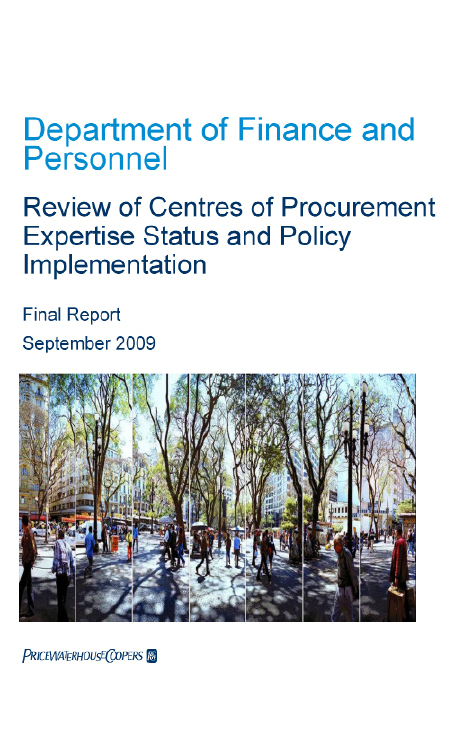


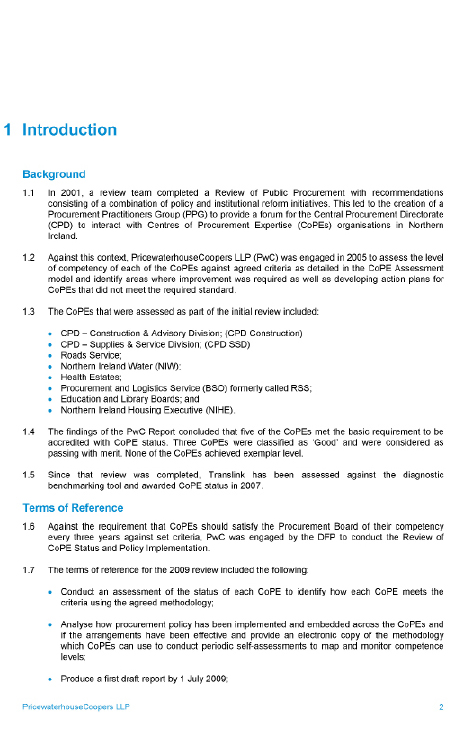

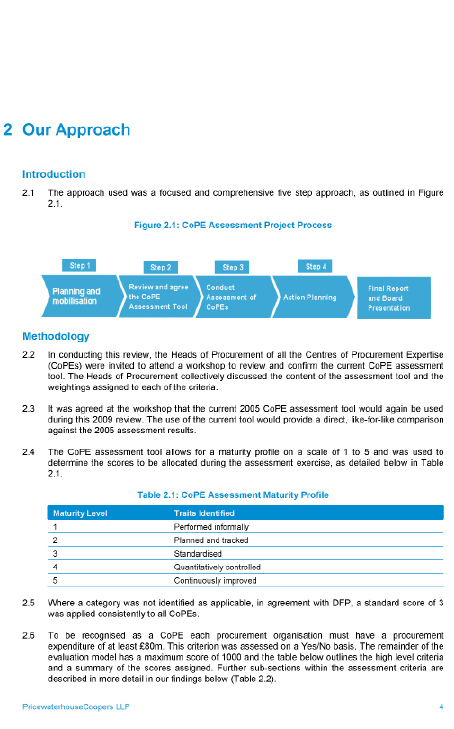
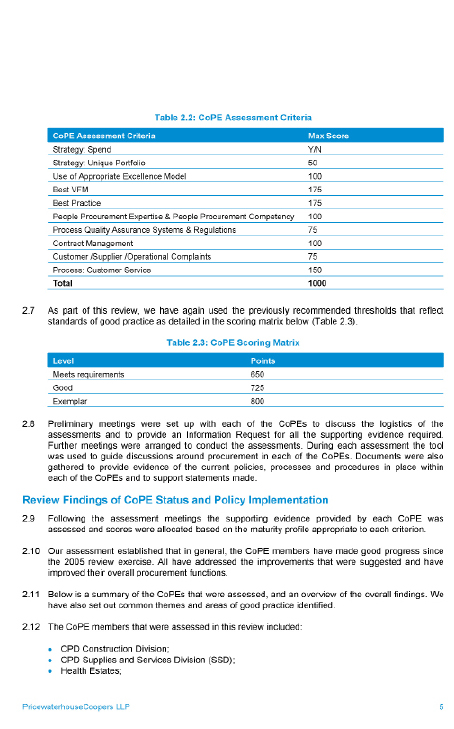

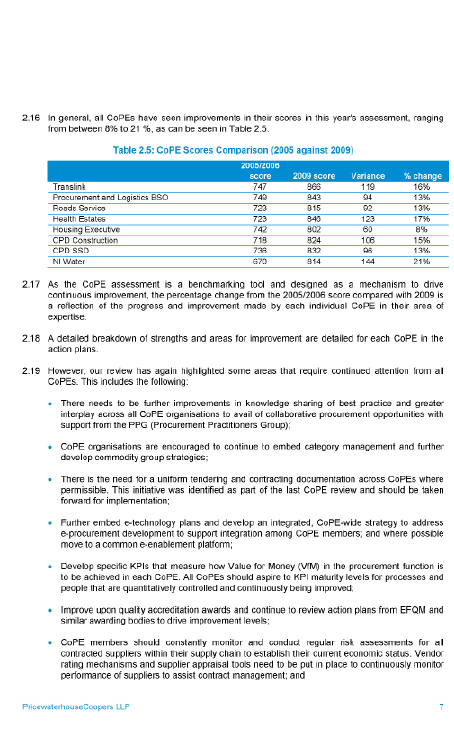
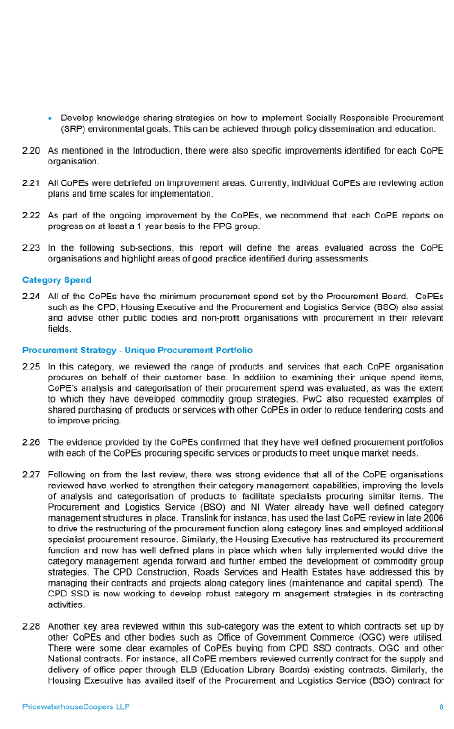
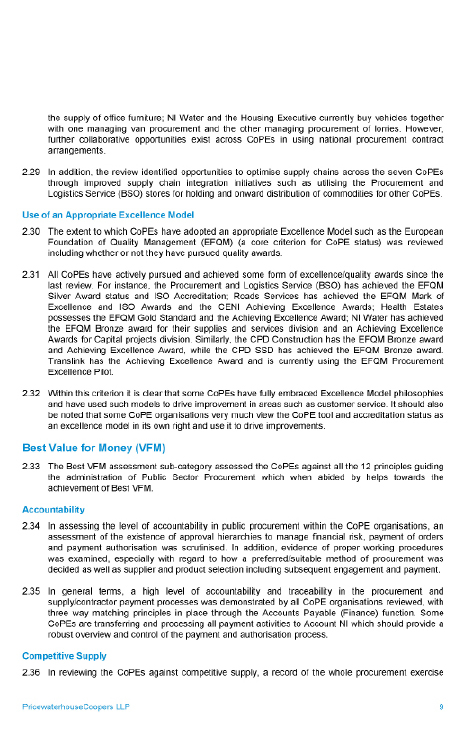
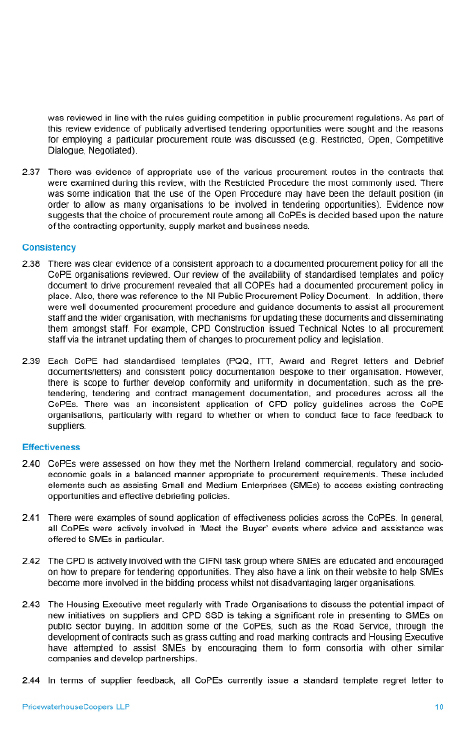
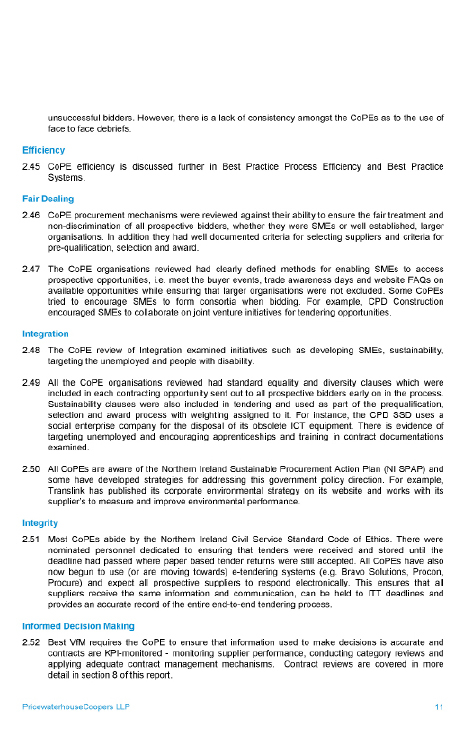
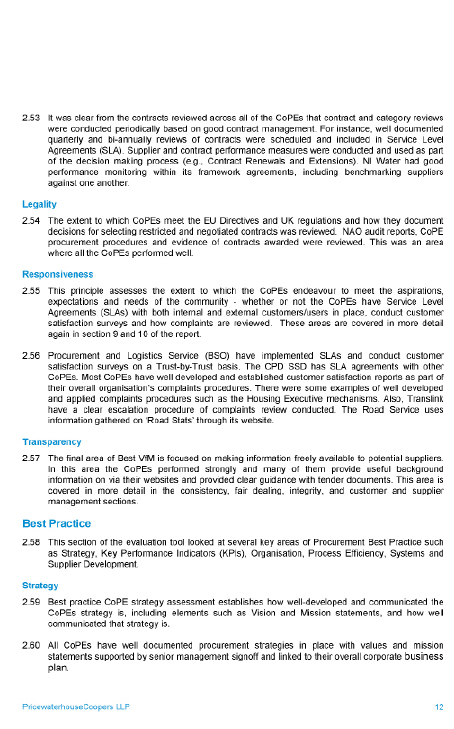
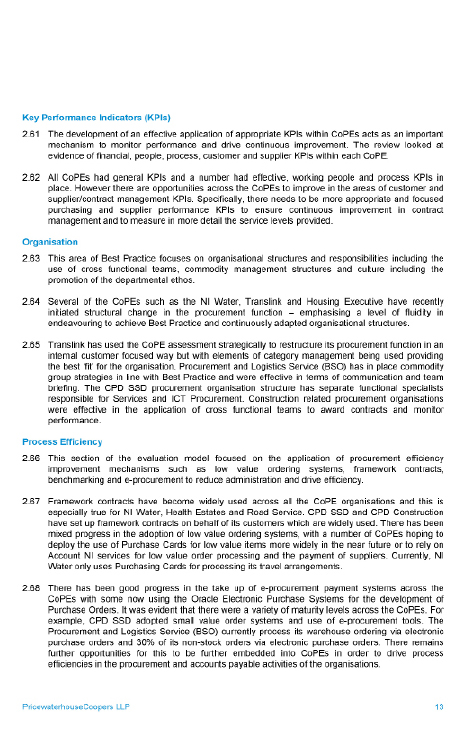
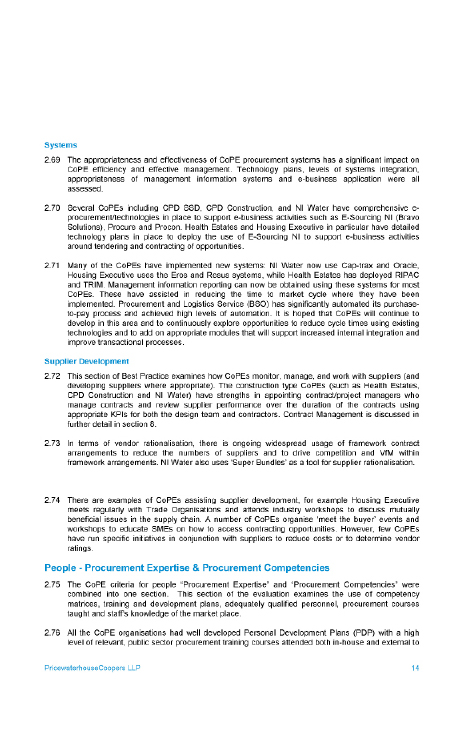
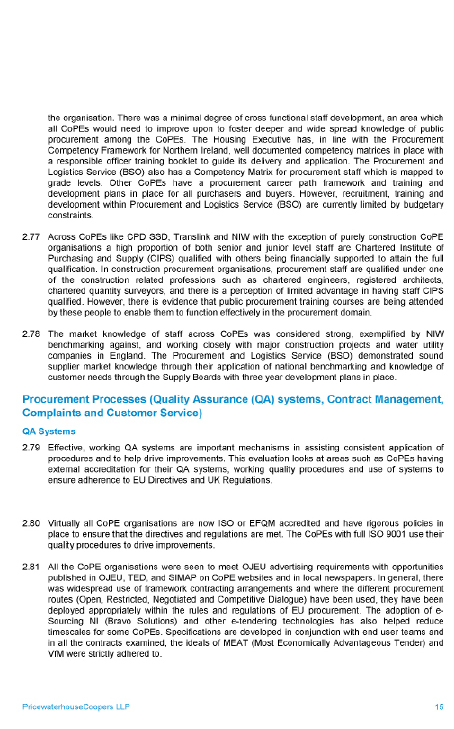
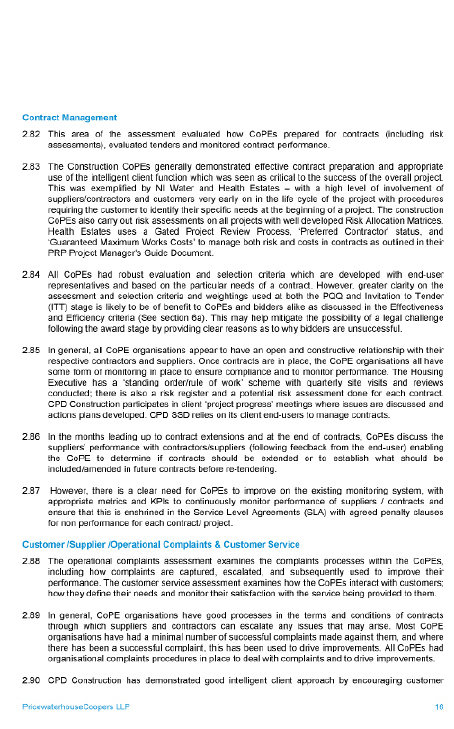
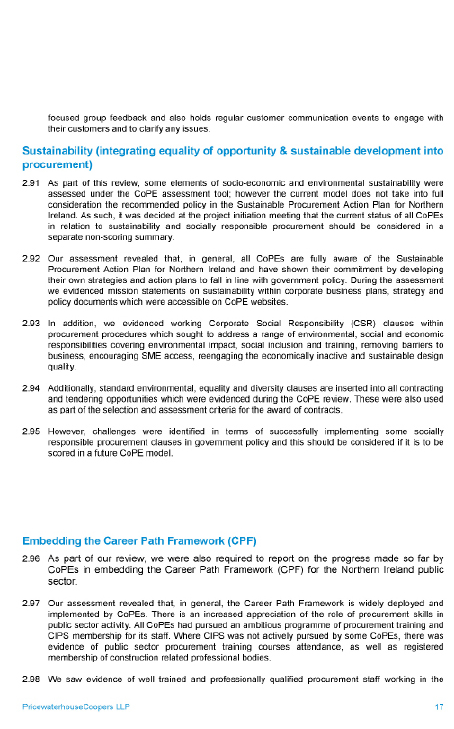

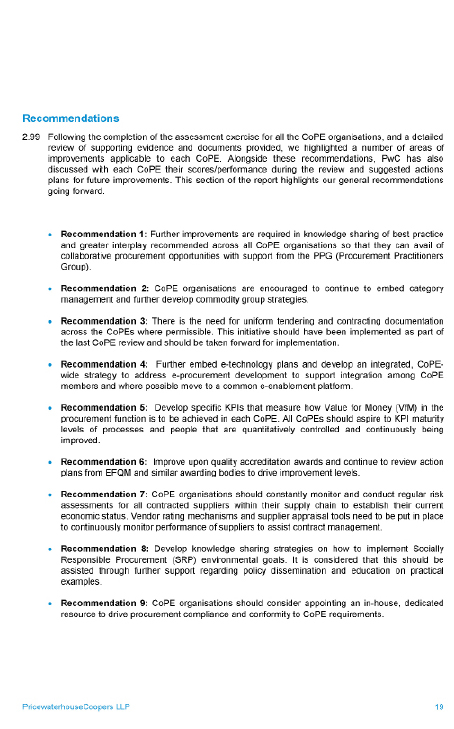

Central Procurement Directorate
Response to follow up issues
Assembly Section
Craigantlet Buildings
Stormont
BT4 3SX
Tel No: 02890 529147
Fax No: 02890 529148
Email: Norman.Irwin@dfpni.gov.uk
Mr Shane McAteer
Clerk
Committee for Finance and Personnel
Room 419
Parliament Buildings
Stormont
11 December 2009
Dear Shane
At its meeting on 25 November 2009, the Committee requested Central Procurement Directorate to reply in writing to further questions arising from the evidence session, but which could not be covered in the time available. The response to these questions is set out below.
1a What consideration does CPD give to other options for procurement rather than direct contracts? For example, how often would an option like Grant in Aid be used? Does CPD provide advice to other CoPEs in this regard?
Northern Ireland Public Procurement Policy defines public procurement as “the process of the acquisition, usually by means of a contractual arrangement after public competition, of goods, services, works and other supplies by the public sector". This definition plus the Public Contracts Regulations 2006 and the overarching EU Directives firmly establish the regulatory framework for public procurement in NI.
The Review of Procurement, carried out in 2002, acknowledged the complex relationship between grants and procurement and after consideration decided not to include grant-giving within the scope of the definition attached to procurement. However, the Review Team concluded that many of the principles suggested for procurement, in appropriate circumstances, could be equally applicable to grant giving.
As a result, the Review Team recommended that the Procurement Board consider the implications of procurement for grant-giving within the first 2 years of its operations. This was done and the result was the production of guidance on “The Use of Grant for Procurement". This guidance provided advice to Departments to enable them to obtain assurance that the use of grant for procurement is in compliance with public procurement law and policy. The guidance can be found at http://www.cpdni.gov.uk/gn01-07-the_use_of_grant_for_procurement_v_2.pdf
The question of whether Departments should acquire services directly through a procurement competition or via a third party through the provision of grant-in-aid is a matter for Departments.
1b What consideration has been given to breaking larger contracts into lots to allow access to a greater range of SMEs
Construction works and services contracts
CPD has considered splitting larger contracts and framework agreements into lots to increase opportunities for SMEs to bid for work. For example, it is currently establishing new framework agreements for civil engineering works valued up to £400k per order. The total value of the work to be procured over 4 years is estimated to be in the region of £45m and, rather than have a single framework, a total of 5 geographically based frameworks are being established, each valued between £7m and £12m.
However, there can be significant extra costs to a client in awarding multiple contracts or frameworks. There is the additional administrative cost of running several procurement competitions and then managing multiple contracts with different contractors. The economies of scale may also be reduced. It should be noted that larger firms cannot be prevented from tendering for all of the lots and therefore there is no guarantee that SMEs will be successful.
Creating opportunities for SMEs was also considered by the Construction Industry Forum for NI Procurement Task Group and a number of its recommendations are aimed specifically at that sector. These include:
a) Encouraging SMEs to come together as consortia to bid for work;
b) Requiring main contractors to advertise sub-contracting opportunities;
c) Setting proportionate financial thresholds that do not unreasonably exclude SMEs; and
d) Requiring relevant experience – not necessarily gained on government contracts - to be taken into account when drawing up tender shortlists.
The procurement of the Integrated Consultant Team Framework Agreement for construction related professional services, recently concluded by CPD, demonstrates how these recommendations can work in practice. Following extensive consultation with the local construction industry, the procurement was structured in a way that maximised the opportunities for smaller consultant practices. The framework agreement comprises 7 multi-disciplinary professional teams providing a range of construction related services. Of the 7 teams, 4 are led by locally based SMEs and 2 by national practices with established offices in Northern Ireland. Of the 37 consultant firms that form the 7 teams, 22 are locally based SMEs and 6 are national practices with established offices in Northern Ireland.
Supplies and services contracts
Where appropriate, CPD procurement competitions have allowed local SMEs to bid for part or all of the requirements. Tenders can be split geographically into schedules or lots which allow for businesses, who would not have the capacity or capability to tender for all the work, to bid for part of these requirements.
A good example is in relation to security and cleaning contracts. The approach taken was to schedule government buildings into small lots linked to geographical areas. This was to encourage local companies to compete. It has to be recognised however that these types of strategies can increase transaction and management costs and therefore need to be considered on a sector by sector basis.
1c How common is it for contractors to follow up compliant bids with variant bids? What would be the advantages and disadvantages of this approach?
The call for variant bids is at the discretion of the Contracting Authority. In addition, variant bids are only applicable when the Contracting Authority intends to award a contract on the basis of the most economically advantageous tender (MEAT). Variant bids are not lawful when awards are made on the basis of lowest price.
Construction works and services contracts
Submitting a variant bid puts a contractor to considerable extra expense, since an alternative solution has also to be developed and costed. As the drive has been to reduce bidding costs by, for example, developing exemplar designs, CPD does not call for variant bids for its construction contracts.
Supplies and services contracts
The application of a variant bid in the procurement of supplies and services is not a common practice. However, it has been used where we wish to encourage innovation and sustainability within procurement competitions. A good example of this is the forthcoming office supplies contract where we are keen to promote and develop within the market innovative and sustainable procurement solutions.
2 Can you outline the relationship between commissioners and purchasers and where responsibilities lie, for example, in relation to defining and applying social value/clauses to contracts?
In this context “commissioners" could be defined as Departments, Agencies, NDPBs and Public Corporations, i.e. most bodies covered by the Northern Ireland Public Procurement Policy. “Purchasers" can be defined as CoPEs, since it is a requirement of the policy that procurement is undertaken by means of an SLA with CPD or a CoPE.
Public Procurement Policy established 12 guiding principles. The policy document outlines the implications of the principles in relation to both purchasers and commissioners. These roles and expectations will be further clarified in the Northern Ireland Public Procurement Handbook currently being developed by CPD.
Commissioners have a statutory duty to act in a way they consider best calculated to contribute to the achievement of sustainable development, including the delivery of social objectives. CoPEs assist commissioners to interpret this duty and define practical applications that can be lawfully included in contracts.
Yours sincerely,

NORMAN IRWIN
DFP - Reply Letter relating to the
Impact of the Executive’s Advertising Policy
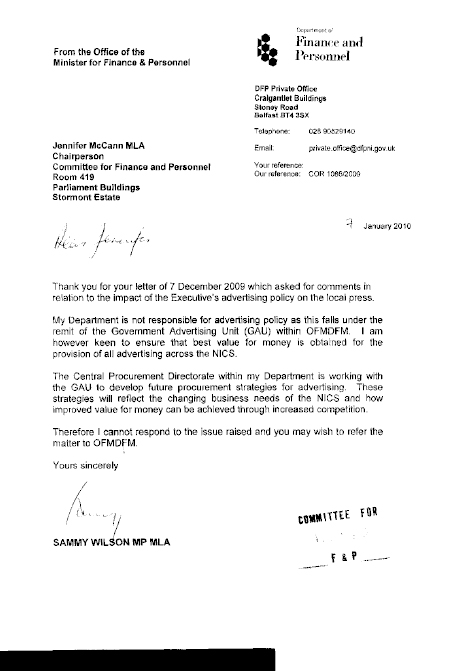
DFP - Procurement Governance Review
Assembly Section
Craigantlet Buildings![]()
Stormont
BT4 3SX
Tel No: 02890 529147
Fax No: 02890 529148
email: Norman.Irwin@dfpni.gov.uk
Mr Shane McAteer
Clerk
Committee for Finance and Personnel
Room 419
Parliament Buildings
Stormont
15 January 2010
Dear Shane
Procurement Governance Review
I refer to your letter of 11 December 2009 attaching correspondence received from the Citizen’s Advice Bureau regarding a procurement exercise for face to face debt advice.
I can confirm that Central Procurement Directorate (CPD) provided DETI with advice and guidance on the procurement process for face to face debt advice. This included advice on the specification of services to ensure that it was compliant with relevant procurement legislation and policy, and advice on the procurement strategy to ensure that it encouraged competitive supply. It also managed the tendering process and ensured that the evaluation of tenders was carried out in accordance with the published criteria and weightings and that the criteria were compliant with relevant legislation and case law.
The reference to ‘good governance review’ related to the contract management phase of the procurement process. This process involves monitoring the service delivery to ensure that services are provided in accordance with the specification (including targets/outputs and key performance indicators), the terms of the contract and the accepted tender offer. This is not a new a procedure as the NI public procurement policy requires that all contracts are monitored to ensure that best value for money is achieved and contractual obligations are satisfied.
CPD understands that as part of this Contract management process DETI carried out a number of checks with the successful Tenderer immediately after the contract award including matters brought to its attention in the course of recent legal proceedings and that those enquiries have been completed to its satisfaction.
Apologies for not making the response date.
Yours sincerely,

NORMAN IRWIN

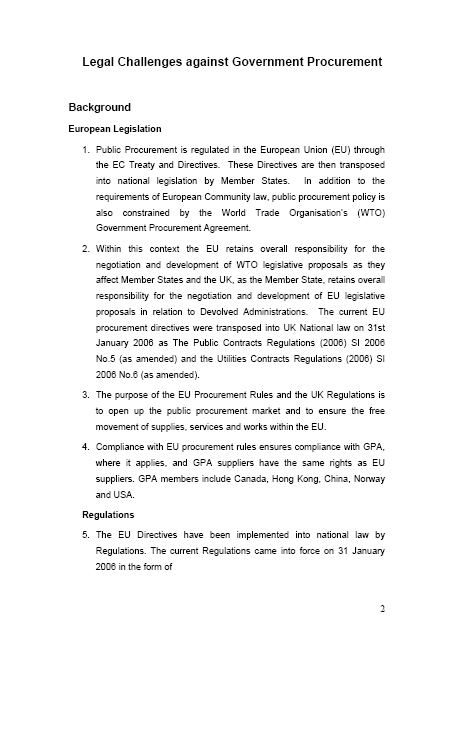
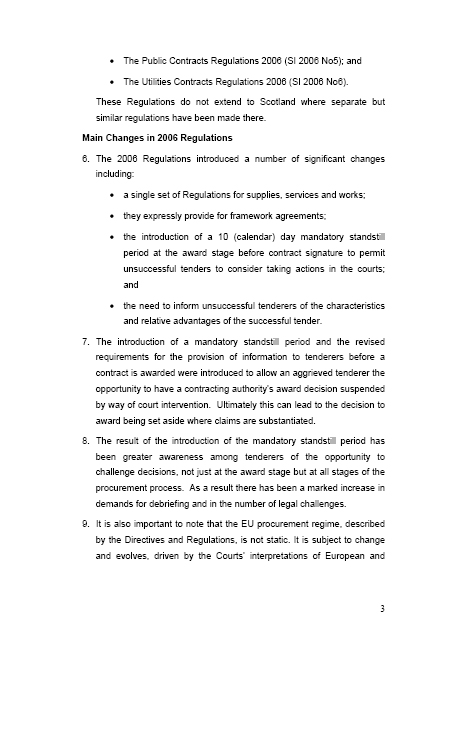
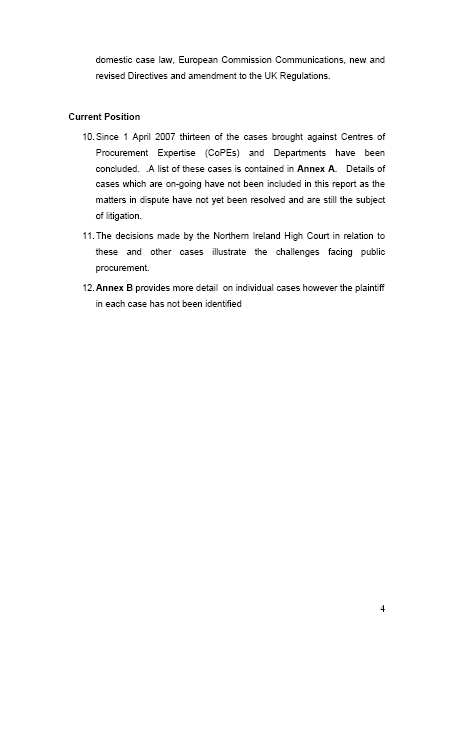
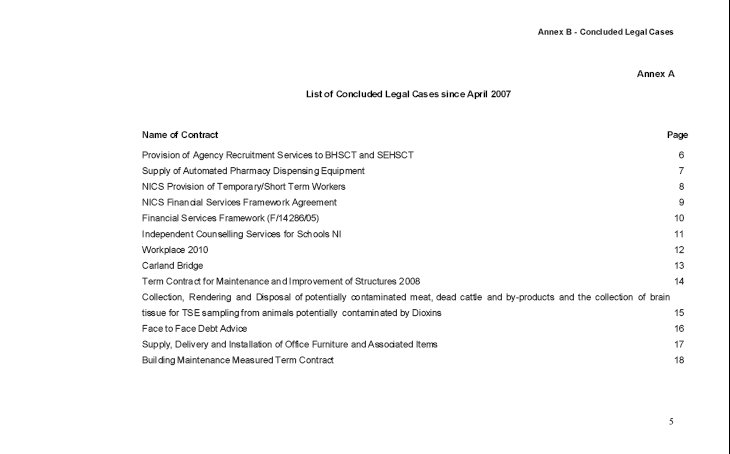
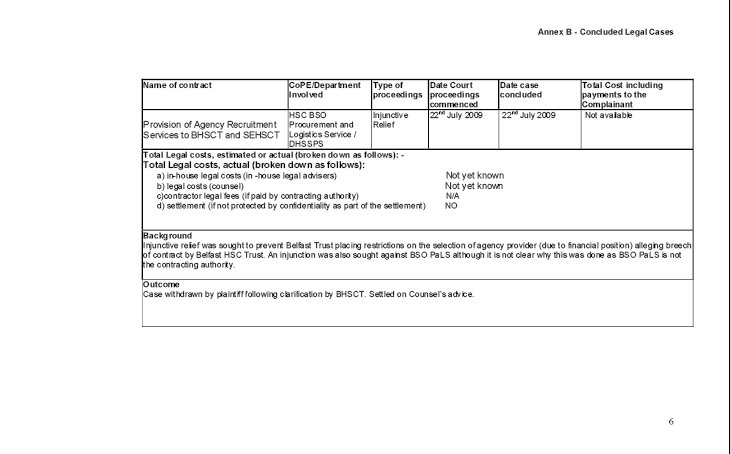
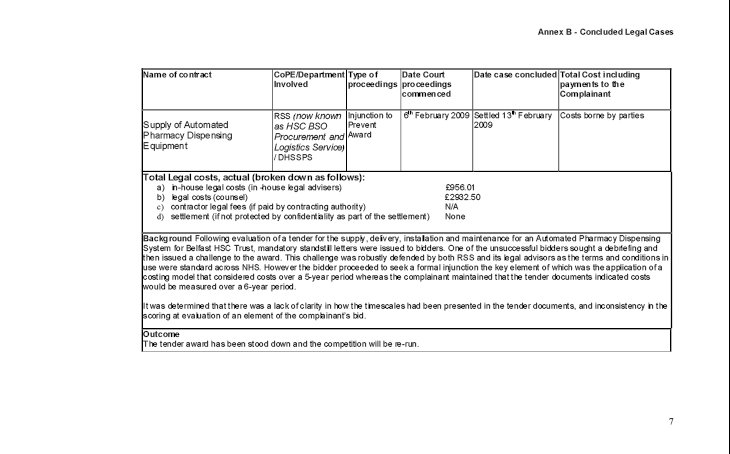
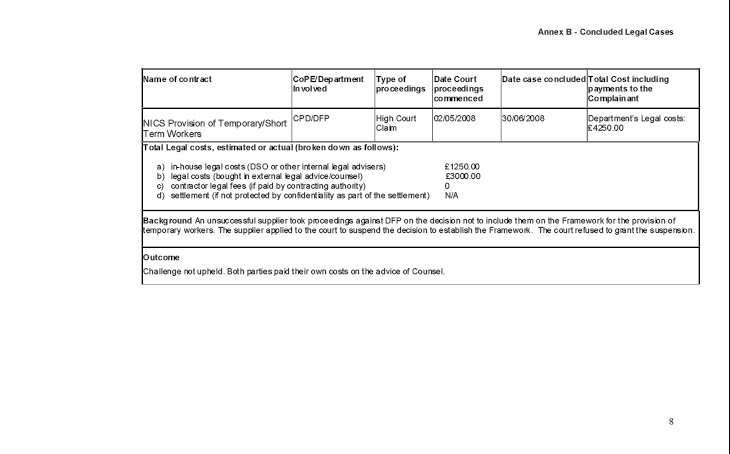
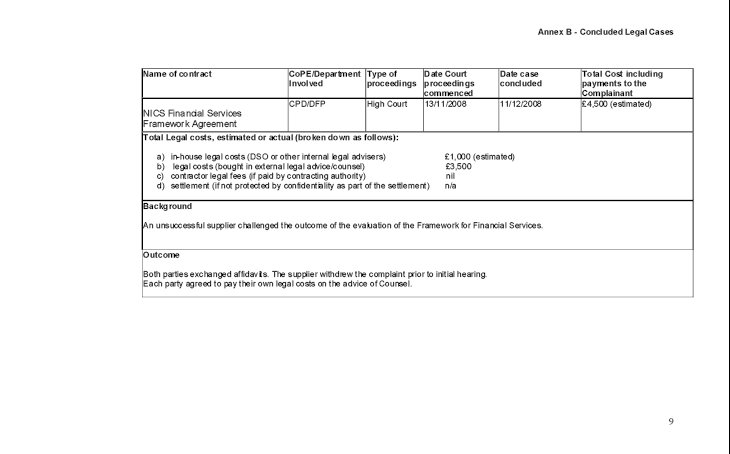
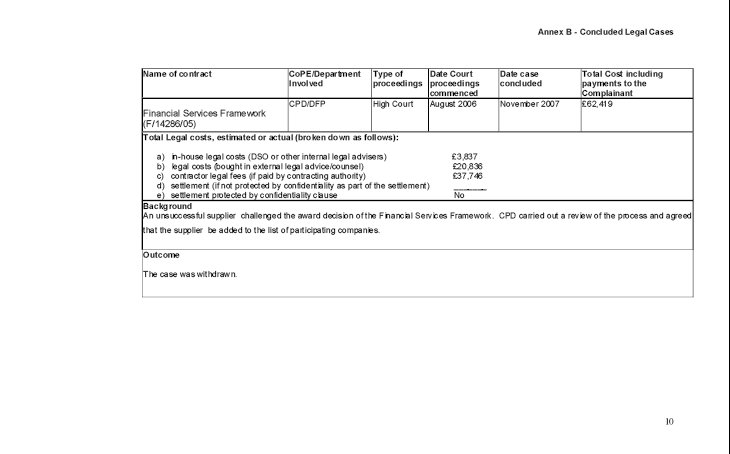
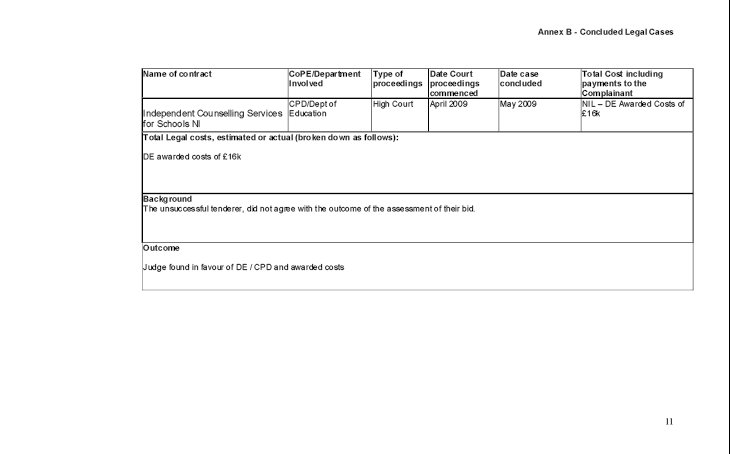
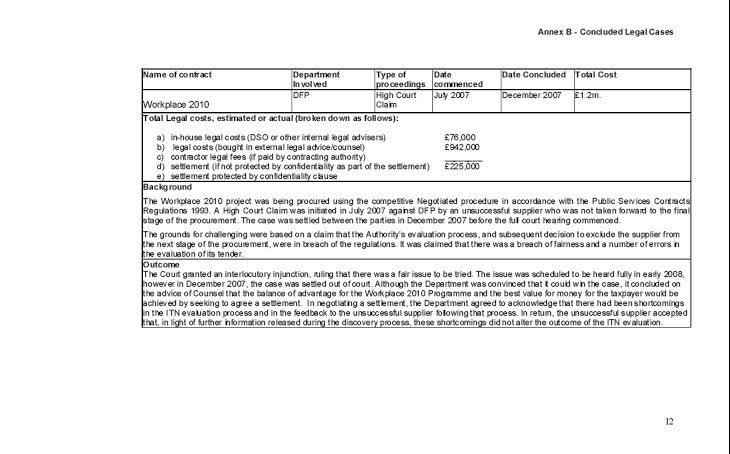
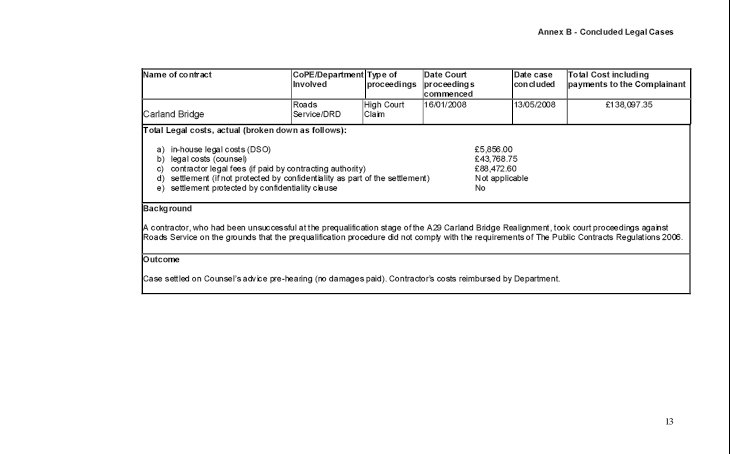
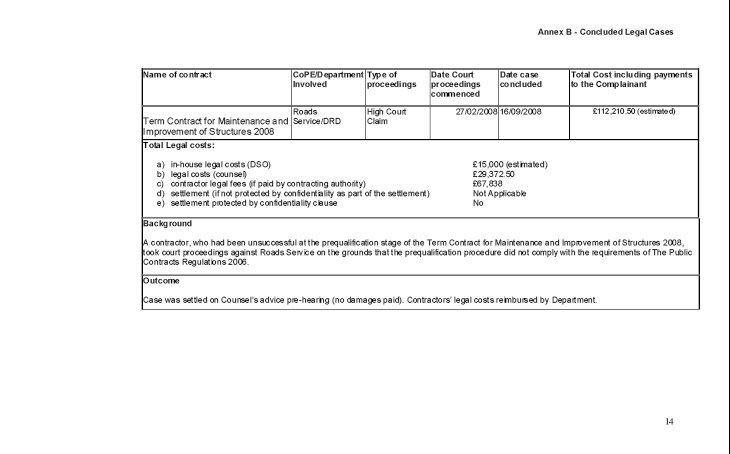
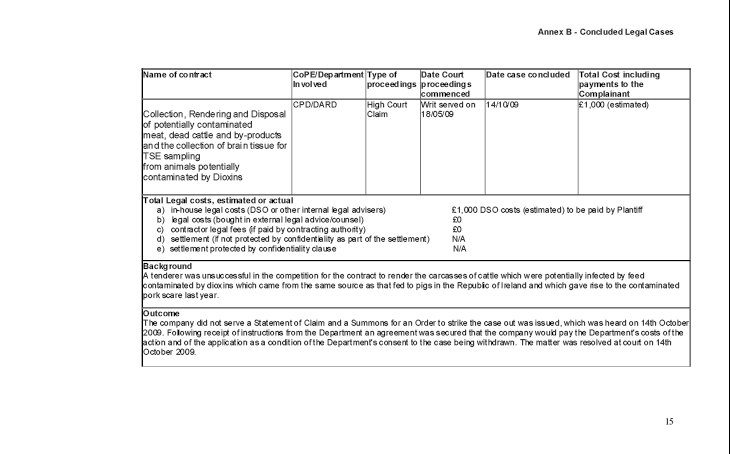
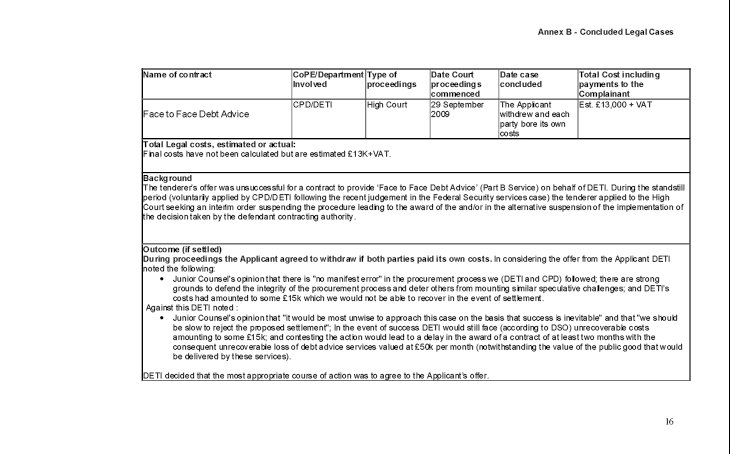
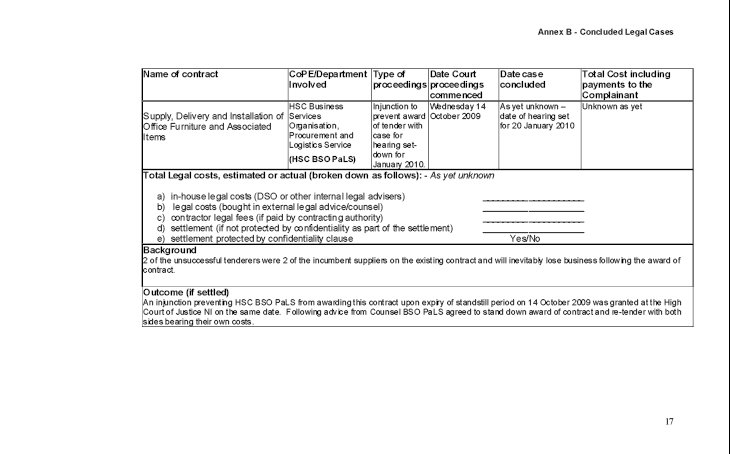
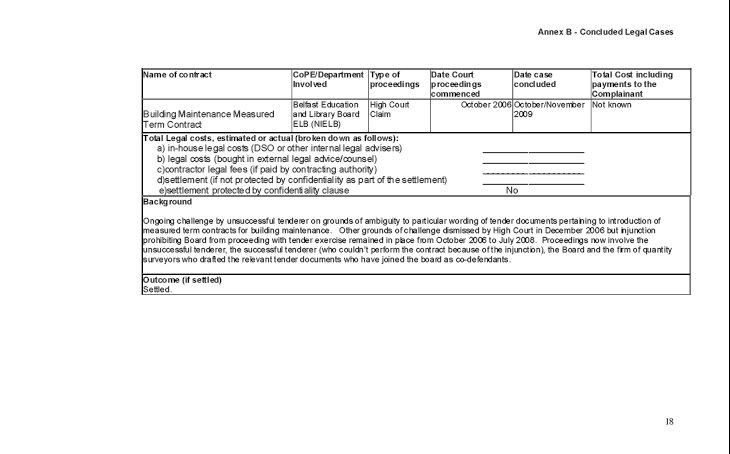
Next Section
